
Traveling Without a Passport


A Female Traveler’s Guide to Saudi Arabia

In November 2021, I accepted an invitation by the Saudi Tourism Authority to visit the widely unknown Kingdom of Saudi Arabia (KSA). Although the reactions from my colleagues and friends varied (some were skeptical whereas others were simply excited for me), we all shared one thing: none of us knew exactly what to expect. On top of this, the coronavirus pandemic was far from over. But after my third dose, and additional testing precautions, I was ready to board the plane and start this adventure.
Although the times are changing, there are still many misunderstandings and questions about Saudi Arabia. I hope my personal travel experience will shed some light on this lesser-known Middle Eastern country and serve as a guide for female travelers wanting to visit Saudi Arabia.
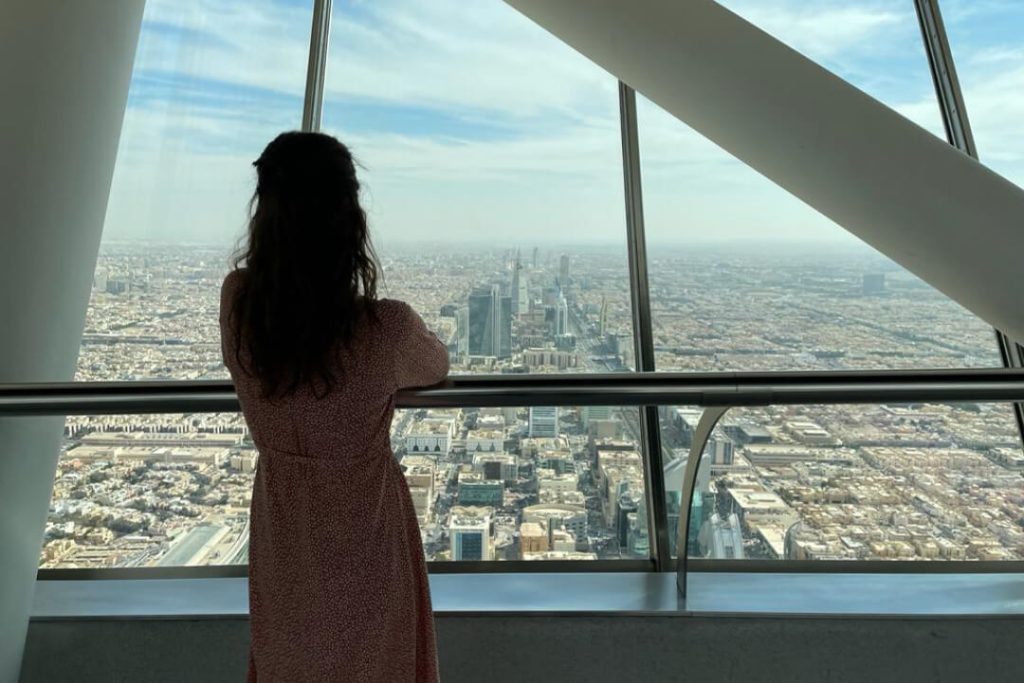
Here’s everything you need to know:
- Solo travel vs group tours
Arriving in Saudi Arabia
Etiquette and customs, hotel facilities, beyond hummus: food & dining, beautiful landscapes, solo travel vs group tours .
Some people have strong opinions on whether group or solo travel is better, but there is no winner. In fact, this decision strongly depends on preference as well as the travel destination itself.
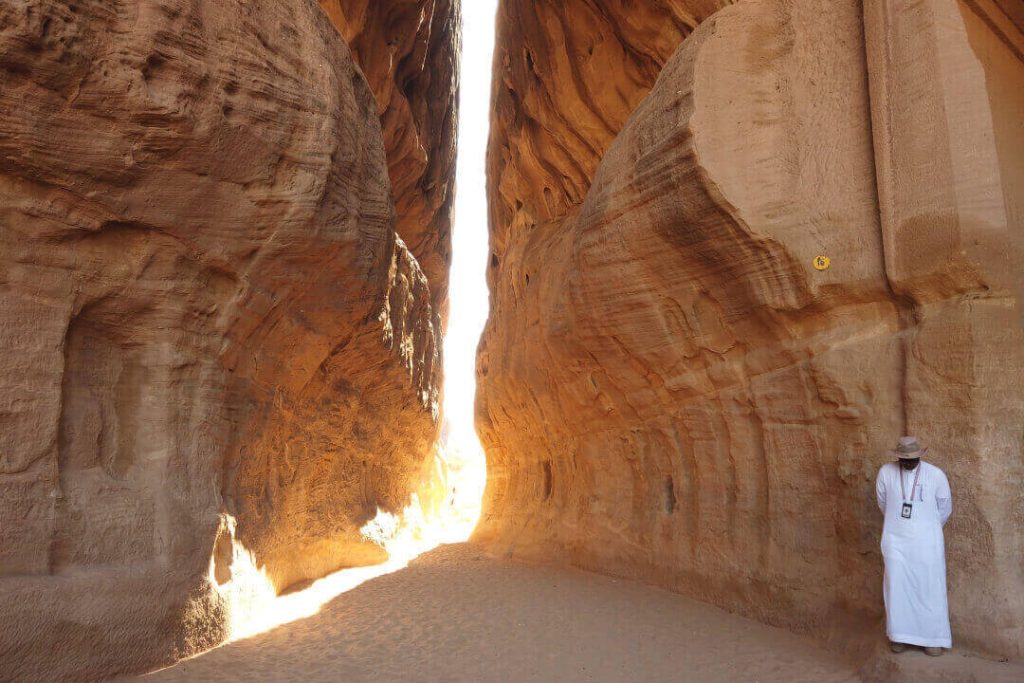
Personally, I enjoy exploring destinations by myself and feel that solo travel is a wonderful experience full of surprises. However, I also believe that traveling to an unknown destination like Saudi Arabia can be an adventure in itself. So this time around, I was happy to get to travel as part of a group.
For me, one of the biggest advantages was the added safety and peace of mind that came from having wonderful tour guides. Not only were they around at all times to answer questions, but they were very familiar with the places we visited and could offer expert knowledge and tips. This made me feel completely safe and relaxed.
The second (but no less important) reason why I wanted to travel in a group was that you get to connect with new people from different backgrounds. You learn about their lives and get to experience a foreign culture and country with them. Without even talking about it, you all know that you’re on this incredible adventure, together. It’s a wonderful feeling. And in a blink of an eye, strong friendships are born. Though it may feel like you’ve known each other for years, in reality, it’s only been a few days!
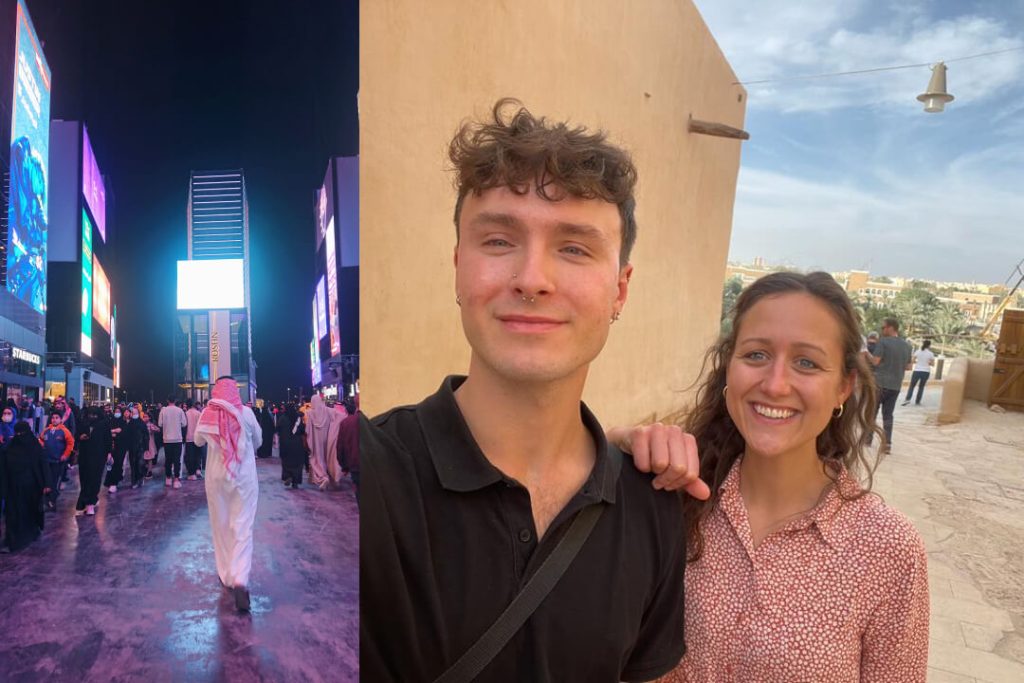
See Also: Group Tours Vs Solo Travel: Which Travel Style is For You?
Saudi Arabia was formerly closed as a travel destination for foreigners and only recently launched an international tourist visa in September 2019. Although it had to stop issuing visas due to the pandemic, the KSA finally reopened again in August 2021. Tourists from 49 countries are now eligible to apply online for a tourist visa. In fact, the country is focused on growing the tourism sector and has been making major changes and investments to help reach this goal.
One of the questions I heard a lot was whether a woman could apply for a visa to Saudi Arabia. The answer is yes. Women can even travel solo to Saudi Arabia. However, it is important to bear in mind that there is still a broad gender separation throughout the Saudi Arabian society that will influence and determine your travel. For example, there are separate lines for women and children at the airport security checkpoints, and only female security guards are allowed to check the women.
See Also: Saudi Arabia Travel Guide
Just as you would do before any international trip, check the validity of your passport and ensure you’ve obtained all the necessary tourist visas. Nowadays, it’s also important to stay informed on the current health advisories and travel warnings. However, what you may not know is that reading about cultural etiquette can be relevant as well. So, before your flight to Saudi Arabia, I recommend doing some research. This is equally important for men and women.
Because the Middle East has many rules and traditions, being aware of the cultural norms will not only protect you from awkward situations but will save you from serious trouble. For example, any violation of public decency in the KSA can result in penalties. This includes taking pictures or videos of people without their permission. Another thing to keep in mind is the traditional dress code.
I did not have to wear an abaya.
Although I read it’s no longer compulsory for women to wear an abaya (the traditional dress), I planned to buy one upon arrival. However, once in Saudi Arabia, I realized this wasn’t necessary. So instead, I wore modest clothing: long, loose skirts and tops that covered my arms and chest.
While locals stared at us (some more discreetly than others), everyone was exceptionally friendly. They were just curious about tourists since they rarely see one. So, don’t get scared by the attention. Instead, prepare yourself for people wanting to take a photo with you. With this said, if you’d prefer to be less noticed, then stick with your group or wear an abaya .
My personal advice: dress conservatively. Make sure you show as little skin as possible and don’t wear anything too tight or form-fitting. If you’d like an example, see what I’m wearing in the picture below.
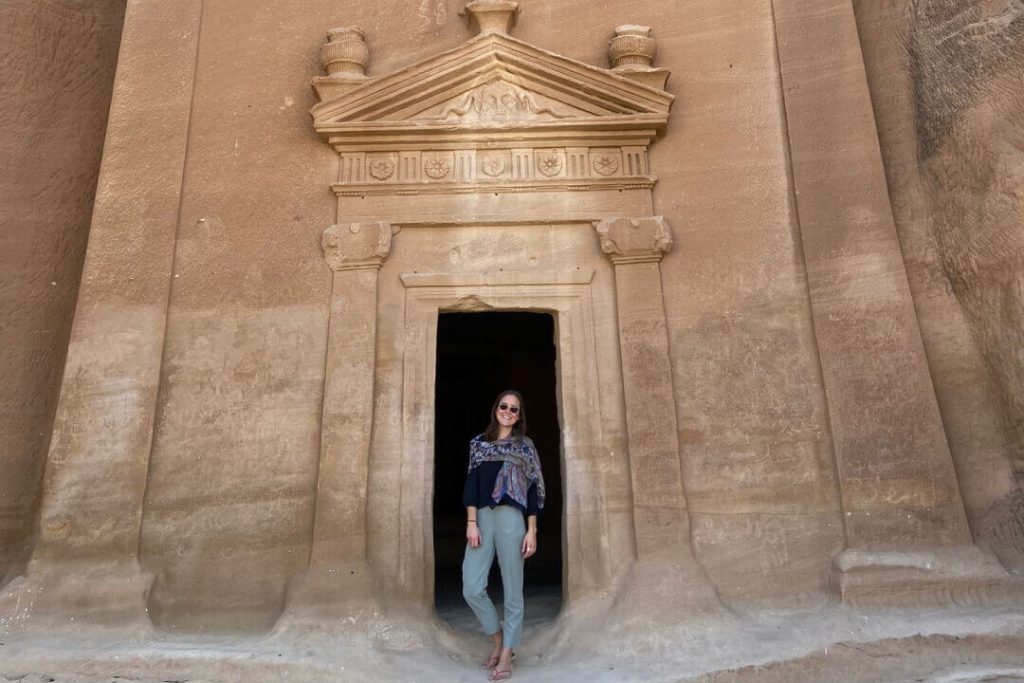
Depending on the size of the hotel and its particular standards, there may be different regulations when it comes to using the gym, spa, or swimming pool. For example, some hotels have separate gyms (one for women and one for men). At other smaller hotels, there may be certain hours set aside for when women can enjoy the gym. The same goes for the pools and spas. However, some hotels may only allow men to use the swimming pools. So, if you are planning to use any of these facilities, make sure you look into all of these points before booking your accommodation.
Because gender segregation in restaurants and cafes is no longer required by law, everywhere I ate during my trip had one entrance and one dining area for both men and women. Terrific, right? Now let’s focus on the incredible cuisine!
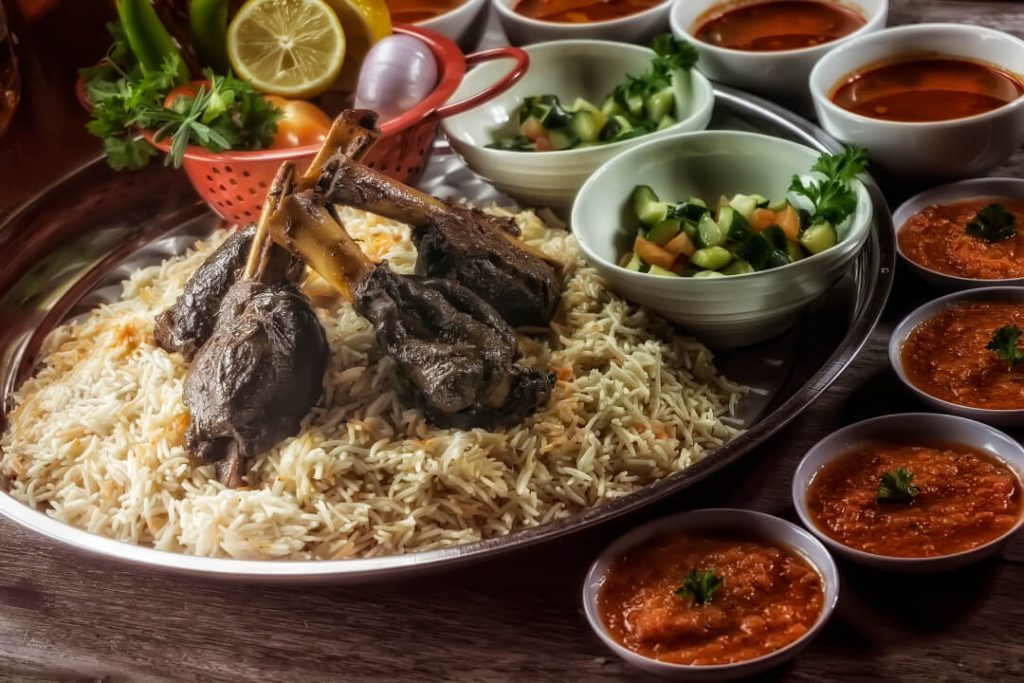
From your very first meal in Saudi Arabia, you’ll quickly see that food plays an important role in the culture. Traditional dishes are wholesome and hearty – often served on massive platters for the whole table to share. And the best part is that the cuisine varies from one city to another. Along the coast, you’ll get fresh seafood like shellfish and shrimp. In other parts of the country, you’ll eat piles of steaming rice crowned with roasted chicken, lamb, or even camel.
Another central part of the Saudi Arabian culture is Arabic coffee. In fact, it’s used as a sign of hospitality to welcome guests. The coffee is mixed with spices like cloves and cardamom and is often served alongside fresh dates or other sweets. No matter what time it is or where you go in the country, you’ll always find coffee.
See Also: Around The World: The Ultimate Food Bucket List
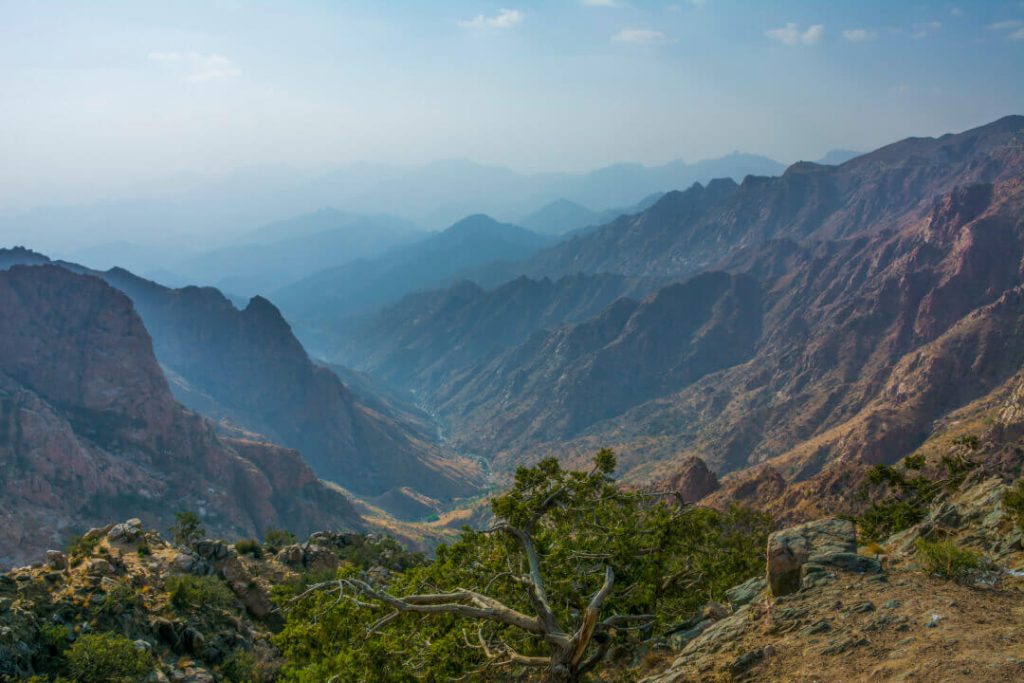
When you think of Saudi Arabia, you may picture an arid sand desert – and you would be right. However, with a size of over 2.15 million square kilometers, this vast country offers a broad variety of landscapes from deserts and mountain ranges to beautiful beaches and untouched islands. In fact, the KSA has a coastline along both the Red Sea and the Persian Gulf which offers beach adventures year-round. From water activities and white sand beaches to national parks and coastal historic towns, Saudi Arabia has it all.
Visiting Saudi Arabia in late November turned out to be the perfect time of year to experience this fascinating country. During the day, the temperatures reached up to around 85°F and the evenings were mild. If you also plan to take advantage of the KSA’s particularly pleasant weather from mid-September to mid-December, just remember to bring a sweater for the evenings (and also for all the air-conditioned buildings).
All in all, Saudi Arabia was nothing like I expected. From the most hospitable people to delicious traditional food and breathtaking landscapes, I quickly realized that this country is incredibly diverse and has plenty to offer. Just keep in mind that a trip to the KSA requires a bit more preparation and, once there, you must follow certain rules – but it can be one of the most rewarding experiences you’ll ever have. Yalla!
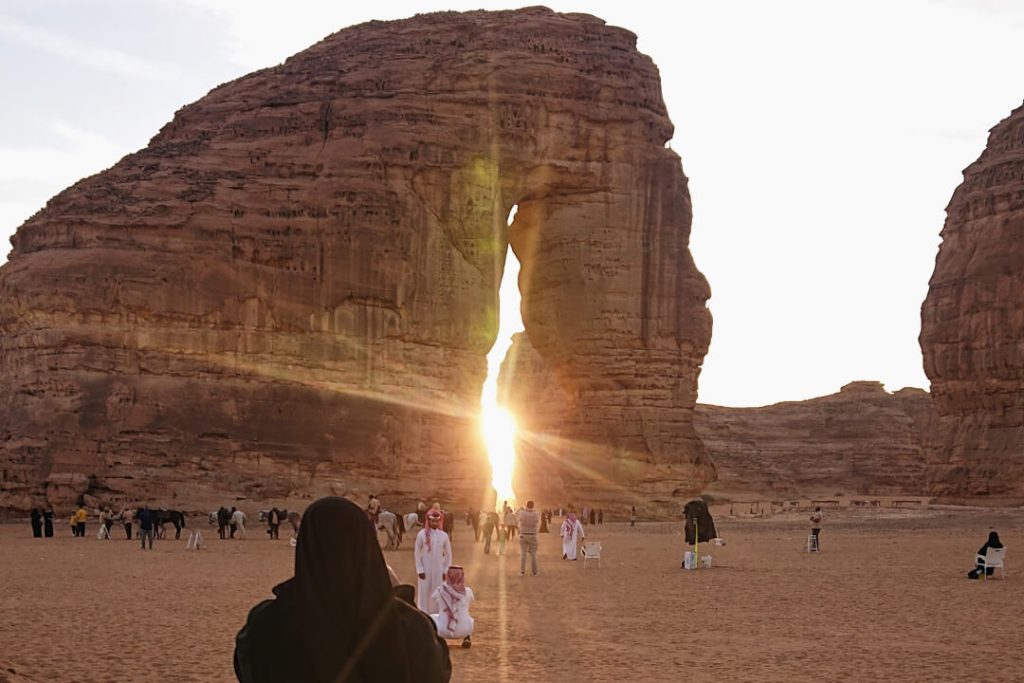
Ready to explore the land of a thousand and one adventures? Head over to TourRadar and start planning your Saudi Arabia trip today!
This article was written by Marie Weindlmayr (based on her experiences in Saudi Arabia) and edited by Stephanie Fuchs.

Marie Weindlmayr
Based in Vienna (Austria), Marie is Digital Marketing Manager at TourRadar. When she is not travelling, you can find her cooking, gardening or exploring Vienna and its surrounding areas by bike.
Related Articles
- Tips & Tricks
- United Kingdom
Visit These Gloomy Destinations for a Great Time
Enough about sun-drenched beaches and clear blue skies. It’s time you...
- Destinations
Top Countries You Haven’t Been (Yet!)
Ever felt like you're being fed the same destination over and...
- Central America
Is Costa Rica Safe to Visit Right Now?
Costa Rica, known for its stunning beaches, lush rainforests, and abundant...
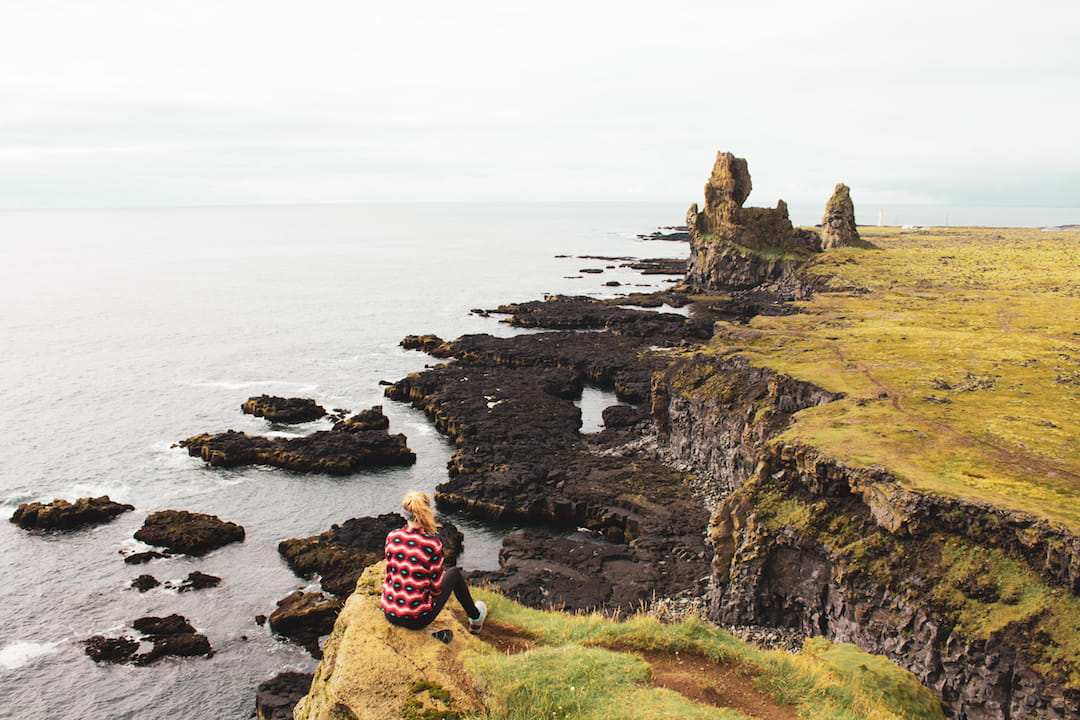
The 10 Best Day Hikes from Reykjavik
Get unlimited access to the world's best travel stories. subscribe now., privacy overview.
9 Misconceptions about traveling to Saudi Arabia as a woman
By Joan Torres 28 Comments Last updated on April 8, 2024

In the last few years, I have been traveling extensively across the Middle East and other Muslim countries, so it is not surprising at all that, every week, I receive tons of requests and questions from kick-ass women who wish to travel to the same places.
Since I am a man, all my articles tend to be kind of male-oriented, not on purpose though, but it is just that, sometimes, I forget that the experience for women may be totally different.
When I was posting all the photos and videos from my visit to Saudi Arabia on my Instagram Stories , people were actually amazed at all the places I visited and the people I met, as they were so many miles away from all the stereotypes the media has been showing us during the last decade.
Those images really triggered the interest of many travelers who would have never thought of going there, and that included many women as well.
However, since Saudi is known for being an extremely patriarchal country, I received more questions than I had ever received before, some of them asking about safety, while others if it was even possible to go travel to Saudi Arabia as a woman alone.
As always, I can’t give an accurate response about solo female traveling but, luckily, during my journey, I met Nada from Nadal Al Nahdi , a 20-something-year-old backpacker who has traveled solo to some very cool destinations such as Pakistan , Afghanistan, Oman and Sudan , and the coolest thing about her is that she is half-Yemeni, half-Indonesian.
Nada actually grew up in Jeddah, Saudi Arabia, so she knows the people and culture very well and has traveled around the country extensively, so who could be better than her to explain about solo female travel in Saudi Arabia?
In this article, Nada takes us through the 9 misconceptions about traveling to Saudi Arabia as a woman.

Here are some common misconceptions about solo female travel in Saudi Arabia.
1 – As a female, I need a guardian to travel to Saudi and around Saudi.
Remember to get travel insurance for Saudi Arabia Saudi Arabia’s health care is extremely expensive, so insurance is a must. IATI Insurance offers different plans, for all budgets. Get your 5% exclusive discount if purchasing via this link
No. No. No.
This common misconception needs to be eradicated as soon as possible.
Women can travel to Saudi Arabia alone. I travel around independently all the time and, definitely, without a guardian.
The ‘guardian thing’ is more of a cultural thing, not the law. What I mean is that, in general, Arabs treat females as queens, something I am not complaining about, but the concept of females being independent is not something they can comprehend.
I am not saying they are close minded but it is a scene they are not used to. However, as things are opening up and changing, this is starting to slowly wear out.
I’m going to share an incident that happened to me on 4 th January 2019.
I needed to travel from Jeddah to Riyadh . The flights were ridiculously expensive, and I missed the bus, so I went outside the bus station to hop in any of the carpooling services which are called “Kadad”. I got in one, slept comfortably throughout the journey until we reached the checkpoint to enter Riyadh .
The police asked us to pull over, took our IDs and asked standard procedure questions.
Keep in mind that I was the ONLY female in a car of 7 men; the driver and 6 male passengers.
Three policemen came to me one by one, asking where my guardian was and how could I travel without one.
I simply answered: I do not need a guardian and I can travel around without a guardian .
The police insisted that was an issue, so they wanted to hand me in and report me.
I said: What are you going to report me for? I did not do anything .
He was stunned and said that they would explain the procedure at the station.
I was NOT ONE BIT scared because I knew my rights and that that was not the law. This is just the culture he has in his house.
Long story short, the higher rank guy came out and instructed the policemen who were questioning us to let us go as long as our documents were legal.
There you have it, a proven and real-life situation with the man of the law that females do not need a guardian.
You may also be interested in: Is it ethical to visit Saudi Arabia as a tourist?

2 – I need to get a burqa aka ninja cover and a headscarf
I’m going to let photos speak for me.
Here’s a photo of me in Jeddah:

This is me in Al Ula:

And when traveling to remote areas and going for activities such as hiking, climbing, and camping, abayas are not needed at all.
Here’s a photo of me hiking at Wabah Crater :

And don’t forget to pack your bikinis! Yes, females can wear bikinis in Saudi when you are on a boat trip or at any of the private beaches. Private beaches can be accessed at a certain fee.

While in the city, all you need is decent and long outerwear. It can be of any color and pattern. We love colors, patterns and unique styles!
Don’t be surprised when strangers come up to you and ask “Where did you get the abaya from?!” I get that a lot too.
As for scarves and burqa, they are absolutely not required.
During the questioning I mentioned in point 1, the policemen asked me to cover my hair and, of course, I did not cover my hair because, one, it’s not the law, and two, I didn’t have a scarf anyway.
Sometimes, this happens on the streets when random religious men yell out at you and ask you to cover. The best thing to do is to just ignore them and continue doing your thing.
Again, this is a culture, not the law. Please don’t take it that if we don’t wear a scarf is disrespecting the culture. It’s a personal choice.
Read more stories from kick ass solo female women in offbeat destinations!
3 – I need to be covered to avoid harassment
Harassment is an unfortunate worldwide issue that is specific to the person, not the country or culture.
6 years ago, I faced harassments here and there. In recent years, I have not experienced any harassment.
The worst one I get these days is someone coming up to me and slowly whispering “Mumken Snapchat?” which means “Can I have your Snapchat?”
Simply say no and walk away and that’s the end of it.
Read: Places to visit in Saudi Arabia, a 15-day itinerary
4 – As a female, I cannot hang out or be seen with unrelated men.
This is again not true.
Whether it’s in the city or remote areas, unrelated men and women, basically, a group of mixed gender, can mingle and hang out whenever, and wherever.
Here’s a photo of my friends and me in Jeddah, along with a tourist/travel blogger @ morinasworld

and here in Jizan, mingling with locals while exploring the area.

5 – The Religious Police are everywhere and monitoring women
The religious police do not have any authority, hence they cannot act on anything without being accompanied by the officials. Moreover, I have not seen religious police in the last 2 years.
Skip all content and get ExpressVPN
Get unrestricted access with the fastest VPN for Saudi Arabia country.
6 – Women cannot rent a car
Yes, we can. I’ve rented cars in different cities in Saudi with absolutely no issues, as long as you have a valid driving license for those issued in Saudi/GCC and international driving license for others.
7 – It’s not safe to travel to Saudi Arabia as a solo female
In the first point, I mentioned that females are seen as queens and, therefore, must be protected and looked after.
The only thing you need to worry about is being fed way too much food and being introduced to all the family members, relatives, and neighbors, who will keep you for a never-ending conversation because they want to make sure you get the best hospitality.
Another potential danger might be being offered some camel milk.

8 – Saudi is not for everyone.
Actually, it’s quite the opposite. Saudi IS for EVERYONE.
Have you seen Saudi on the map?
It’s HUGE! It’s actually the fifth largest country in Asia.
From those who love to lounge by the sea to those looking for adventures, Saudi is for any kind of female traveler, really. Moreover, the culture in Saudi is so diverse that only 1:10 of my friends are purebred.
The traditions and cultures within the region itself are also very diverse. The northernmost part of the country has similarities to the Levant Arab countries, like Palestine and Jordan , while the southernmost part of the country resembles Yemen so much that it makes me feel like home!
Saudi Arabia has amazing historical sites such as Madinah Saleh, Rijal Almaa and many others.

Saudi Arabia is surrounded by the Red Sea, hence a perfect diving spot for divers, snorkelers or simply lounge by the beach or on a boat!
And, of course, the great desert landscape! Saudi Arabia got you covered with black, brown and red sand dunes! And there are much more than just the desert and the sea. There are many unexplored caves, unclimbed mountains, and stunning valleys!

9 – This is an exaggerated post and it’s not what it’s like in reality
Please have a look into these Instagram accounts based in Saudi that will also show you the reality of Saudi Arabia as a Saudi woman and a non-Saudi woman.
@ nadaalnahdi – Yemeni/Indonesian living in Saudi @ blueabaya – Finnish married to a Saudi and living in Saudi @ esraarayes – Saudi @ mearch_ – Saudi @ nirvana.abdul – Yemeni married to a Saudi @ saraomar_travels – Saudi @ mykindoffridays – Saudi @ redseacitizen – Saudi
If you have any more questions about traveling to Saudi as a woman, don’t hesitate to contact Nada through her blog .
You can also follow and contact her on Instagram and Facebook .
I also recommend reading these 2 articles from her:
What you didn’t know about Pakistan
An impulsive visit to Afghanistan
More information for solo female travel in Saudi Arabia
📢 In my Travel Resources Page you can find the list of all the sites and services I use to book hotels, tours, travel insurance and more.
More solo female travel guides
- Solo Female Travel Guide to Iraq
- Solo Female Travel Guide to Iraqi Kurdistan
- Solo Female Travel Guide to Jordan
- Solo Female Travel Guide to Lebanon
- Solo Female Travel Guide to Oman
- Solo Female Travel Guide to Pakistan
- Solo Female Travel Guide to Iran
- Solo Female Travel Guide to Sudan
After receiving so many emails from really kick-ass female travelers who want to wander around some of the most off the beaten track countries in the world, I decided to open a Solo Female Traveling section on my blog, to help women get to know the reality of traveling solo in these countries. Don’t hesitate to contact me if you think you have a nice experience to tell!
More guides to Saudi Arabia
- Travel Guide to Saudi Arabia
- Travel Guide to Riyadh
- Where to Stay in Riyadh
- Is it Ethical to Visit Saudi Arabia as a Tourist
- Hitchhiking and Backpacking in Saudi Arabia
- VPN for Saudi Arabia
- Saudi Arabia Itinerary

28 comments
Good to know that it’s normal to travel alone in Saudi Arabia. The place looks so fascinating! I have been to Jordan, and I found it quite normal, too.
Hi, I’m an expat here in riyadh and I have an aunt working in jeddah, she’s inviting me to visit her in jeddah. I’ll be alone for sure, do I need anything to present at the airport? , aside the ticket and iqama. Your answer will be highly appreciated.
Hi, I don’t think you need to present anything
That’s good news indeed! Thanks! I’ll be going there for sure
“Saudi Arabia is EVERYONE”… Well, except if you are a gay person since any minimal display of affection in public to another person of your same sex (even just holding hands) can be punished with the DEATH penalty.
Displays of affection are not allowed, regardless of your gender.
If the police see a man and a woman kissing, they would also get arrested and yes, you are right that homosexuality can be punished with death penalty but controversially, you can’t imagine the massive gay scene you can find in Riyadh. You wouldn’t believe it.
In any case, if you wanna go to Saudi, you will have to subject to their rules. If subjecting to their rules is an issue for you, then don’t go. It’s that simple.
It’s fair enough to say that if you don’t like the rules, then you shouldn’t go. But you can’t say in good faith that Saudi Arabia is for EVERYONE when you can literally get the death penalty for being gay.
actually. holding hands with a person of the same sex would not be considered “gay” in most Asian countries. thats a very western perception of homosexuality. im not saying that saudi does not persecute gays its just that ‘holding hands’ is an indicator of homosexuality amongst Saudi men (or even South Asian men).
Now, if they see two White men holding hands in the city where a few Saudis know and are fully aware of western culture and how western culture views holding hands as ‘gay’, then it could raise some eyebrows. but amongst arabs itself its very common and its not viewed as sexual.
holding hands between a female and a male is also fine in all the negbouring gulf countries at least – it would be assumed that you are related or married and its not like theres any religious police there to appoarch you. kissing on the lips is a no-no – both between gays and straights.
I am considering a visit to see an old friend and his wife who currently lives in Saudi. Would it be appropriate to exchange hugs at the airport, or would this be considered a display of affection in public?
Hey Karen, I guess it depends on which kind of hug 🙂 But I don’t really know what would be the limits here. Maybe your friends know?
Hello,I am from India I ‘m planning to go to the bts concert in Riyadh this October.Anything I need to know?
I am not sure about specific-visa requirements for Indians, but just follow the tips from the visa section
Hii I m Hindu female I need to go to Riyadh Dammam for business purpose and I m unmarried will I get the visa…like I have heard u need to be married to get a visa
Hi No you don’t have to be married to get a visa don’t worry
Without sounding too disrespectful to the author of this article travelling solo to any country is not 100 percent safe for any woman. The author was obviously brave to have got into a vehicle with 7 Male men but for your own protection this is not something to be advised. Women must take caution so please don’t feel that just because this author has said this that’s it’s okay. I say this from having lived in Saudi myself not as someone from outside the country.
I traveled to Medina about 10 years ago with two men (one husband) and a little boy. We were never questioned about anything untoward and were treated beautifully (Egyptian men and my American self). The only stupid thing that I experienced was that after buying a coffee in a local cafe, we were not allowed to sit because they didn’t have a family section there and I was a female. I thought that the whole thing was ridiculous for if it was too risque for me to drink a coffee in an empty restaurant, then how risque was it for me to drink it walking down the street during Ramadan? However, we were treated to so many kindnesses as guests (when goodness knows they were overrun with guests!) Our cab driver wouldn’t less us pay-after he took us on an extended mosque tour in Medina. A stationer in Mecca wouldn’t let me pay for my purchases. I was a middle aged american woman but traveling with Arab speaking men, so I didn’t expect poor treatment or special treatment. Not being allowed in the cafe was the only thing that happened to me that was negative in a week in Saudi. Well, that and the bathrooms on the road between Riyaad and Mecca. They really need a Buccees over there!
This summer, I am planning to take my 17 year old daughter on a trip to Saudi Arabia. I have been to Egypt in 1989 and traveled with my son and daughter to Morocco in the summer of 2018. (I have traveled extensively around the world, but for the purposes of this e-mail, only my trips to Moslem countries is important.) Because we have been to Israel, it was impossible for us to travel to Saudi Arabia until now. I want to take my daughter now in case G forbid things change and we are unable to go. I plan to fly into Jetta, rent a car, and drive to Riydah, sightsee around there and then drive back to Jetta and do the same before flying back to the US. I plan to stay with my daughter at an apartment hotel in Ridyah and Jetta so we can do our own cooking and ask for the hotel to arrange for day guides for us. I have a teacher colleague that has lived in Saudi Arabia so she is going to help to let us know what to do around Jetta and Riydah. I also plan to see what Lonely Planet recommends to see in Saudi Arabia as it has helped us to plan trips to Brazil, Belieze, China, Peru, Equador, Mexico, Guatamala, Morocco, and Europe. With all of the conflicting information, I need to know if I am able to rent a car and drive between the two cities? Do I need a special driver’s license to drive in Saudi Arabia? As it is a Moslem country how easy can credit cards be used? We found in Morocco that credit cards were difficult and we needed cash. Do we need to wear an abya? I have heard in Ridayh yes and no. Jetta is supposed to be more open. Can I travel with my daughter alone in Saudi Arabia? Are we allowed to go to the Riyadh zoo by ourselves? Are banking hours restricted for women?
Hi there, all your questions and more are answered in this guide: https://againstthecompass.com/en/travel-to-saudi-arabia/
The only thing I don’t know is very specific questions such as the zoo and the banking hours.
You will be fine,
Been living in Saudi many years. While things are changing in the big cities in provincial areas it’s another matter. Currently based in Buraydah, and as a woman you would be crazy to walk around showing your hair. To avoid unwanted attention it’s best to go with the flow and do the same as everyone else. My wife was actually physically attacked in a supermarket in Buraydah for not wearing a niqab. What works in Riyadh or Jeddah won’t work everywhere. I do agree that Saudis are great hosts though. But even then my wife had just had enough after 6 years. It’s just too restrictive at the end of the day. I’m sure they’ll get there in the end, but they’ve got a long way to go.
In the end you’re living in Buraydah. It’s a common stereotype between Saudis that Qassim region is the most conservative with the most religious fanatics . You’re speaking of the Alabama of Saudi Arabia.
Everything in article true. Im a California all American women and doctorbeen working in Saudi for 20 years. Years ago things were VERY different but life here over past 2-3 years has changed 500%! Its truly westernized now. I drive by myself and move freely in city, airports and stayed in hotels in Jeddah, Taif and Dammam alone with no issues. I used to need escort, had to cover hair and wear abaya before with threat of arrest. Today i go to resturants and stores without headcover and many times with pants and my clinic jacket. No issues at all. Life is easy here now and Saudis are very friendly and as article no religious police harrassing you as seen in okd days. Women are working everywhere from store sales to managers, they are active in Saudi workforce and im so happy see all the changes. They do however hold on to their culture and foreigners should always respect local county culture. Theres so much for them to share here for tourism so I highly recommend visit here… its safe, comfirtable and fun. Winter usually amazing weather and a vast array of entertainment from Circus de soleil to concerts to resturants from around the world. When visiting I only recommend show them respect and dress “modestly” which means its not South Beach Florida haha but casual attire of pants, skirts, dresses doesnt insult or embarrass anyone . Dont miss Saudi if you visit the region !
Hi, I found your blog interesting & fun, but I have a little comment, hope you take it in more constructive way, The misconception of the idea of being Tourist & a Local is different. Don’t engaged both, otherwise your are putting others in compromise, yet 100% is true that everything is changed, but I don’t think the culture & rules adjust too, particularly in local woman travelling, as you trying to point in you blog. Maybe I’m wrong but take it a consideration to allow yourself to explore more deep in your content. I came out with this reply because your subject, Nada is not a local, she’s a half Yemeni half Indonesian, even though she was born here she’s still consider an expat. In short she was raised by Parents with different view, maybe similar but not totally. I suggest you better interview a pure local but you need a permission to there Guardian if they will allowed you. Hope so.
Thanks for sharing this information. As a women or a solo traveller i also had these misconceptions, usually people think a lot before travelling to Muslim countries but now i am ready to explore Saudi Arabia very soon.
Thanks for your tips would be great for my upcoming trip. do you have any suggestion for accomdation in Jeddah .I am a solo female traveller
With our groups, we used to stay at Shada Hotel Shatea. It’s a bit pricey but next to it there’s Lotaz Hotel, which is a pretty good deal
Hi there, Many thanks for publishing a blog about your travel experience in Saudi Arabia – it looks wonderful!
I’m considering traveling to the area for a few days to perform pilgrimage.
Could you please provide any insights on the current atmosphere and security situation for a solo female traveler and is the conflict in the neighboring countries having any impact on the travelers/visitors?
Any tips on how to get from Jeddah to Mecca and Mecca to Madinah would be great or any other words of wisdom you can offer. Thank you so much!
Hello! I was wondering where your photo in Jeddah was taken? Looking to visit 🙂 thank you!
“Three policemen came to me one by one, asking where my guardian was and how could I travel without one. The police insisted that was an issue, so they wanted to hand me in and report me.”
Well that wouldn’t be terrifying at all, it’s absolutely fine for female visitors!
Leave a Comment Cancel reply
Your email address will not be published. Required fields are marked *
Notify me when new comments are added.
Join our Expeditions
From Syria to Iraq in Pakistan, Against the Compass is finally running expeditions to the most epic and off-the-beaten-track countries.
We have scheduled expeditions for every month of the year.
Latest posts
- How to travel to Eritrea in 2024
- How to travel to Svalbard in 2024
- How to travel to Afghanistan during Taliban rule (2024)
- How to Travel to Libya in 2024
- Backpacking Venezuela Travel Guide (2024)
I'm a female traveler who spent 3 weeks backpacking around Saudi Arabia — and discovered it's not for the casual vacationer. Here's where I went and what I experienced.
- Alex Reynolds has been traveling the world full time for the past four years.
- In November, she took a three-week trip to Saudi Arabia, prompted by the newly available tourist visa and the relaxed restrictions on solo female travelers.
- Reynolds went everywhere, from the capital of Riyadh to the lesser populated Tabuk region neighboring Jordan, and experienced firsthand the country's evolving culture.
- While Reynolds said she would love to return, she advised that more casual travelers may find certain social norms difficult to adapt to.
- Visit Business Insider's homepage for more stories .

For me, a solo, female, non-Muslim traveler allergic to guided tours, Saudi Arabia was a non-option for years.
In recent decades, non-Muslims could enter only on business or transit visas. Muslim pilgrims could transit only through major cities to Mecca and Medina. Women had to be accompanied by male guardians.
Then everything changed in 2019.
Years-old rumors of tourist e-visas became reality for 49 nationalities . Traveling women no longer needed male guardians, and women could drive cars as of 2018. Suddenly, the idea of women traveling in Saudi Arabia went from laughable to very, very plausible. My time had come.
I was on the e-visa portal in a hot second and received my e-visa via WhatsApp 15 minutes later. No exaggeration.
In November, I began my three-week journey, both solo and with friends, through Saudi Arabia. Here's what it was actually like.
Why did I want to travel to Saudi Arabia in the first place, and was it ethical?
I'm a 20-something American solo traveler and blogger passionate about traveling to countries most tourists overlook. Too many people form opinions about countries and their citizens based on exaggerated news; I prefer to come to my own conclusions.
You could accuse me of supporting the Saudi government's human-rights violations , religious extremism , and restricted freedoms by traveling to the country. I disagree.
There are ways to support people over governments. I traveled independently (not on a government-sponsored trip, like many others ), stayed with locals and at local hotels, and spent my money at small businesses. Governments and people are separate entities — especially in a totalitarian monarchy like Saudi Arabia — and I don't believe in holding an entire population accountable for the acts of a corrupt few.
Whether or not you agree, here's a glimpse of what I saw.
My journey began in Riyadh, the capital, which felt lifeless and artificial.
Riyadh felt Floridian: wide boulevards with shiny skyscrapers and palm trees, malls and luxury shopping as primary entertainment, development concerned more with image than substance. Think historical ruins being demolished to be replaced by chic cafes with faux-historic feels.
The major difference is that in Florida you see people outside walking, cycling, and running. Riyadh is not for pedestrians — cars only. As I racked up Uber bills, I noted that streets were often devoid of life.
Riyadh was the perfect introduction to Saudi Arabia now: rapid change, and a lot of confusion.
In recent years, the Saudi government made many liberal changes to the law of the land. Public concerts and cinemas became legal. Unrelated men and women can now mix in public. Rules about abayas, the long (and traditionally black) robe previously required by law, were relaxed. Female tourists don't have to wear abayas, and Saudi women can, in theory, wear colored and/or open abayas so long as they're dressed modestly underneath.
In practice, the changes were less clear. An example: Several festivals — including Riyadh Season and MDL Beast Fest — took place while I was in Saudi Arabia. They clearly were intended to present the country as liberal and tolerant to the international community. There were events and concerts all over Riyadh, including shows with Western women performing in form-fitting clothes and parties with well-known international influencers dancing seductively.
But at Riyadh Season, a young Saudi woman in a headscarf and face veil who was dancing was arrested . At MDL Beast Fest, dozens of local men and women were arrested, accused of wearing indecent clothing .
Outside of Riyadh was a different world.
Though Riyadh felt bland and confused, the area around Riyadh was far more interesting — if less polished.
The first time I drove out of the city with a CouchSurfing host — a traveler I met on the platform connecting travelers with locals who can host them in their home or show them around — and some friends, my eyes were glued to the window. Skyscrapers gave way to sand dunes. Small towns and abandoned mud villages replaced apartment complexes.
Some of the villages, such as Ushaiger and Shaqra, are being restored as "heritage villages" for tourists. Even there, it was common to see buildings consumed by time next to manicured mud facades.
It felt less contrived, more honest. This side of Saudi Arabia was more up my alley.
I rented a car with a friend and headed south from Riyadh.
Saudi Arabia is vast — road tripping is the best way to travel the country.
Driving in Saudi Arabia was relaxed at times, terrifying at others. Main roads were immaculate, perfect for cruising. But several Saudis drove at concerningly high speeds, with a healthy dose of drastic, last-minute maneuvers. (They also didn't seem to enjoy being overtaken by a woman — I was regularly playing leapfrog with fellow drivers.) Signs of car crashes were everywhere, and even the fanciest cars on the road were covered in dents and scratches.
I expected sand dunes for days, but I found quite the opposite.
Many of us associate Saudi Arabia with sand dunes as far as the eye can see. Though those do exist in Saudi Arabia, there's far more diversity to the desert. From sudden bursts of green palm trees among desert sands to rocky Martian mountain ranges, the scenery in Saudi was far less mind-numbing than I expected.
I threw all my expectations out the window when I reached the mountains of Jazan province.
Would you expect to see misty green mountains blanketed in clouds in Saudi Arabia? Yeah, me neither.
The Sarawat Mountains cut through several provinces along Saudi's Red Sea coast. Steep switchbacks took us through villages scattered across mountaintops and around terraced hills of coffee, vegetables, and khat, a plant chewed by men in the region. Despite the stimulant's illegal status, officials choose to overlook khat cultivation and consumption; it's too ingrained in the local social culture.
The one thing I didn't see much of? Women.
In most of Saudi Arabia — but particularly in the southern Jazan province — I rarely saw women outside. When I did, they were fully covered in hijabs and niqabs (face veils).
The lack of women in public made things difficult for me. Men and women are highly segregated in Saudi Arabia. Local men didn't want to speak to me (and often ignored me completely when I spoke to them, especially when I traveled with white friends). I wanted to meet women, but I didn't know where!
My luck didn't improve. During more than three weeks in Saudi Arabia, I spoke with women a total of five times.
Traveling as a woman did require extra effort.
Restaurants were one challenge. Most restaurants in Saudi Arabia are divided by gender or for men only. Family sections in restaurants are usually divided into cubicles with walls or curtains to hide women from view. Cheap restaurants are usually only for "singles" — men.
I often had to look hard to find places where I could sit and eat. If I couldn't find anything, I'd ask to sit in the men's area. Sometimes people said yes; mostly they said no.
Clothes were another concern. Though foreign women are no longer required to wear an abaya (robe) by law, I was uncomfortable not wearing one. Outside of Jeddah and diplomatic areas of Riyadh, I did not see any women without abayas. Most women also wore hijabs and niqabs. In villages and towns, despite wearing a hijab, I still stood out because I didn't fully cover my face.
As I moved north, Instagram guided me to historic Rijal Alma. Though it was pretty, it fell flat.
The soon-to-be Unesco-listed stone fortresses of Rijal Alma were once home to wealthy traders and fearsome fighters — but they felt more like an Instagrammable backdrop than a historic site. Visitors can enter only one or two of the buildings to see very modest museums. Most buildings are empty.
That's not to say the site isn't significant. Local villagers were commendably proactive about preserving the heritage of the area. People pooled family heirlooms for the museums and made efforts to restore the buildings. The government noticed and has since taken over.
Now the site embodies what I saw in many tourist destinations in Saudi Arabia: overdevelopment, a loss of atmosphere to Disney-fied luxury, and not much consideration of anything in the surrounding area.
Jeddah, the biggest city on the west coast, was another story. As Saudis say, "Jeddah ghair" — Jeddah is different.
Jeddah, Saudi Arabia's most liberal city, is a major seaport and gate to the holy city of Mecca, so people from all over the world have passed through Jeddah for centuries.
Unlike in other places in the country, in Jeddah I saw plenty of people enjoying themselves outside. Young men and women mixing together. Families picnicking and playing on the corniche boardwalk. Women in colorful and/or open abayas riding bicycles along pedestrian walkways.
Jeddah was different, and I liked it.
Jeddah's old city, Al Balad, had some of the most beautiful architecture in the country.
Tall mud and coral merchant houses loom over alley mazes in the Unesco-listed old city . Some of the "Roshan towers" are in dangerous states of disrepair — many have collapsed from neglect in recent years — but slowly they're being repaired.
Whereas restoration efforts felt contrived in other parts of the country, in Jeddah the splendor of restored houses added to the atmosphere. It helped that the old city streets are abuzz at all times, with chatting shop owners, roaming street vendors, hole-in-the-wall eateries, and souqs catering to international pilgrims passing through.
There are miles of white coastlines with crystal-clear water and living corals around Jeddah. But no one swims.
Though diving is somewhat popular in Saudi Arabia, most beaches are neglected. Rules about modest dress are one deterrent, and concerns about the immodesty of swimming are another. People come to the beach to picnic, and that's about it.
Drive a bit, and it's possible to have an entire beach to yourself (well, yourself and the coast guards). Local women told me you could even get away with wearing swimwear when no one is around. Not that I'd ever test that myself. Cough cough.
Beaches weren't the only empty places in the country.
Saudi Arabia felt eerily apocalyptic at times. Sprawling parks and playgrounds were devoid of playing children. Streets were empty of people, despite the cars and houses. Abandoned villages were everywhere, as though there used to be a thriving society and then everyone simply ... vanished.
Saudi Arabia's most famous historic site was ... closed?!
Despite being by far the best-known and -promoted tourist attractions in the country, the Nabatean tombs at Madain Saleh and the Al Ula area were closed to tourists so they could be "prepared for tourism." (Ironic, eh?)
The tombs are not open to the public until October. Only those with tickets to a luxury festival were allowed access to the tombs — just one of many instances showing Saudi Arabia's desire to attract luxury tourists, not budget tourists like myself.
But I found an alternative in the northern Tabuk region: the Nabatean tombs at Madyan.
In an oasis town called Al Bad — believed to be where Moses lived after fleeing Egypt — this small collection of Nabatean tombs is known by few and free to enter. Far more ideal than paying for a flashy luxury festival (in this backpacker's opinion).
The entire Tabuk region was a treat, really.
Remote in every sense, the Tabuk region bordering Jordan was my favorite in all of Saudi Arabia. Surreal rock formations blossomed from otherwise empty desert sands, craggy mountains pushed right up against turquoise Red Sea waters, and roads were devoid of cars and speed cameras. Very important.
Wadi Al Disah is the crown jewel of Tabuk. A trickling stream runs between towering pillars of red stone, nourishing tall grasses, and leafy palms. Visitors can camp anywhere and everywhere in the valley. Wadi Al Disah stretches for miles, ending at a historic village with yet more Nabatean ruins, aptly named Al Disah.
On the long drive back to Riyadh, coffee stops were a must. Some were more atmospheric than others.
While my friend and I were stopping in Jubbah to see some ancient petroglyphs, a man sitting in a courtyard saw us driving past. Noticing my friend's fair hair, he shouted hello and insisted we stop by.
Turned out he was the owner of a traditional coffee house where men (and me?) could sit and chat over Arabic coffee, tea, dates, and fresh fruits. His father started the business several decades ago, and he took up the responsibility after his father passed away. It's no mean feat — the place is open 24/7!
I wanted to do something epic on my last day in Saudi Arabia. What's more epic than the Edge of the World?
No, I'm no flat-earther, but I did visit the Edge of the World, a dramatic line of cliffs two hours from Riyadh. And not an easy two hours — half of the journey is wretched off-road track.
I went with a local male couch-surfer to watch the sunset and camp out, Saudi style. Years ago it would've been illegal for us to do so — unless we got married first — but these days it's allowed.
Or is it? Though unmarried men and women can mingle, my friend still had to be secretive. His conservative family would be furious if they knew he'd spent the evening alone with a girl in the middle of nowhere!
Overall, I enjoyed my time in Saudi Arabia. But I'm not so sure about it as a tourist destination right now.
Saudi Arabia is full of confusing contradictions and tricky restrictions. I would love to return, but that doesn't mean I'd recommend it to everyone.
Tourists have to be careful in all kinds of ways. Playing music during the call to prayer is a $250-plus offense . Speaking critically of the royal family or their ideas is dangerous . Atheism is considered an extremist idea .
Though I doubt any foreign tourist would be executed for non-religion during this tourism push — fair-skinned foreigners from developed countries enjoy a privileged position in Saudi Arabia — these rules are representative of the intensely restrictive nature of the country.
Combine the conservatism with the many tourist sights that are either poorly overdeveloped or under-maintained, a serious plastic-waste problem in natural places, and landscapes that, though beautiful, can be found in more tourist-friendly neighboring countries, and you can see why I'd hesitate to recommend Saudi Arabia to the casual holidaygoer.
However, if you're interested in visiting a country few tourists have been to, or want to learn firsthand some of the nuances of the unique and complex Saudi culture, I think you'll find what you're looking for.
Alex Reynolds is a solo backpacker who documents her travels and shares her experiences from around the world. Connect with her on her blog and on Instagram .
- Main content
Solo female travel anywhere and everywhere.
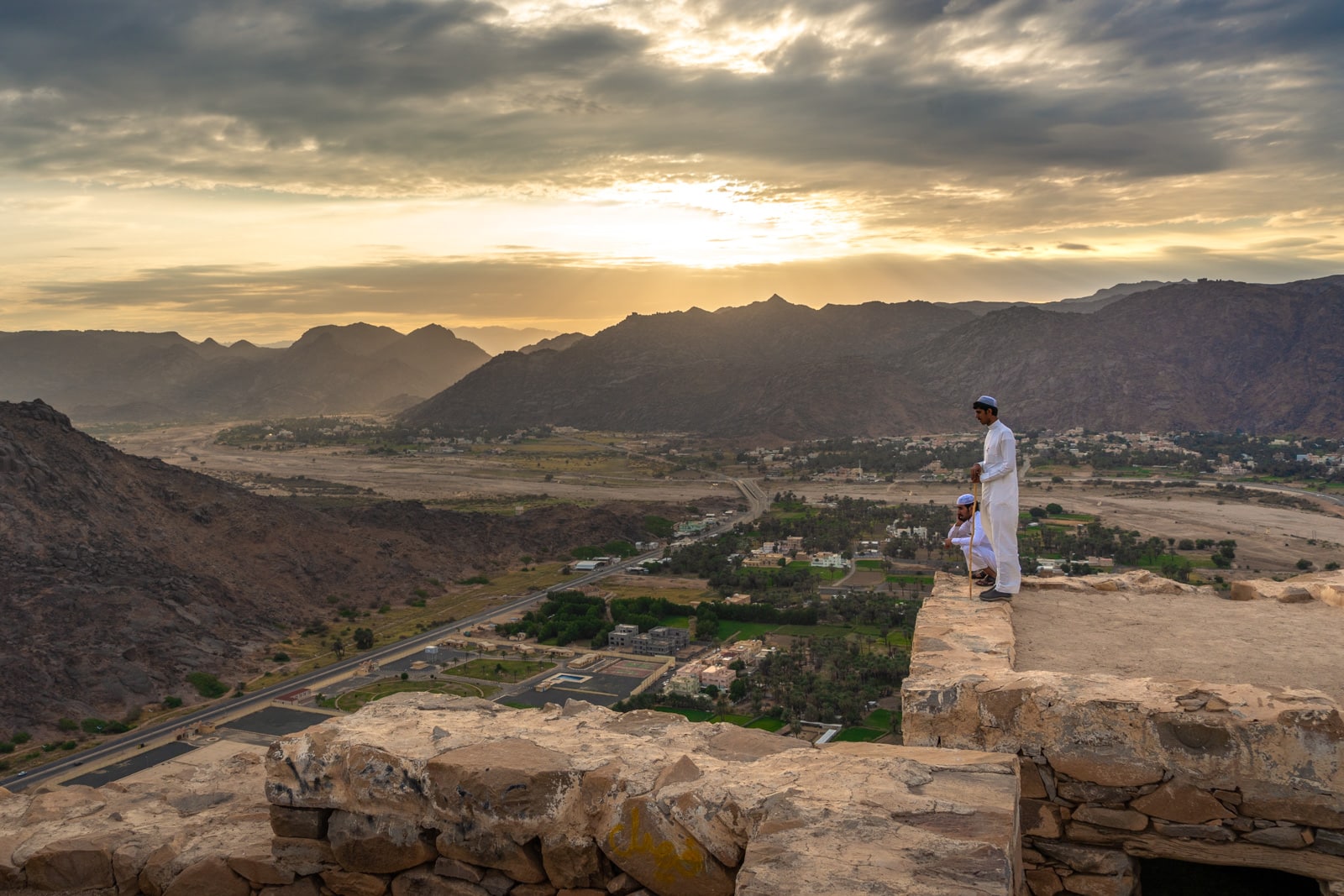
A massive guide to travel in Saudi Arabia
Planning a trip to Saudi Arabia? Here’s what you need to know to travel to Saudi Arabia, from costs to what to wear to safety and cultural deets. Happy planning!
Saudi Arabia has long been closed off for most travelers. Restrictive visa policies meant only Muslims—or oil industry workers—could visit. Even then, they could only visit a few places in the country.
Then everything changed in 2019. *Cue Avatar: The Last Airbender theme*
Saudi Arabia is currently making a big push to rebrand itself as a premier holiday destination in the Middle East. Part of that push involves a more open e-visa policy. This new visa regime makes it significantly easier for many nationalities to visit the country. It also allows pilgrims on Hajj and Umrah to travel beyond Mecca and Medina.
Whether or not Saudi Arabia is a top travel destination is another matter, but if you plan on visiting Saudi Arabia, you definitely need to come prepared to avoid offense. Read on to learn all the things I wish I’d known before traveling to Saudi Arabia!
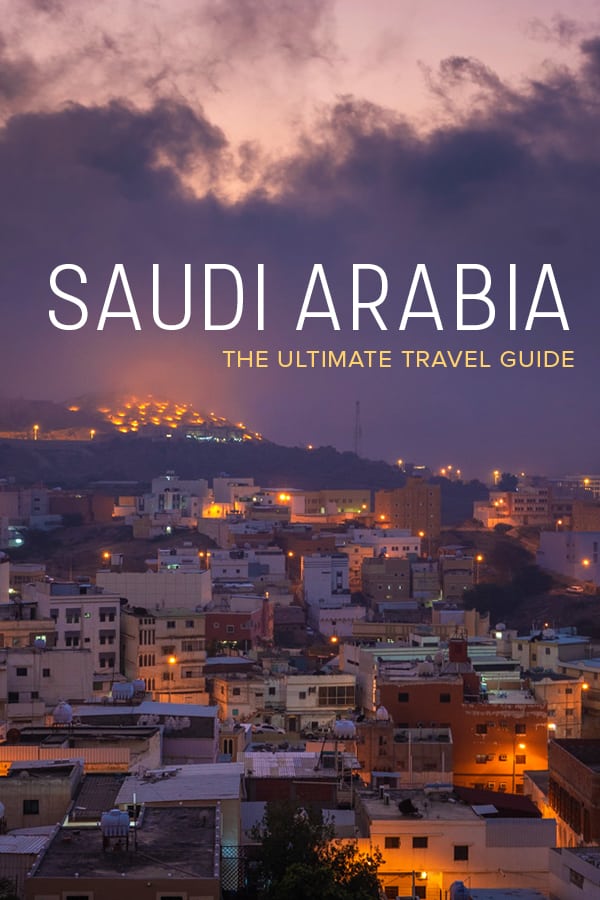
Saudi Arabia travel guide: here’s what you need to know
Saudi arabia basics.
- Best time to visit Saudi Arabia
- Visa for Saudi Arabia
- What to pack
Language in Saudi Arabia
Religion in saudi arabia.
- Clothes and what to wear
- Gender and how to act
- Hospitality and gift giving
Female travel in Saudi Arabia
- Eating customs
- Traveling as a vegetarian/vegan
- Money and payments
- Transportation
Safety in Saudi Arabia
- Mobiles and connectivity
- Travel resources
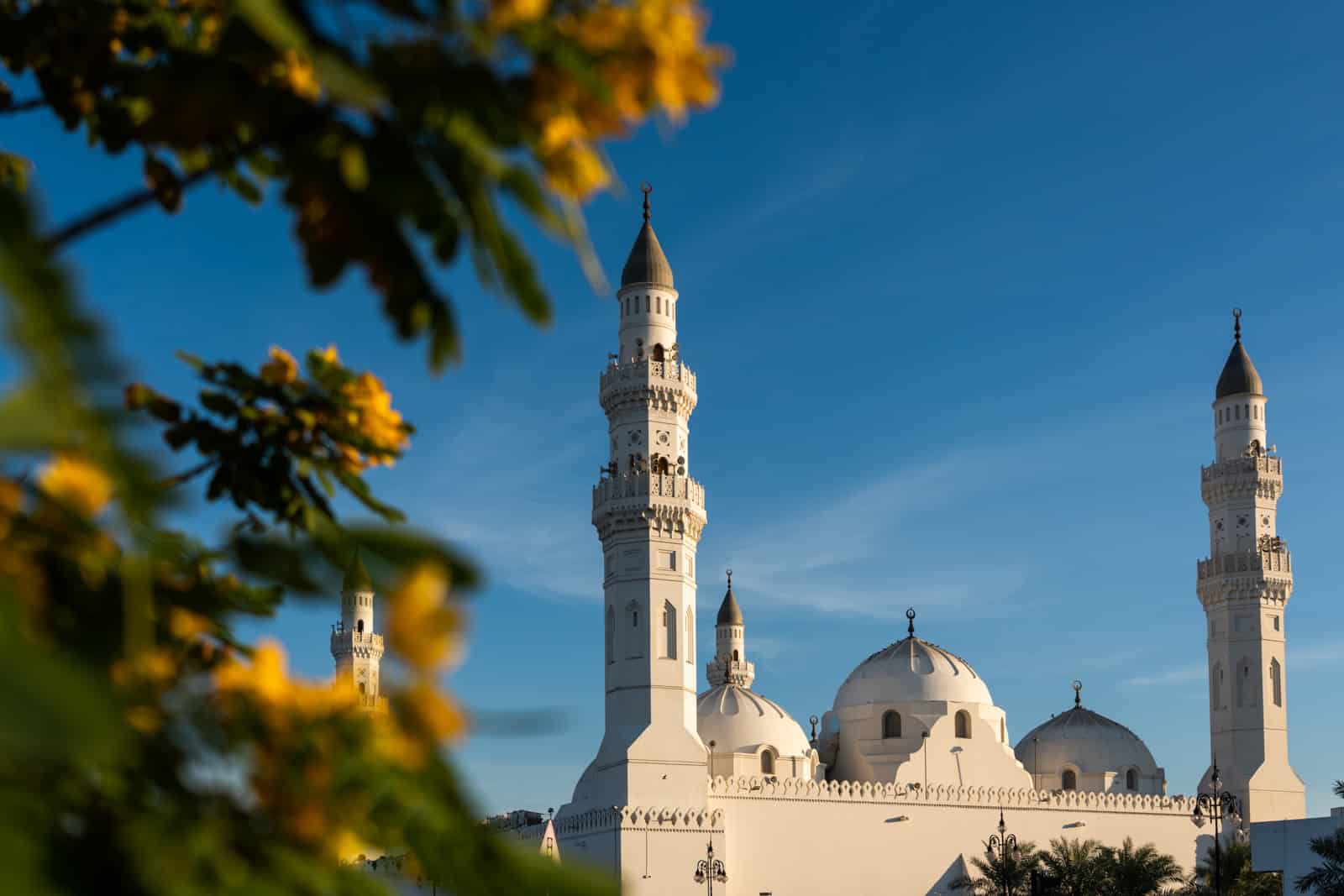
Quba mosque in Medina, said to be the first mosque ever built.
- Official name: Kingdom of Saudi Arabia (KSA)
- Capital: Riyadh
- Population: 34 million
Saudi Arabia is the 12th largest country in the world by landmass. Its population is youthful; of the approximately 34 million people living in the country, 50% are younger than 25.
Expats (foreigners) make up a significant part of its population—more than 30% of people living in KSA are foreign nationals. Interestingly enough, this foreign minority makes up more than 70% of Saudi’s workforce . Interpret that how you will.
The kingdom in its current form was founded in 1932 as an absolute monarchy. This means most of the power in Saudi Arabia lies in the hands of the royal family, the House of Saud, who rule the kingdom to this day. The current monarch is King Salman… but his son, Mohammed bin Salman (also known as MBS), more or less runs the kingdom. MBS is also responsible for the Vision 2030 program that spurred the recent tourism developments.
The Arabian peninsula is the founding place of Islam, one of the world’s largest religions. Its two holiest cities, Medina and Mecca, are both in Saudi Arabia. They are the main destinations of the Hajj and Umrah pilgrimages that millions of Muslims from around the world undertake every year. Religion is critical in Saudi Arabia; for more on religion in Saudi Arabia, see the religion section .
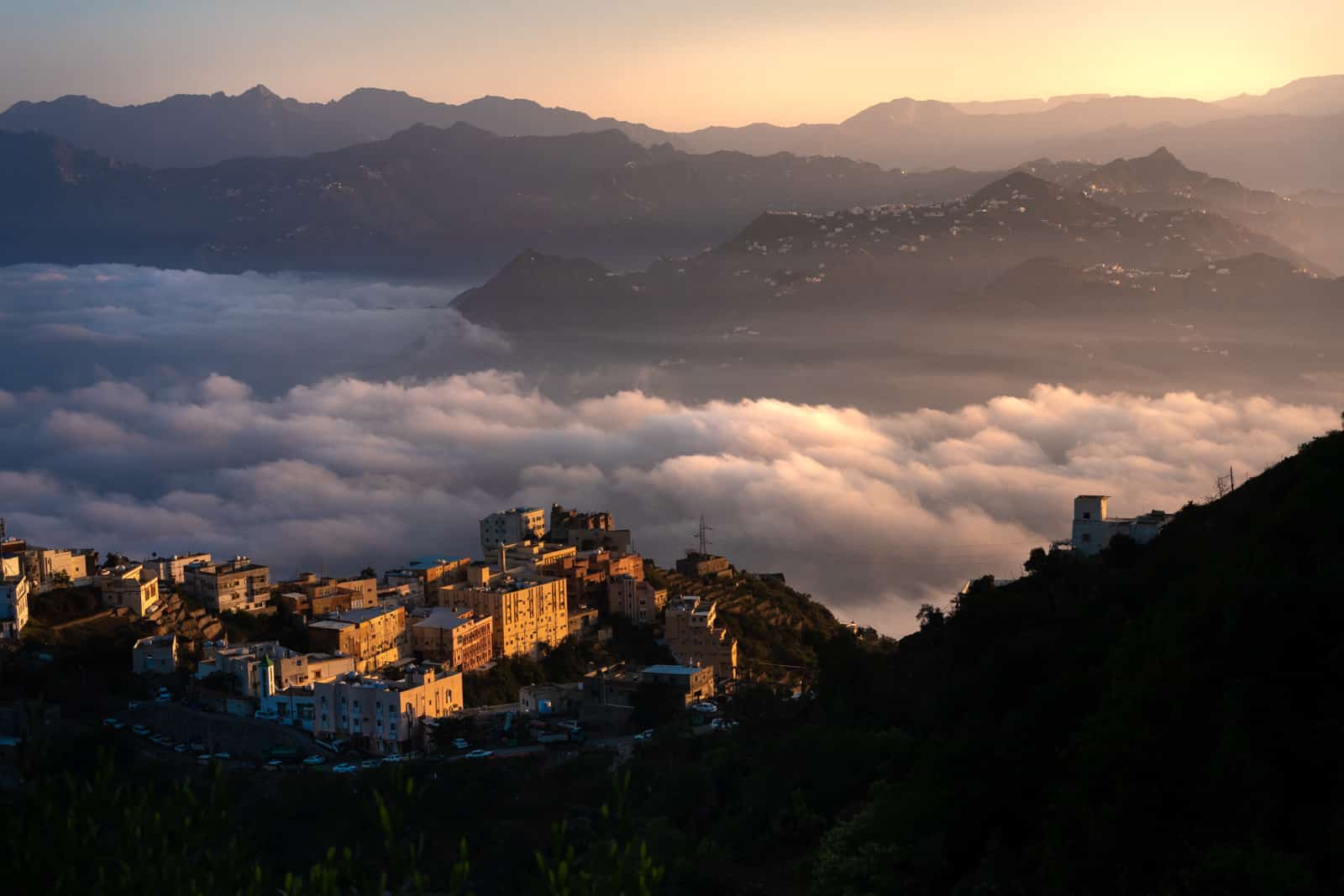
Sunrise above the clouds in Fayfa. Not bad, eh?
When’s the best time to visit Saudi Arabia?
Definitely do not visit Saudi Arabia in summer.
Summers in Saudi can be boiling hot, with temperatures exceeding 40 °C. Unless you’re a masochist, it’s best to avoid traveling to Saudi in summer. The mountains of Asir province are one notable exception to the summer rule; though temperatures can still be high, the cloudy, mountainous terrain is generally quite pleasant during summer.
The best time to visit Saudi Arabia is in winter , roughly between October and March. Temperatures are at their most pleasant between November and February. Temperatures typically begin rising from the end of February or beginning of March, though one can never be quite certain thanks to climate change. Winter temperatures hover around 25 °C – 30 °C , depending on where in the country you are.
Read: My one-month essential Saudi Arabia itinerary
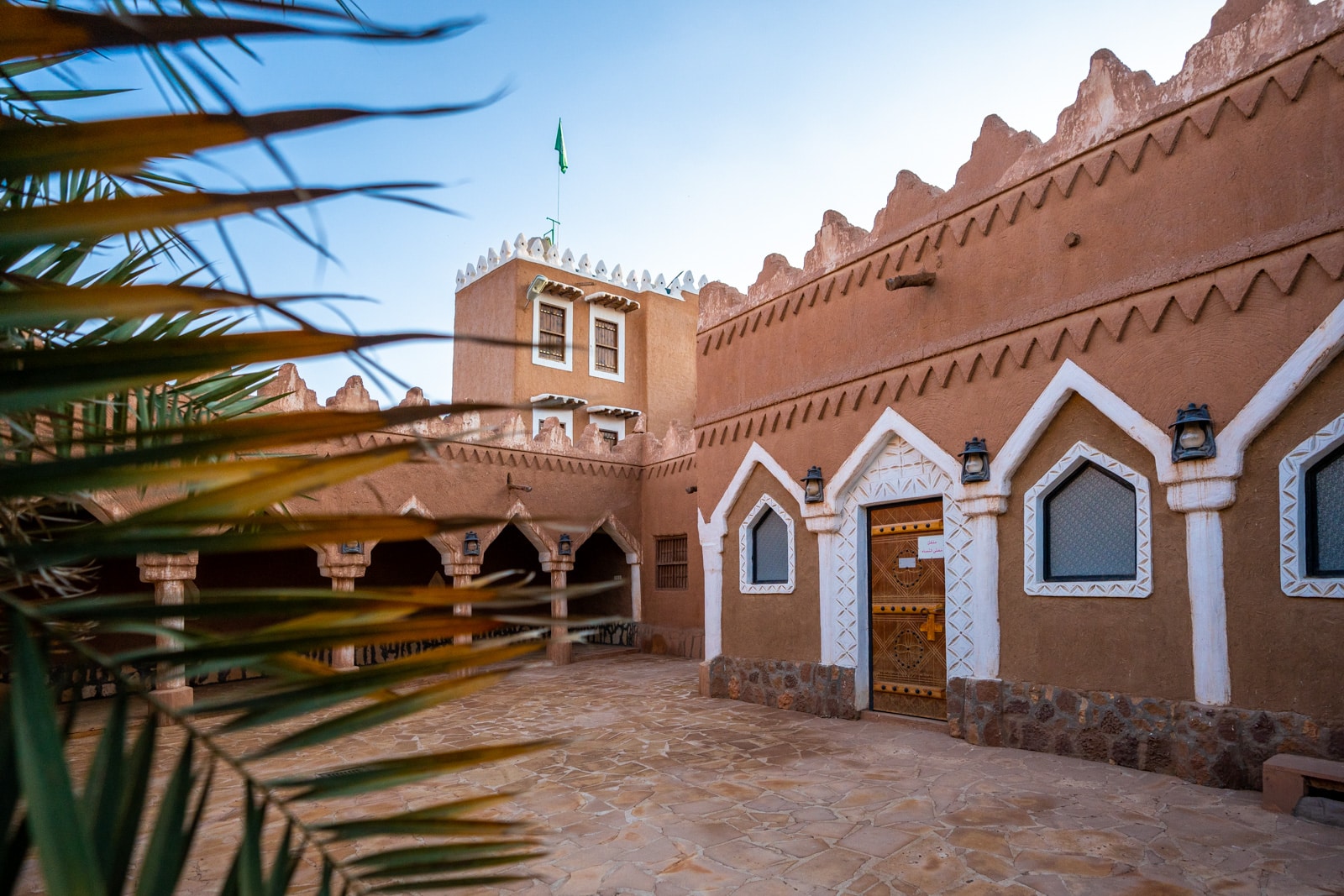
A historic sandstone mosque in Ushaiger village
Visas for Saudi Arabia
It used to be a real pain to get a Saudi Arabia visa. Unless you were a Muslim going on a pilgrimage or an exec visiting/working for business, it was nearly impossible to go to Saudi Arabia.
Before 2019, some travelers managed to get in via “business” trips booked by tour companies. Saudi Arabia began issuing tourist visas specifically for ticketed events in 2018. However, for the most part, Saudi Arabia was a non-option for the average tourist.
In 2019, everything changed with the introduction of the new e-visa system. The new Saudi Arabia e-visa system is surprisingly easy. I was legitimately taken aback when I applied—It took me less than 15 minutes to apply for my visa, I stood up to go to the bathroom after finishing the application, and by the time I returned to my computer 5 minutes later I had a Saudi Arabia e-visa PDF waiting in my Whatsapp inbox. Crazy, right?
Who’s eligible for a Saudi Arabia e-visa?
As of 2020, citizens of the following countries are eligible for a Saudi Arabia tourist e-visa:
Australia, Austria, Andorra, Belgium, Bulgaria, Brunei, Canada, China, Cyprus, Croatia, Czech Republic, Denmark, Estonia, Finland, France, Germany, Greece, Hong Kong, Hungary, Iceland, Italy, Ireland, Japan, Kazakhstan, Latvia, Liechtenstein, Lithuania, Luxembourg, Macau, Malaysia, Malta, Monaco, Montenegro, Netherlands, New Zealand, Norway, Poland, Portugal, Romania, Russia, San Marino, Singapore, Slovakia, Slovenia, South Korea, Spain, Sweden, Switzerland, Ukraine, United Kingdom.
For more detailed and up-to-date information on visa eligibility, how much the visa costs, and to apply for Saudi’s e-visa, check out the official Saudi Arabia e-visa website .
Important note : Several fake e-visa websites have popped up. Do not use any website except the official Saudi Arabia e-visa site to apply for your visa.
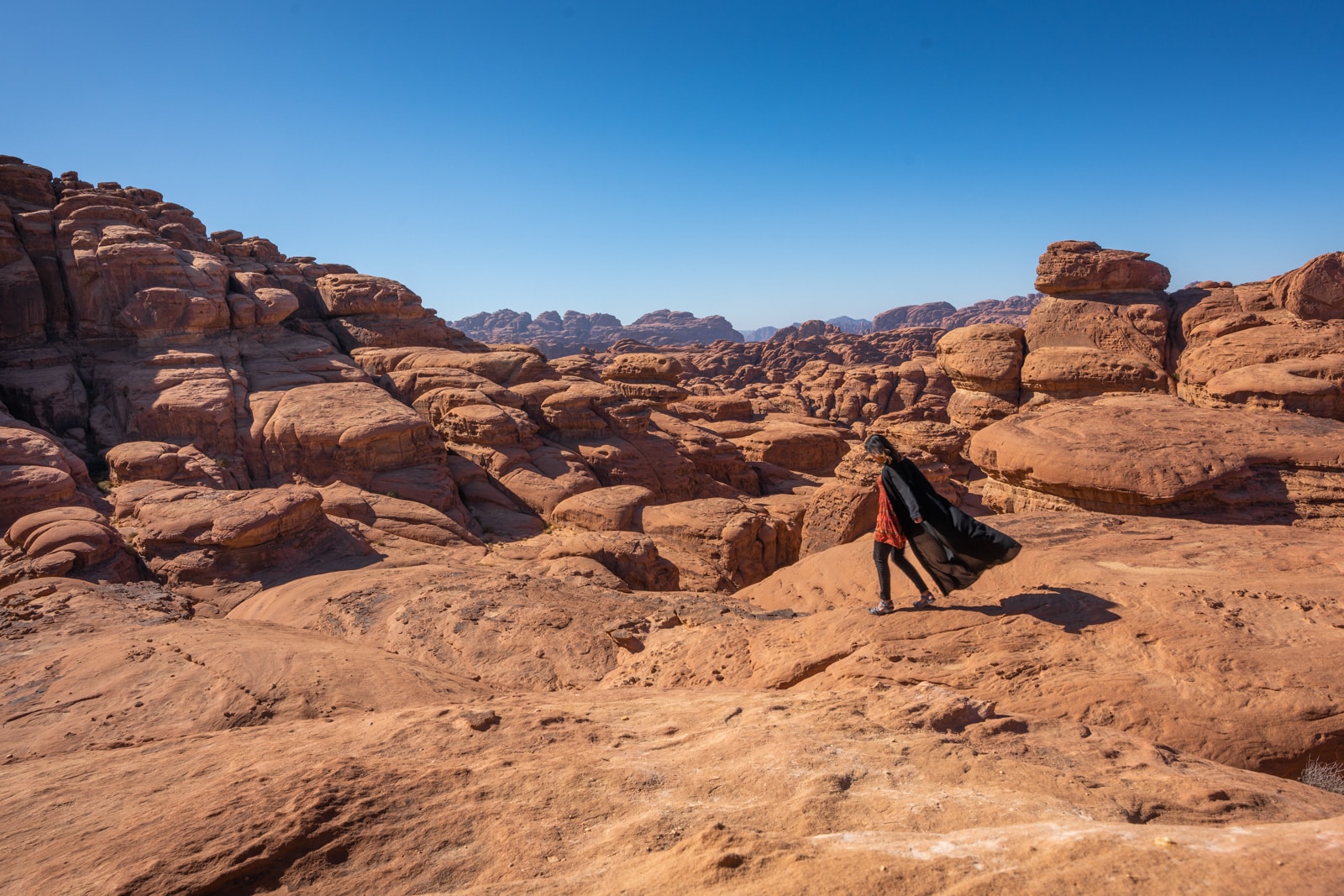
Scrambling around in the northern Tabuk region.
What to pack for travel in Saudi Arabia
Everyone has different needs, but there are a few items I strongly recommend you pack when traveling in Saudi Arabia:
- Modest clothes. This one is a given—Saudi is an Islamic country, after all—but men and women alike need to make an effort to stay covered up.
- Travel adapter. Saudi uses the same G-type plugs (3 rectangular holes) that you find in the UK. If you’re coming from Europe or the US, you’ll need a travel adapter for Saudi Arabia. I always travel with several of these adapters since they also have USB outlets.
- Reusable water bottle. Plastic waste is a huge issue in Saudi Arabia, and people love to buy painfully tiny plastic bottles of water. Do your part for the planet—bring your own water bottle. Tap water is generally safe to drink, and water filters are common in metro areas. I love and recommend my Hydroflask insulated water bottle . It also kept water cold when it was boiling hot!
- Reusable cup for coffee/tea/cold drinks. Same environmental logic applies. They’re seriously useful if you’re road tripping across Saudi Arabia—you’ll be drinking a lot of tea and coffee from rest stops along the highways! These travel mugs are great , and insulate both hot and cold drinks.
- Good sunscreen. Saudi sun is fierce, and the dry heat combined with sun can be seriously hard on your skin. Plus you’re going to get some freaky tan lines from all your modest clothing! I always travel with this specific sunscreen because it doesn’t feel slimy or sticky in the slightest.
- Arabic phrasebook. English isn’t very common, especially outside cities. I used Google Translate often… but no one understood me, and it was total crap at translating Saudi’s Arabic dialect. I highly recommend this Arabic phrasebook —it’s specific to one of the major dialects in KSA.

Typical roadside decor in Saudi.
The official language of Saudi Arabia is—yep, you guessed it—Arabic.
However, Arabic is more nuanced than non-Arabic speakers might realize. Arabic spoken in, say, Morocco, is far different from the Arabic you’ll hear in Saudi Arabia.
The three main variants of Arabic spoken in Saudi are:
- Najdi Arabic
- Hejazi Arabic
- Gulf Arabic
It’s both useful and respectful to pick up some basic Arabic or have a phrasebook on hand for short interactions. Careful, as most Arabic phrasebooks are written for Moroccan or Egyptian Arabic; I specifically recommend using this Hejazi Arabic phrasebook , which covers one of the main dialects you’ll encounter in Saudi Arabia. Never fear, it doesn’t require any struggling with the Arabic alphabet—all the phrases are written in the Roman alphabet.
English in Saudi Arabia? English isn’t widely spoken in Saudi, though people in the tourism sector will often speak some English. More and more young Saudis speak English, as many study abroad for university. Most road signs on main roads are written with both Arabic and Roman alphabets, though speed limit signs are Arabic-only once you get away from Jeddah and Riyadh.
Due to the large number of foreigners living in Saudi—roughly 30% of Saudi’s population comes from abroad—it’s also common to hear people speak Tagalog, Urdu, and Hindi, among other languages. Many of the labor or customer service workers you’ll run into in Saudi are from India, Pakistan, and the Philippines; you can easily travel in many places without Arabic if you speak some Hindi/Urdu. Speaking from experience.
The Arabic alphabet
The Arabic alphabet is written from right to left, and, in my humble opinion, complicated AF. Many letters are drastically different depending on where in the word they fall (beginning/middle/end) and a single dot can change the entire sound of a letter.
Despite its complexity, learning just a handful of letters can be immensely helpful for figuring out signs and differentiating between options. I used the free app Duolingo to learn the Arabic alphabet while traveling in Saudi Arabia. And by learn, I mostly mean shouting exasperatedly at my phone as it asked me to make guttural noises and read incomprehensible squiggles, neither of which I could never dream of reproducing.
Even if you aren’t linguistically inclined, I recommend learning Arabic numerals . They are not as difficult (there are only 10 of them, after all) and you’ll need to know them to read things like prices and speed limit signs if traveling Saudi Arabia by car .
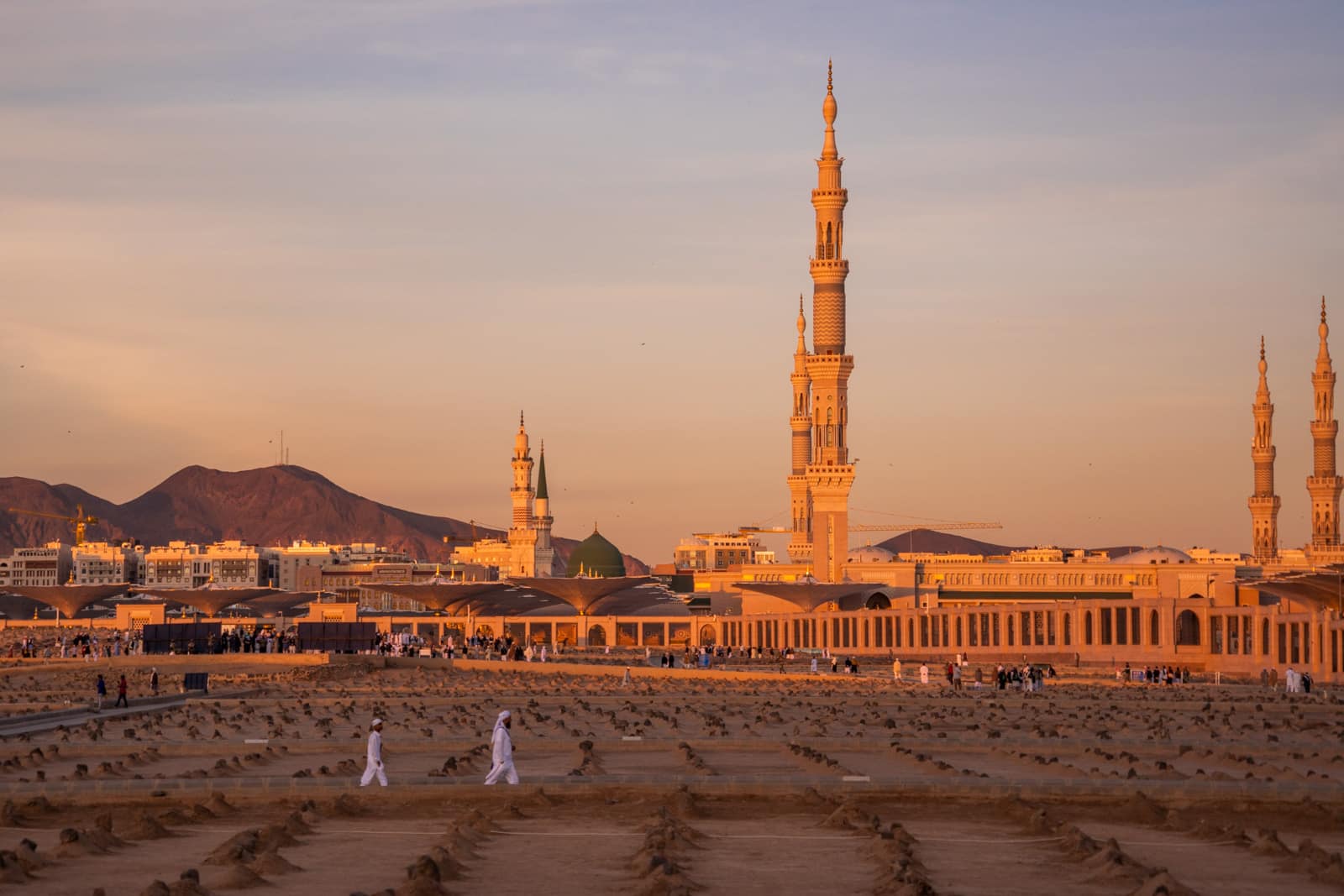
Men walking through the Al Baqi cemetery in the Haram center of Medina, one of Saudi’s holiest cities. Some of the Prophet’s family are buried in this cemetery.
Religion influences every part of Saudi life. Saudi citizens have to be Muslim, and publicly practicing any religion other than Islam is forbidden.
Everything shuts down during namaz , prayer times. In Sunni Islam, there are five prayer times every day: fajr, duhr, asr, maghrib, and isha . The timings change slightly each day— here are today’s prayer times .
Shops, restaurants, cafes—basically everything except for fancier places hidden from sight—will close for around 15 minutes to half an hour during prayer times. Previously, religious police would hound anyone seen not praying during prayer times, but those times are over.
The vast majority of Saudi’s Muslim population is Sunni. There is a Shia minority, which suffers from regular discrimination .
Though there are a few schools of Islamic thought in Saudi Arabia; Wahabis and Salafis make up a significant part of the Sunni population. Both involve relatively strict and traditional interpretations of the Quran.
Minority religions in Saudi Arabia
Because Saudi has such a large immigrant population, notably from places like the Philippines and the Indian Subcontinent, there are also pockets of Christians, Hindus, Sikhs, and Buddhists in Saudi. However, they are not allowed to openly worship or practice their faith.
Proselytizing is strictly forbidden, and can come in many forms—distributing non-Islamic materials such as Bibles is considered proselytizing and is highly illegal.
You are allowed to practice your religion in private as a non-Muslim traveling to Saudi. However, try to be discreet. Under no circumstances should you try to argue with Saudis about their religion.
Atheism in Saudi Arabia? As with any country, there are always outliers. Atheists do exist in Saudi Arabia, but they must be very secretive about their beliefs—atheism is not welcome in Saudi. Even if you don’t have religious beliefs, I recommend saying you have a religion when traveling in Saudi Arabia .
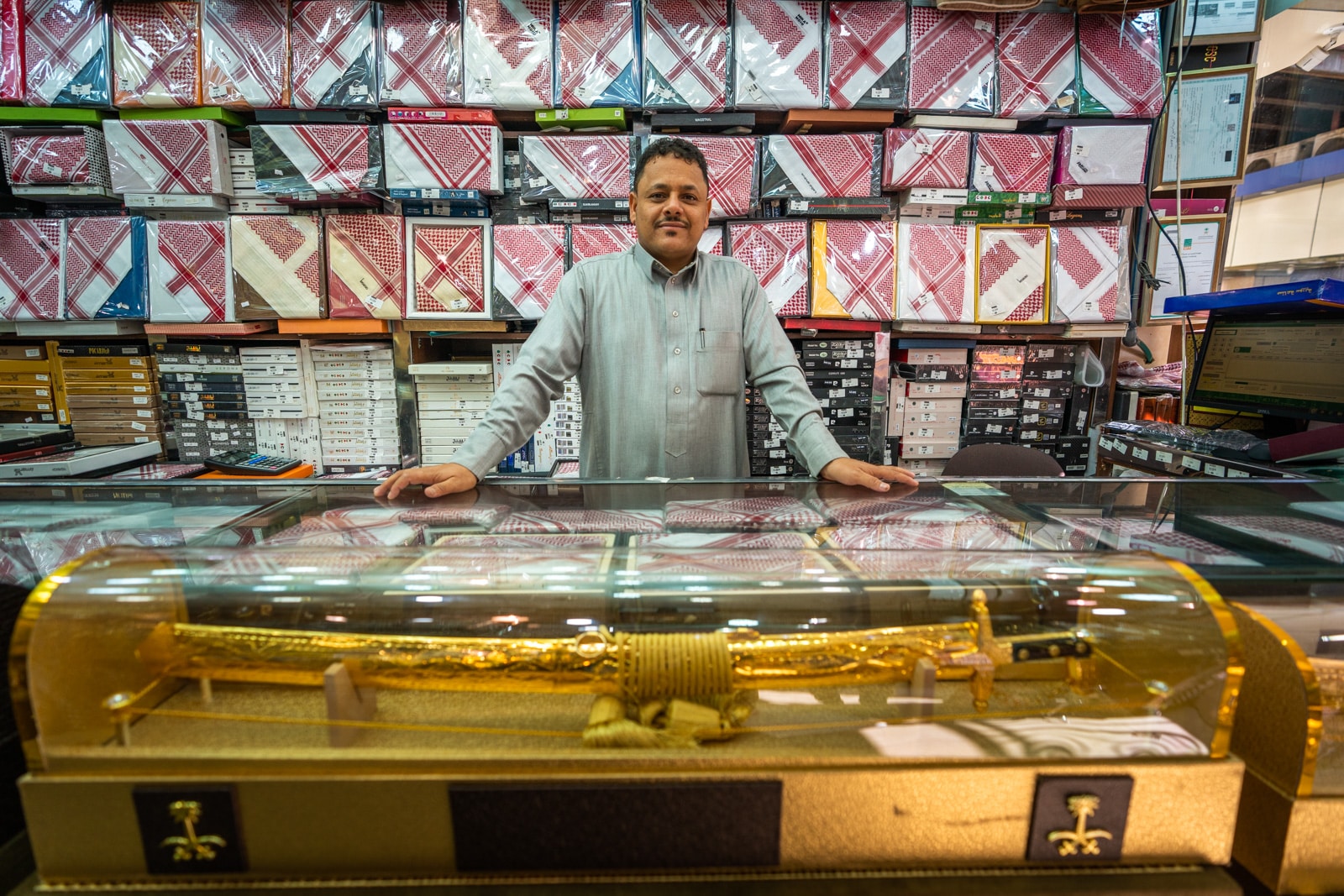
A man selling Saudi ghutra (men’s head coverings) and swords in a bazaar in Khamis Mushait. Nothing like a good sword and robe set as a souvenir for your family back home, eh eh?
Culture in Saudi Arabia
Saudi culture is heavily influenced by several major pillars: Islam, its historic role as a major trade center, and Bedouin (nomadic desert tribes) roots. Generally, Saudi culture is deeply religious, family-oriented, protectively traditional, and socially conservative.
Clothes and what to wear in Saudi Arabia
One of the first things any visitor to Saudi will notice is how many people wear traditional clothes.
Even in major cities like Riyadh and Jeddah most men still wear thobe , the long, loose robes coming to the ankles. The vast majority of women in Saudi Arabia are completely covered in black abayas, long, loose robes for women, and hijab head coverings. Most women cover their faces when out in public.
As a tourist visiting Saudi Arabia, it’s required by law to dress modestly. You don’t have to go out and buy a thob ASAP, but there are some basic requirements to keep in mind.
Men: Men should avoid tank tops or walking around shirtless—t-shirts at the very minimum—and long pants are strongly recommended. Islam requires men’s knees to be covered, and you will stick out like a sore thumb if you walk around in shorts and a wife beater tank.
Women: Though foreign women are no longer required to wear abayas , I still strongly recommend female travelers wear them in public in cities and towns. Unless you’re hanging out with elites or in someone’s home, you will be the only woman not wearing one 99% of the time. You can wear whatever you’d like underneath—I often wore a t-shirt and jeans—but an abaya is ideal. Headscarves are not mandatory, though in many areas I wore one to avoid people’s stares.
Smells in Saudi: Scents and smelling good are highly prioritized in Saudi Arabia. Men and women alike wear scents, cars must smell good, and greeting guests with bukhoor (a sort of goblet-shaped incense holder, usually to burn oud wood) is common. You don’t have to smell like a perfume shop all the time, but know people will be very aware of how you smell. A bit of an embarrassing issue for me, an often-smelly backpacker.
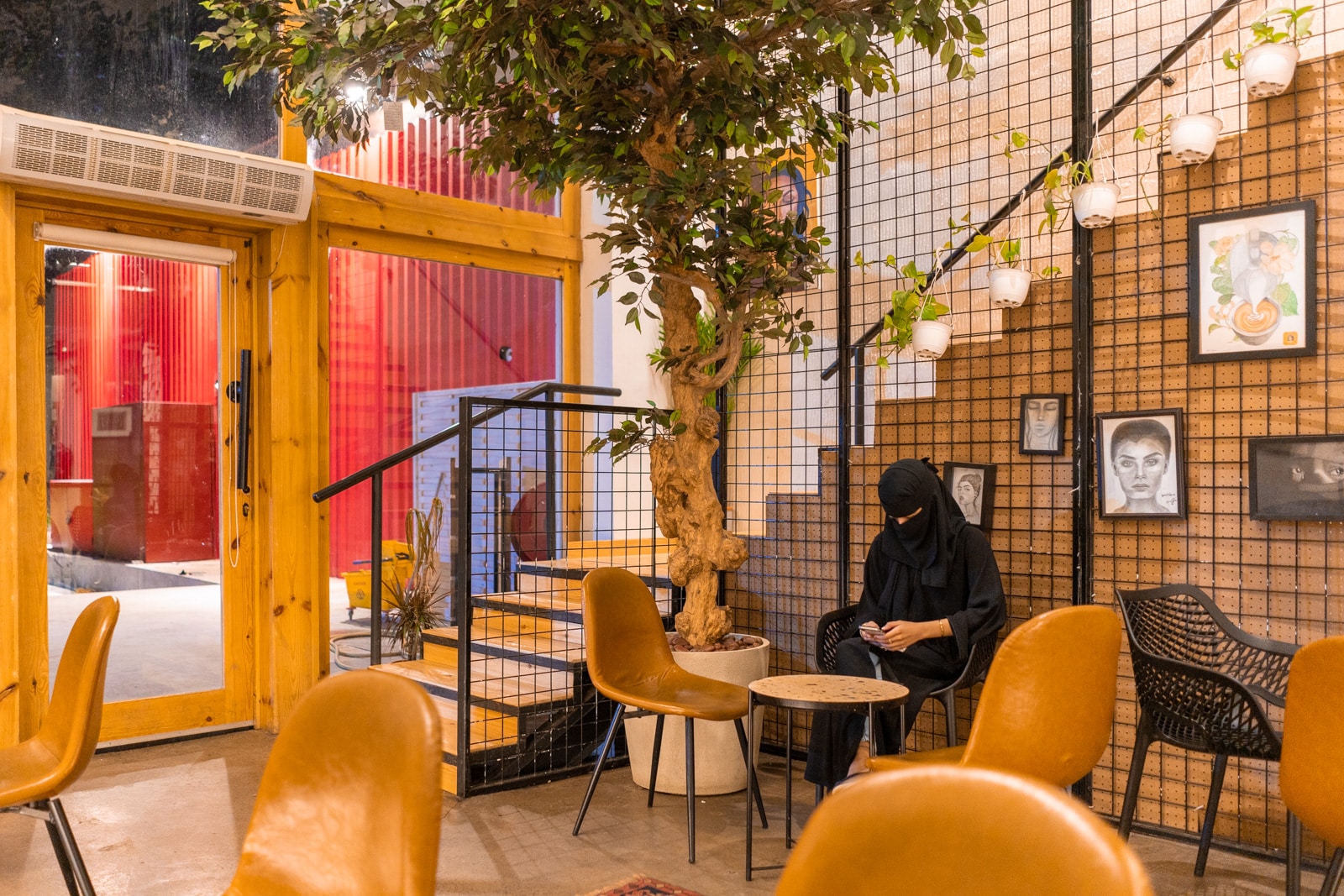
Gender divides and how to act in Saudi Arabia
Saudi Arabia is heavily segregated by gender. Men operate in one sphere, women in another.
Even within families, it is common for women to stay out of sight or hidden from men. I met many men who do not know what their extended female family look like, and women who would cover themselves in front of their husband’s brothers. Just to give you an example of how extreme the segregation can be.
Practically, for travelers the gender divide is most noticeable when it comes to eating. It is no longer required by law, but many restaurants are still divided into men and women/family sections. Some restaurants do not allow women at all. Men cannot sit in the women’s section unless accompanied by women; women usually cannot sit in the men’s sections, though sometimes more progressive restaurant owners will be flexible about the rule if the restaurant is mostly empty.
The extremity of segregation varies around the country. In small towns, you likely won’t see women at all. In Jeddah and wealthy parts of Riyadh, you’ll see more men and women mixing these days.
How to act around the opposite gender is something that varies from person to person. Here are some general tips to keep in mind:
- Do not touch the opposite gender. This includes handshakes; only shake hands if the local offers first, though they probably won’t.
- Try to avoid making unnecessary eye contact with strangers of the opposite gender if you’re not interacting with them, especially as a man. Men can get defensive if you stare at their wives/sisters.
- Don’t sit next to the opposite gender unless you’re with them or related to them.
- No PDAs you traveling couples. Though you’ll see married couples holding hands sometimes, anything beyond that is inappropriate and a punishable offense.

Hospitality and gift giving in Saudi Arabia
Hospitality is another core element of culture in Saudi Arabia.
As in many Islamic societies, guests are seen as a gift from God. Taking care of guests is an opportunity to do good and win favor in the eyes of Allah. When traveling in Saudi Arabia, don’t be surprised if you’re given gifts, taken out to dinner, or shown around for an entire day “because you’re our guest.” Let it be noted that the whiter you are, the more likely this will occur.
You might be tempted to give your hosts a gift as thanks, but you probably shouldn’t. Though they’ll happily shower you with gifts, many Saudis will take offense to gifts given to them by new acquaintances/non-relations. Proper gifts are usually quite expensive—think fancy carpets or expensive scents—so unless you’re visiting a family or long-time friend, don’t feel pressured to bring gifts. Just appreciation.
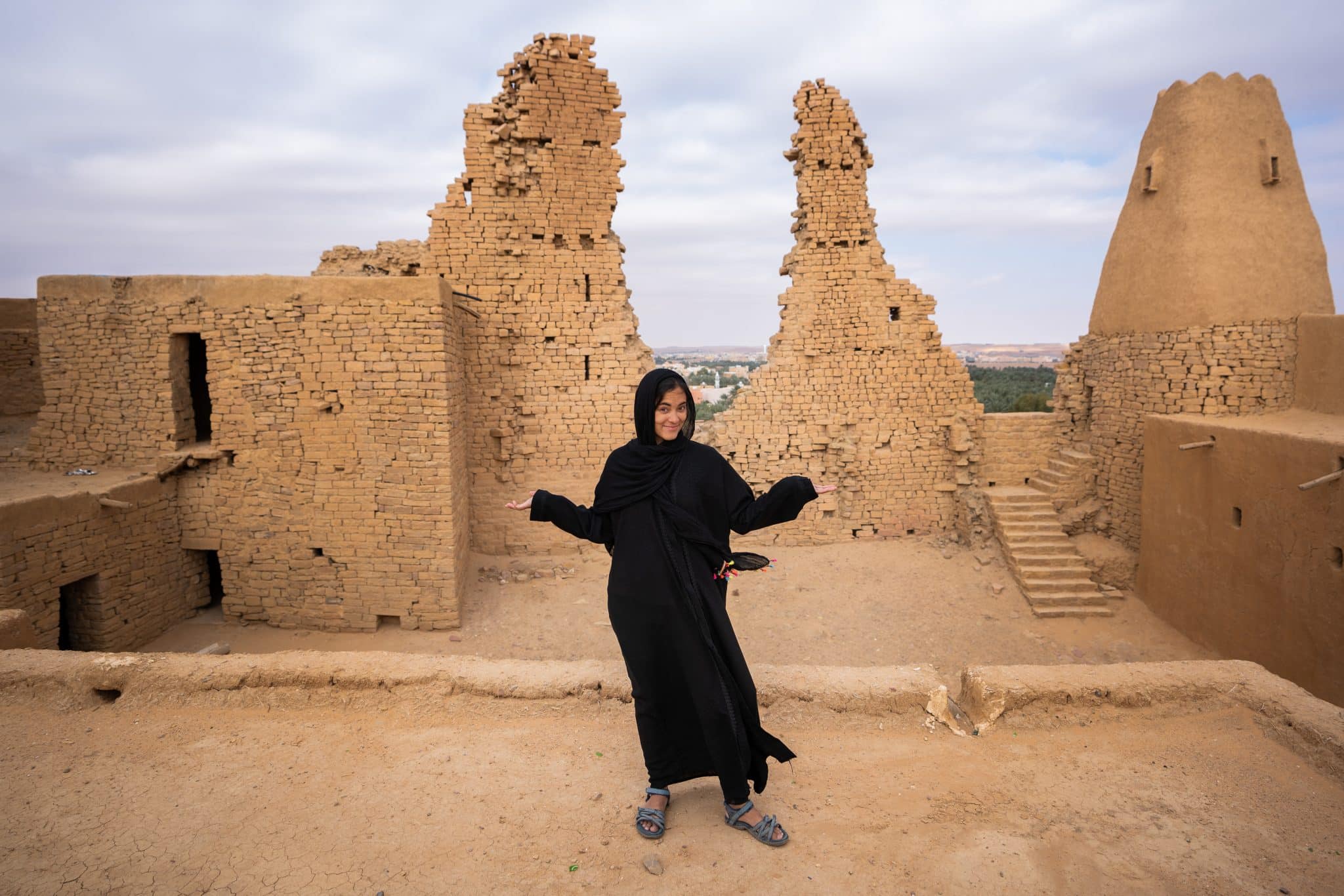
My daily outfit in Saudi: black abaya, headscarf, and whatever clothes were least dirty underneath.
Traveling as a woman in Saudi Arabia is worlds apart from traveling as a man.
Even if you’re a female traveler traveling with a man, people will treat you very differently from male travelers. Women are treated with great respect in Saudi Arabia, though “respect” in Saudi Arabia might be viewed as restriction by others.
The status of women in Saudi Arabia is complex—one I’m not exactly qualified to discuss—so let’s stick to practical travel matters. Because genders are so segregated in Saudi, it can be hard to find women to interact with outside of the big cities. You need to be far more attentive to your clothing than men. Finding places to eat that allow women can be a bit of a nightmare in small towns—you’ll have to get used to takeaway meals.
On the “bright” side, because the punishment for harassment is so severe—and official harassment can be something as simple as a man staring at you for too long—female travelers are generally not at risk of more severe assault. I encountered some verbal harassment and men following me, and a few solo female travelers I spoke to were propositioned for sex, but harassment should not be a major concern for female travelers.
In my personal experience, both solo and traveling with men, I often found traveling in Saudi Arabia as a woman to be isolating more than anything else. As a disclaimer, part of that could be attributed to my appearance—most people thought I was either Arab or Indian/Pakistani—as I heard more glowing stories from white women.
I could go on for a long while on female travel in Saudi Arabia, but I’ll stop here. For a more in-depth discussion, check out my guide to female travel in Saudi Arabia .

The Yemeni-influenced food in Jazan was 100% my favorite in all of Saudi Arabia. I’m drooling just looking at this.
Food in Saudi Arabia
If you love food, prepare to put on a few pounds in Saudi Arabia. I know I did.
Saudi Arabia has long been a crossroads of cultures. Traders came in by horse and camel from the north, while others came by sea. Muslim pilgrims from all over the world have traveled to Mecca for centuries.
As a result, Saudi cuisine draws on many different influences, and many common dishes in Saudi Arabia actually have origins elsewhere. Fu ul (beans), falafel, and shawarma are diet staples, though not traditionally Saudi.
Some traditional Saudi dishes to look out for include:
- Kabsa – Roast chicken and rice found everywhere
- Dates – Saudi Arabia has some of the best dates in the world, and they come in all different types and flavors. The Qassim region is considered to have the best dates in the country.
- Jareesh – Crushed wheat porridge, topped with savory onions and dried limes
- Murtabak – Stuffed pancake
- Tharid – Spicy lamb stew served with bread
- Laban – Creamy yogurt drink
- Mamuul – Stuffed date cookies
- Arabic coffee – Not at all like “normal” coffee, it’s yellow, bitter, and flavored with cardamom
Meals in Saudi Arabia are rich, spiced, and usually accompanied by a mound of rice or bread, as well as thick, creamy laban (a strained kind of yogurt that can also stand alone as a drink—it’s delicious!). Meat is an essential part of main meals, and sweet tea often follows.
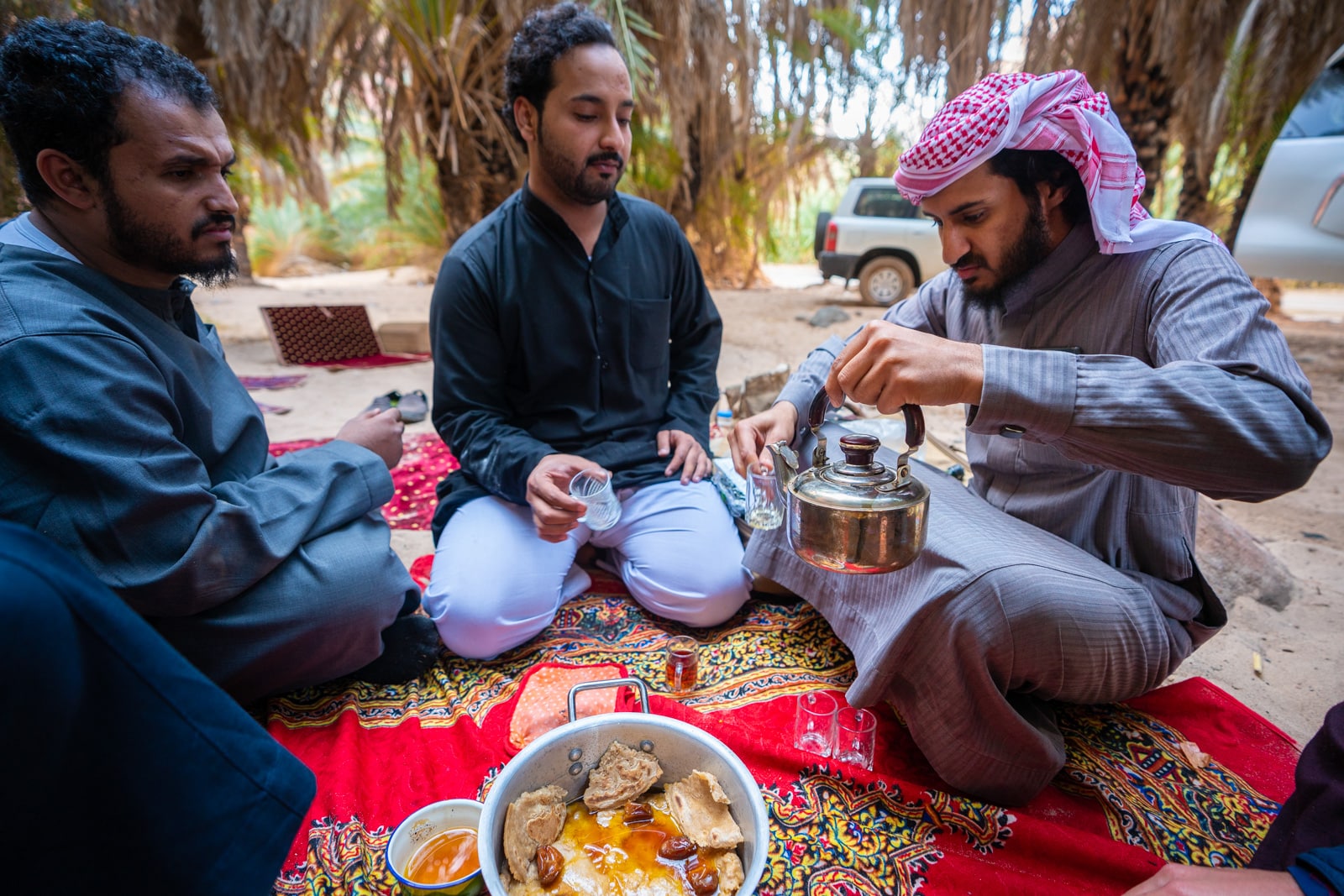
Eating customs in Saudi Arabia
There is definitely a right and wrong way to eat in Saudi Arabia! Though you’ll probably be forgiven for any culinary cultural faux pas as a foreign visitor, it’s still good to respect norms.
Traditionally, meals are eaten on a mat on the ground , and everyone eats from a large, central plate. Usually, there are boxy pillows on the ground you can lean up against for support.
Food is eaten by hand. Don’t worry, washing hands before and after all meals is customary. Eat with your right hand only (left hands are for dirty business), unless doing something more complicated like picking a chicken bone apart. Only pass food with your right hand , even if it’s dirty.
When sitting on the ground, try to keep your legs crossed or knees bent . It’s considered rude to extend your feet in front of people you respect, especially if your feet are pointing towards them.
Saudis will usually press you to eat more, and refill your cup whenever your coffee or tea is finished. It’s expected to let them refill your cup at least once. As for eating, it’s best to start saying you’re full well before you’re stuffed to the brim… else you might be stuffed beyond the brim.
Confused about how to eat? Here’s a video on eating customs in the Middle East to give you an idea of how and why people eat the way they do. The vlogger isn’t Saudi, but the same principles apply.
Traveling as a vegetarian/vegan in Saudi Arabia
Though meat is a meal staple, there are plenty of vegetarian- and vegan-friendly foods to be found in Saudi Arabia if you look.
Some upmarket establishments have vegan options. Vegetarian restaurants exist in big cities. Though you might encounter some raised eyebrows, vegetarians and vegans are increasingly common in Saudi Arabia—one of Saudi’s princes is vegan . In general, people in cities understand what vegetarians are.
Some common foods you can rely on as a vegetarian or vegan (*) traveler include:
- Falafel* (if no yogurt)
- Fuul (beans)*
- Vegetable murtabak (stuffed pancakes)*
- Dal tamiz (lentils with bread)*
- Moutabel (baba ghanoush)*
- Masoub (Yemeni banana and bread pudding)
Here are more food options for vegetarians in Saudi Arabia.
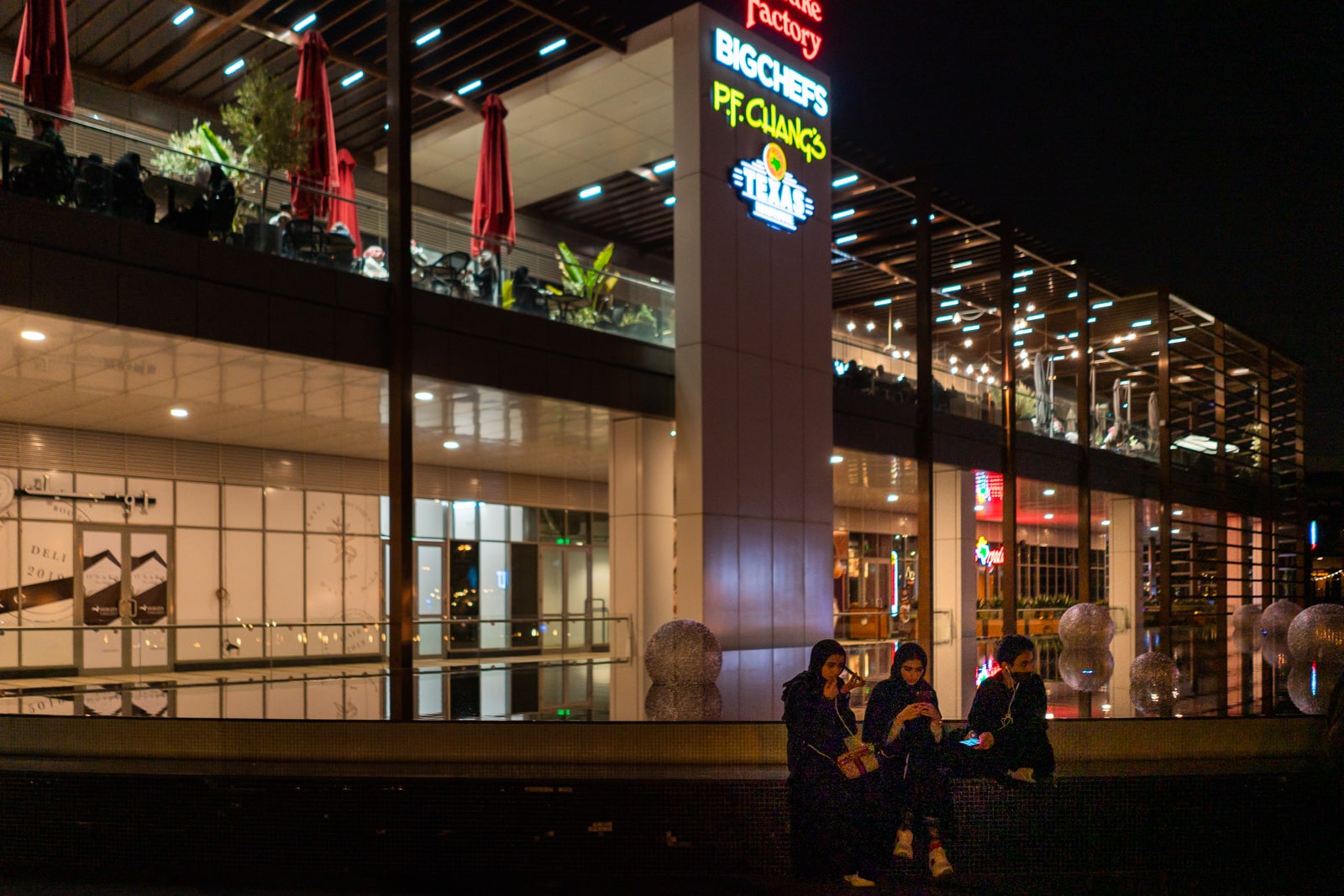
Teenagers hanging out at one of Riyadh’s fanciest malls.
Money and payments in Saudi Arabia
Saudi Arabia uses the Saudi Riyal (SAR). One Riyal is divided into 100 halalas. Saudi has banknotes and coins, although the coins are mostly useless. However, don’t be surprised if you end up with a stack of one and two riyal coins (and a bunch of halalas to boot). At the time of writing, 1 riyal is $0.27 or €0.25. Check here for the current exchange rate.
Paying with credit card
It’s possible to pay by international credit card for most large transactions such as nice meals, car rentals, and hotels. Google Pay is also quite popular in Saudi Arabia—many people just use their phones to pay in cities.
Cash and ATMs
Banknotes come in 5, 10, 50, 100, and 500 riyals. Make sure to withdraw an amount from the ATM that isn’t easily divided into 500 notes; you don’t want to be stuck with a stack of large banknotes. Many places will have some change, but not always enough to break a 500.
Getting money from the ATM is straightforward (there are even drive-through ATMs), and there aren’t any hidden ATM fees to worry about.
Read: How much it costs to travel in Saudi Arabia
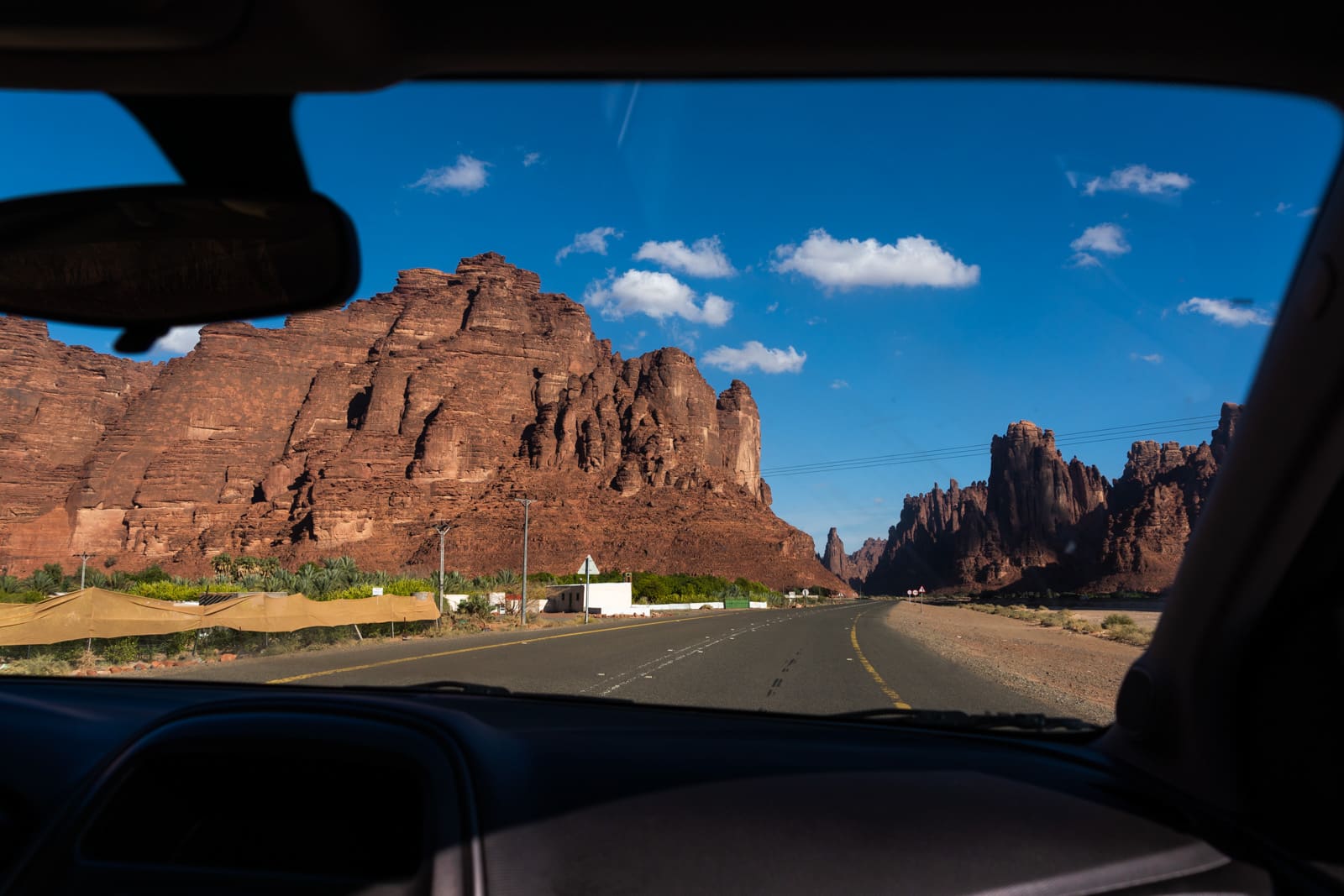
Road tripping into Wadi Disah, one of the most epic canyons in Saudi.
Transportation in Saudi Arabia
Saudi is absolutely massive; getting around takes time. Cities are spread out, and there’s hardly any public transport to speak of. Even between cities—which can easily be more than 500 km apart—public transport is limited.
By rental car
Saudi Arabia is made for cars, especially 4x4s. Saudi’s most memorable spots are all outside the cities; I highly recommend you rent a car to make the most of your trip to Saudi. My guide to road tripping in Saudi has all the information you need.
Note on cars: I’ve heard of unofficial shared taxis offering rides between cities, though I didn’t use any myself. A local told me you can sometimes find them lurking outside of major bus terminals.
If you’re short on time, or if you only want to visit a few main cities, planes are the most efficient (and often cost-effective) way of getting between cities. Most flights are less than two hours. Some are even cheaper than bus tickets.
SAPTCO runs an extensive bus network throughout Saudi Arabia. Buses are clean and comfortable, though on the pricey side. Expect to pay at least US$50 per person for a long distance bus ticket.
For more info on traveling by bus in Saudi Arabia, check out the Saudi Arabia Public Transport Company (SAPTCO) website .
Transport within cities
Ride sharing apps Uber and Careem are commonly used in big cities such as Riyadh and Jeddah.
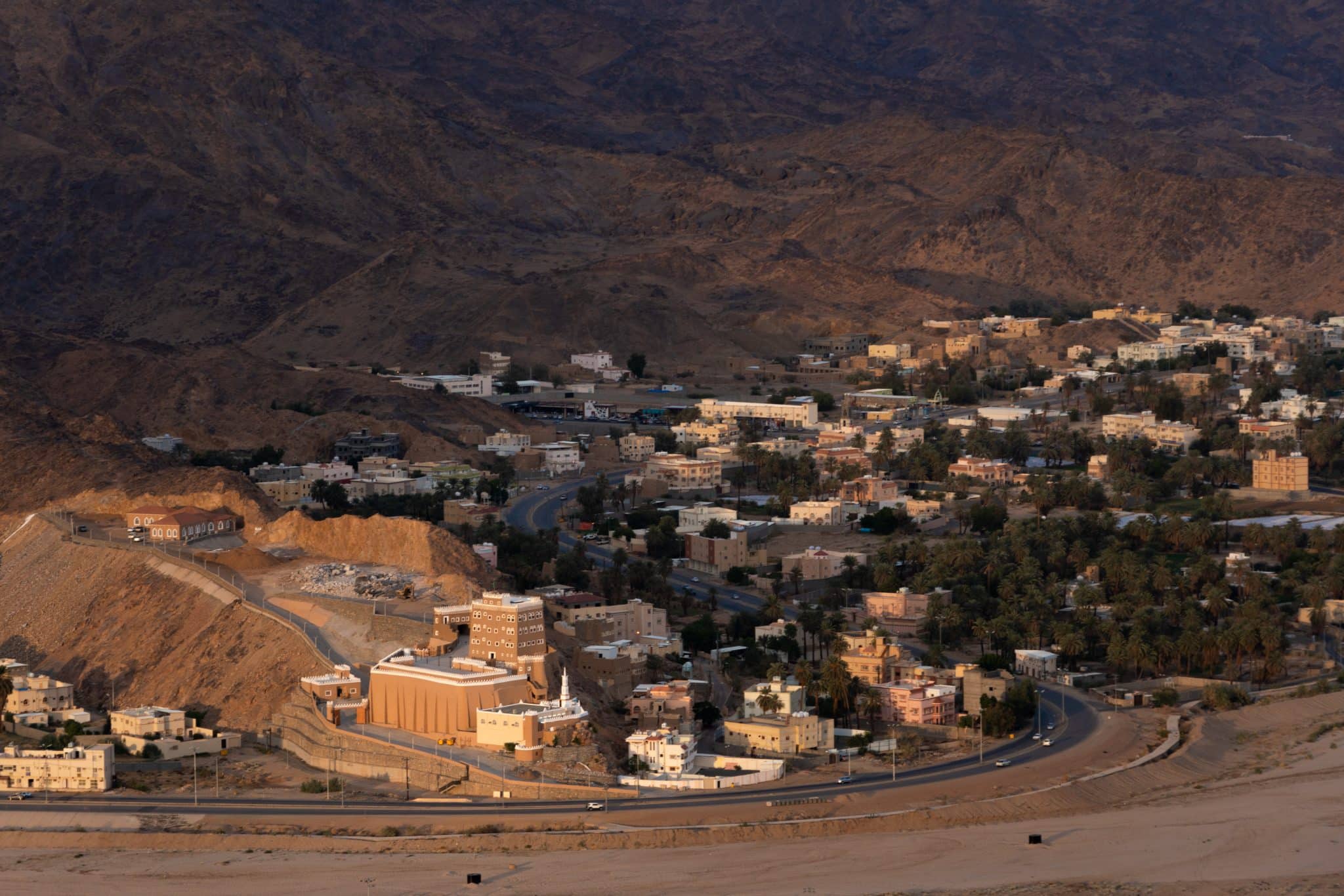
Najran, the Saudi city hardest hit by the war in neighboring Yemen.
Many people have asked me: Is Saudi safe? I think Saudi is generally a safe place to travel to. Although it’s had problems with violence and terrorism in the past, most areas in Saudi are perfectly safe for the average tourist.
The only area considered dangerous is the area along the Yemeni border around Najran. Tourists are allowed to visit, but most governments advise against travel there. Saudi is currently in talks with the Yemen rebels to negotiate a truce. However, some security experts are fearful the rebels might launch a ground offensive on Najran if their demands aren’t met. If you plan on traveling to the south, make sure to keep an eye on the current situation.
Safety issues for travelers in Saudi Arabia
Drivers are the biggest safety hazard in Saudi Arabia. Many drivers drive like crazy, so be careful when crossing the street or driving around the country.
Openly talking about politics or the royal family with people you don’t know well is not wise. Saudi critics of the royal family have been jailed.
Criticizing Islam is absolutely to be avoided for a variety of reasons.
Drugs , including alcohol, are illegal in Saudi Arabia. They do exist—alcohol is common especially among elite and/or foreign circles and khat is a stimulant commonly consumed in the south—but possession is a punishable offense.

Probs checking his Snapchat; Saudis use Snapchat more than any other social media app for everything from messaging to promoting their business.
Mobiles and connectivity in Saudi Arabia
Saudi is fairly well connected. There’s 4G service almost everywhere, even on long stretches of highway in the middle of nowhere. Many cafes and hotels have decent wifi, though mobile signal is often better.
There are several mobile operators in Saudi Arabia. STC, Mobily, and Zain are the three main operators in the Kingdom. I used both STC and Mobily while in Saudi, and highly recommend using STC.
STC’s coverage is the best of the three; I had 4G practically everywhere, even out in nature. Price-wise, Mobily is slightly cheaper, but has poorer service outside of cities and towns. Zain is the cheapest option, but also has the worst coverage outside metro areas.
If you want to get a SIM card, I recommend getting one upon arrival in the airport (if you fly in). The main carriers all have small offices at arrivals, and it’s easy to get a card here as the workers all speak English. It’s possible to get SIM cards in cities, but only at official stores, and workers will be less likely to speak English.
The price for a SIM card with 10GB data is roughly 160 SAR. A 10GB top up is 100 SAR. For info on costs, check out my Saudi budget report .
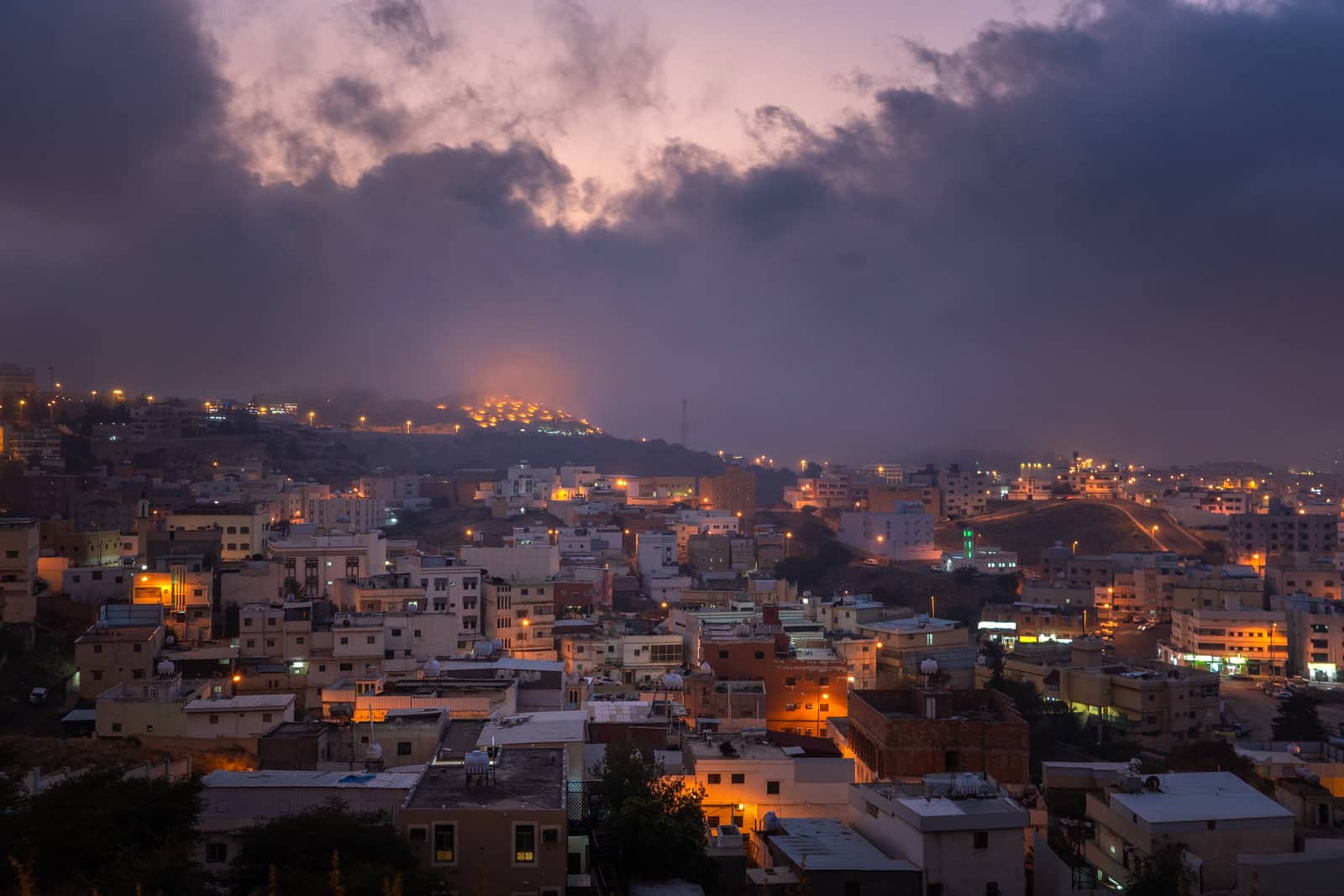
A moody twilight in Abha, a city in the mountains.
More resources for travel in Saudi Arabia
- What it was like to travel Saudi Arabia
- A one-month itinerary for Saudi Arabia
- Guide to female travel in Saudi Arabia
- How much it costs to travel in Saudi Arabia
- Driver’s manual to road tripping in Saudi Arabia
- Nada al Nahdi – Travel blog from a female traveler who was born in Saudi Arabia. Contains some useful itineraries and tips.
- House of Saud – Intriguing documentary explaining the royal family’s power. I recommend watching before visiting.
- Blue Abaya – Popular travel blog by a Finnish expat living in Riyadh
Have more questions? Saudi Arabia travel tips for others? Leave them in the comments!
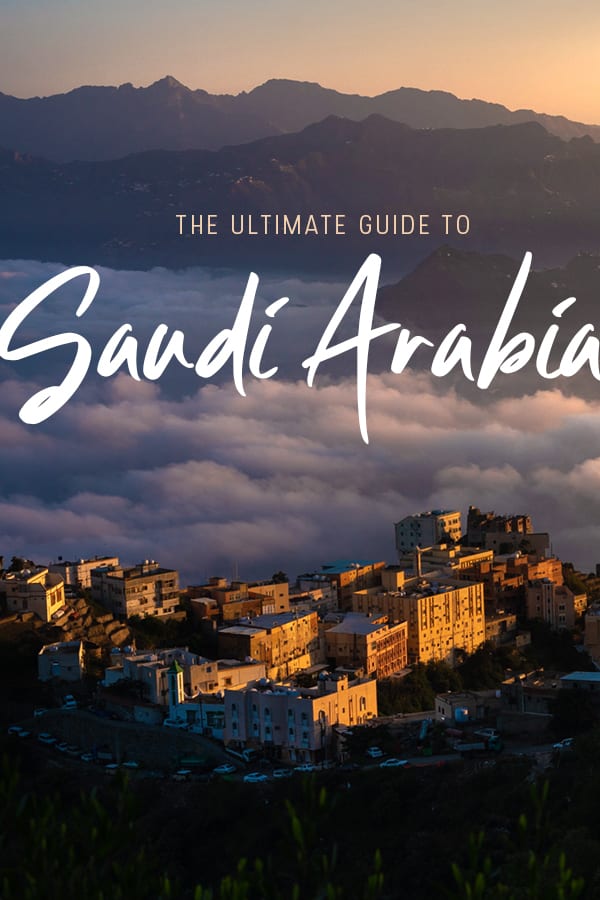
Yay transparency: This post contains affiliate links. If you buy something using my links, I’ll make a bit of extra money at no extra cost to you. It’s how I keep the blog up and running! Never fear, I only recommend things I use or would use myself.

Alex Reynolds
14 thoughts on “ a massive guide to travel in saudi arabia ”.
==> 88nb.cc/2xj16 url.epoch.tw/JM0oX <==
There’s no limit to what you and your partner(s) can do during anal play to ensure you both have the orgasm you deserve. An anal fissure is a tear in this canal. I’m not going to call any names, but I’m curious if- I’m curious about anybody. Nicole Parrish: I don’t, but maybe someone else on the call might.
XP projects are not quiet; there always seems to be someone talking about problems and solutions. Poorly compressed: Any image where compression artifacts are easily visible. Male condoms are 98% effective and made from very thin latex, polyisoprene or polyurethane. More on What are Tonsil Stones Guide? A stylish funeral will have a dozen or more cars, the windows of which are hung with white crepe, and the doors with black; the drivers and conductors appear in black suits and high, silk hats; the horses are draped, and have black and white plumes on their heads.
Hi, honeybunch!
Leave a Reply Cancel reply
Your email address will not be published. Required fields are marked *

- Privacy Overview
- Strictly Necessary Cookies
This website uses cookies so that we can provide you with the best user experience possible. Cookie information is stored in your browser and performs functions such as recognising you when you return to our website and helping our team to understand which sections of the website you find most interesting and useful.
Strictly Necessary Cookie should be enabled at all times so that we can save your preferences for cookie settings.
If you disable this cookie, we will not be able to save your preferences. This means that every time you visit this website you will need to enable or disable cookies again.

Tips for Traveling to Saudi Arabia as a Woman
Last Updated on Dec 11, 2021
Saudi Arabia remained closed to most tourism for years. In the past, the only way of traveling to Saudi Arabia was by a special business visa or by family invitation.
In 2019 Saudi Arabia finally opened for tourism and visiting KSA couldn’t be easier. The process is easy and everyone is extremely welcoming. Plus, the country has a lot of natural beauty that rivals Iran’s when it comes to tourism.
Visiting Saudi Arabia was surely an eye-opening experience, mostly because most things you hear about KSA are that people are unfriendly and there’s nothing to do there.
Believe me when I tell you that whoever says there’s nothing to do in Saudi Arabia is simply ignorant because not many other countries have such diverse landscapes and amazing hospitality.
I even met a few businessmen in Saudi and none of them could grasp the fact that I was visiting as a tourist. In their mind there was nothing to do in Saudi, but when I started to ask them questions about what they’d seen I discovered all they did on their numerous visits was come to Riyadh, get picked up by a driver, stay at a hotel, go to another business building and sometimes go for dinner.
They didn’t even bother to go to the observation deck, take a day trip, or even take a stroll around the old town of Riyadh or Jeddah. They saw basically nothing.
Traveling to Saudi Arabia as a Woman in 2022
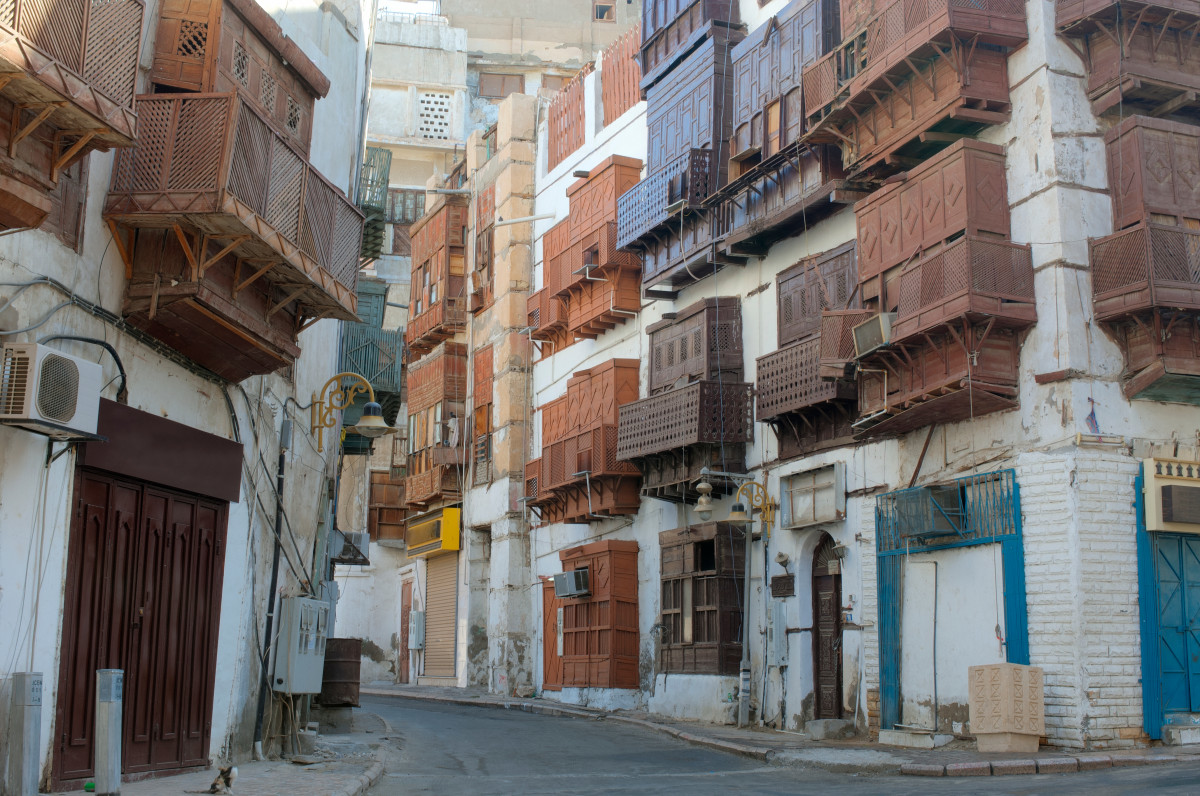
Recent Changes in Saudi Arabia
I specifically pointed out when I wrote this paragraph as things have changed quite significantly and most blog posts and opinions online are outdated.
Many people might not think that visiting Saudi Arabia would be for them due to the things they heard. The most common question I received before and during my visit was how was I even allowed to travel to the Kingdom of Saudi Arabia alone as a woman.
Let me explain. Even a year ago things have been slightly different in Saudi then they are now. Strict Islamic laws have been softened. Segregation isn’t a major issue anymore and as you probably heard – women can drive now.
Not so long ago women and men had to use separate entrances and weren’t allowed to hang out or dine together. Even standing in line together in a food court.
This is no longer the case in most places, which made things easier for work events, mothers with older sons and simply friends.
What surprised me, however, is that many women told me that they still prefer to go to places exclusively for women, so they can relax and remove their headscarves.
While women are not legally obliged to wear an abaya and hijab anymore, they wear them for religious reasons. The fact that it’s not compulsory by law anymore isn’t changing anything for many of them.
It isn’t like in Iran where most women dislike wearing headscarves and lonely fit overcoats. In Iran women wear them on the very edge of the head and the minute they can they remove it all and underneath there’s a tight and short dress. This doesn’t happen in Saudi.
Many women chose to wear nib which covers the whole face without the eyes. It’s not sexist and against their rights as many Westerners tend to say. If you talk to many Saudi women you’ll understand that most don’t feel restricted – it gives them a sense of privacy.
You’ll naturally find some liberal Saudis who will willingly wander around in jeans, but it’s not a regular appearance.
Common Misconceptions:
It’s worth mentioning that women were never technically forbidden to travel around the country and abroad, they just needed permission from their guardian (father, brother, husband, uncle or any men from the family).
It was more of a cultural norm, but many families have always allowed women to travel and actually encouraged them to do so.
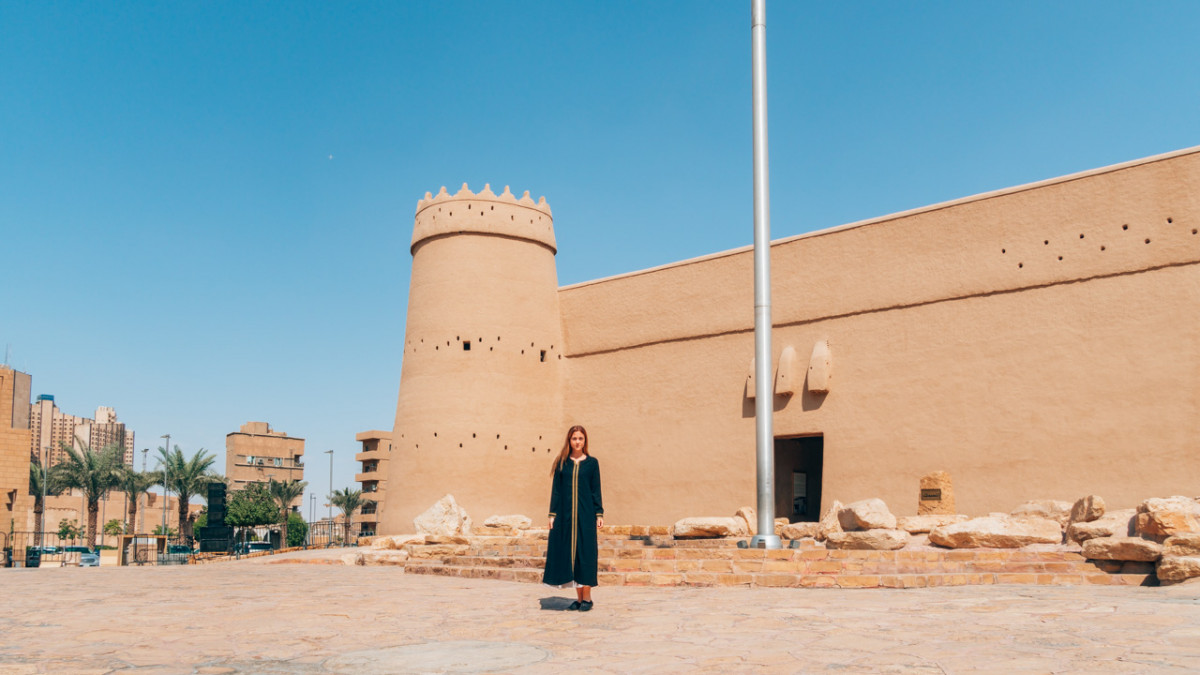
Is It Ethical to Travel to Saudi Arabia?
I don’t think I need to tell anyone about human rights violations happening in the country – it’s all over the news and naturally many of you asked about it straight away.
What I personally find difficult with traveling to countries like Saudi, Iran, Eritrea, or some I haven’t been to like North Korea, Syria, Myanmar, Nauru; is that many would like to boycott traveling there because of it. I highly disagree.
Simply because if we take what we see on the news and what governments do we’d be boycotting almost whole world – USA, Australia, Poland, Mexico, Ethiopia included, just to name a few.
I’m saying this from a perspective that I definitely don’t agree with the politics of my home country and my adopted country as well – what doesn’t mean that you cannot mean awesome people in both and discover the beauty of the place as a visitor.
My experience as a visitor to Saudi Arabia was obviously limited because I haven’t spent months exploring it, plus I’m aware that visitors’ experience is usually different than the life of locals.
I’m well aware that Saudi now isn’t what it used to be even a year ago, but let’s talk about now, as that’s what matters.
That said I think it’s surely worth going to Saudi Arabia. There’s so much almost untouched natural beauty of the country that you can easily spend a month there.
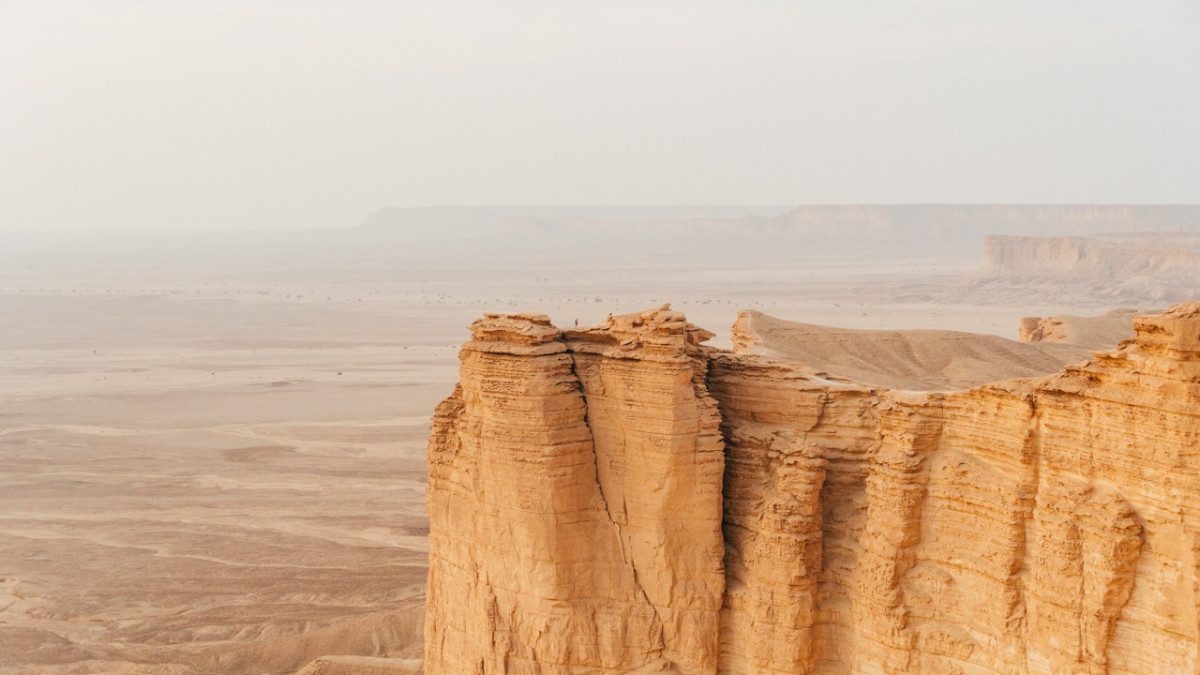
How to Behave in Saudi Arabia
Tourists aren’t a usual appearance in Saudi, so be prepared for questions ‘who do you work for’ or ‘how long you’ve been living in Riyadh for’.
Riyadh does have a big expat community, so while it’s no unusual to spot a foreigner, no one will assume you’re just a tourist. Including foreigners who travel to Saudi for business.
I had the privilege of spending a day with local girls and guys and learning a lot about their culture and how their lives truly look like – and let me tell you this: Saudi people are extremely welcoming and intelligent.
Most of the locals and expats whom I spoke to enjoy living in KSA and they do travel a lot and many of them lived elsewhere. In fact, I had a long chat with the girls on pros and cons of many things.
Before you travel to Saudi keep one thing in mind: Saudi Arabia is very religious and therefore most people you’ll meet will be religious. Be respectful of their religion and culture.
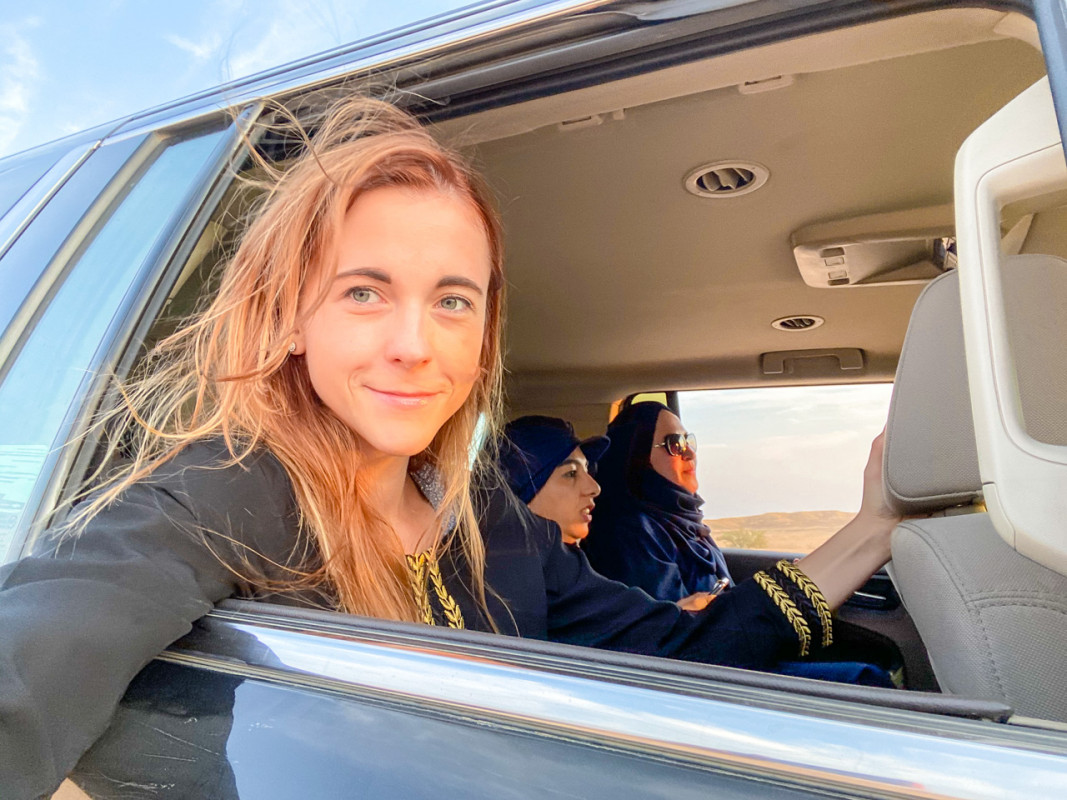
Solo Female Tips for Traveling to Saudi Arabia
1000 times yes. Everywhere I went I felt extremely safe. In fact, Saudi girls I met were telling me that one of the reasons they wouldn’t want to live elsewhere was because in Saudi they can go on the street in the middle of the night and feel safe, which isn’t a norm in other spots, US included.
Many of you messaged me regarding the abaya and were stunned to see that I didn’t wear a headscarf in my photos . Wearing an abaya and headscarf isn’t compulsory by law, it’s more of a cultural thing.
The only thing asked from visitors is to dress modestly, but if you don’t want to feel out of place buy an abaya before your visit. I got mine on Amazon.
If anyone feels offended by this and dare to say that no one should tell me what to wear, think of it logically: you wouldn’t wear what you wore to Burning Man at the Vatican.
You wouldn’t wear a bikini to parade it in a European city (you’d actually get fined for it in Venice), so simply be respectful to local women. Not all of them want to remove their headscarves – I met many who wouldn’t do it for religious reasons.
You don’t have to worry about stares and catcalling in Saudi Arabia, unlike in some other Muslim countries I’ve visited. Men are very respectful and polite to women.

Extra Tips for Visiting Saudi Arabia
1) Saudia Arabia never sleeps
Saudis are definitely night owls. It’s perfectly normal to go shopping at 11 pm and parties tend to start after midnight.
It’s super safe to wander around at night, even as a woman, and that’s not just my opinion but what was I told by local women.
2) There’s Prayer Time a few times a day
When planning your time exploring keep in mind that things will suddenly close for prayer. Shops and restaurants included.
In Riyadh, most malls are opened at 9 am-12 pm and 4 pm-11 pm, but when I went around 5 pm most shops were closed. They opened about half an hour later after the prayer time ended.
3) Saudi is a Muslim country, so rules apply
Naturally, as it’s a religious Muslim country drinking alcohol is forbidden. Drugs are a death sentence, so don’t try to do anything stupid.
PDA is also not allowed, similar to Dubai, Qatar, Iran and many other places.
4) Weekend is Friday and Saturday
Remember that just like in any other Muslim country, Friday and Saturdays are weekends. Everything is usually closed on Fridays.
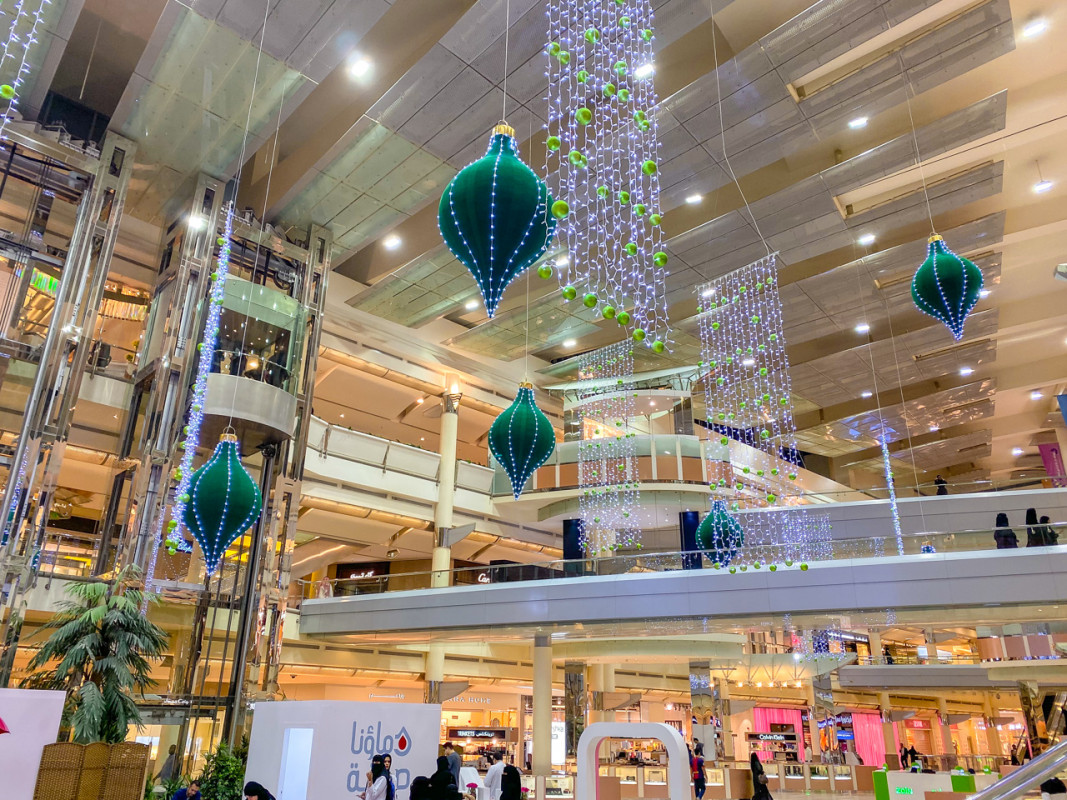
How to Get a Visa to Saudi Arabia
E-visa is finally available through their official website . You can apply for a visa by filling your passport information, uploading regular (2×2) passport photos.
While you don’t need to provide your flight information apart from the port of entry, the system asks you which hotel you’ll be staying in first and when will you travel. In my case, I actually put a different hotel as I wasn’t sure where will I stay and it was never an issue.
You’re also required to pay for the visa online. E-visa to Saudi Arabia costs 440 Saudi Riyals (about $120).
You need to print this visa before boarding your flight, as both airlines and immigration officers upon arrival will ask you to present it to them.
MORE ON: How to Get an eVisa to Saudi Arabia
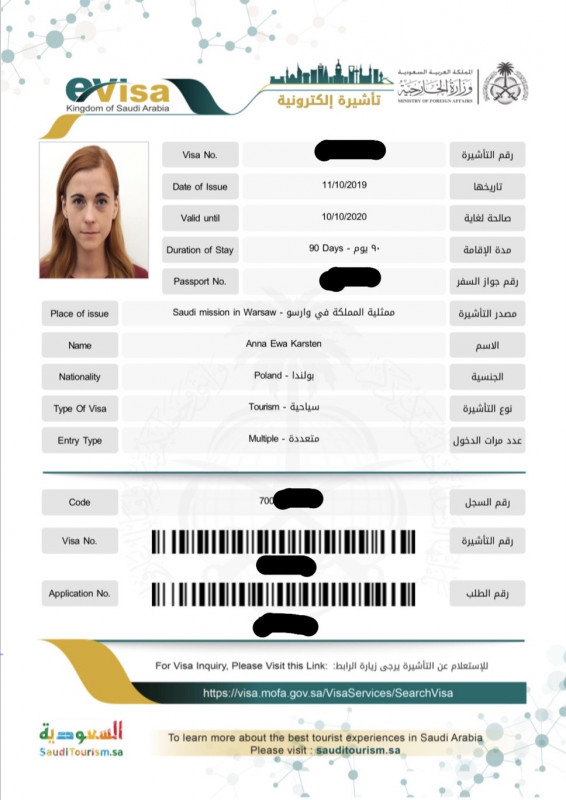

How to Get to Saudi Arabia
Traveling to Saudi Arabia is very easy as there are many airports around the country, all operated by major and respected airlines.
Your best bet would be getting a flight to either Riyadh (the capital) or Jeddah. I flew in with FlyDubai and left with Saudia Airlines.
While the first one was a typical budget airline, Saudia was great and affordable, so I would recommend it.
One tip: I was going to revisit Lebanon after my Saudi trip and fly back to Europe with Qatar Airlines from Beirut. As I opted against it due to the situation in Lebanon at the time, I was unable to change this flight from within Saudi as any Qatar-based websites are blocked. That said, I had to call my husband to do it for me from Europe. Just something to keep in mind.
Cost and Money in Saudi Arabia
Exchanging money and taking more cash from the ATM isn’t a problem in Saudi Arabia. All of my cards from various countries worked just fine.
Saudi Arabia isn’t as expensive as many think it might be. A standard hotel is usually $100 for a regular double room. You should expect to pay about $5 for lunch and $10 for dinner at the restaurant.
Keep in mind you’ll be using Uber and Taxis a lot because Saudi Arabia isn’t designed for pedestrians. Especially in Riyadh, you cannot just walk around anywhere apart from Embassy district.
Internet and SIM cards in Saudi Arabia
I didn’t need to purchase a SIM card for Saudi Arabia, because my T-Mobile International plan worked great. It was actually faster in Saudi Arabia than in some parts of the US, and definitely way faster than in Europe.
If you don’t have an international plan you could get Mobily SIM with 10 GB internet for about 150 SR ($40).
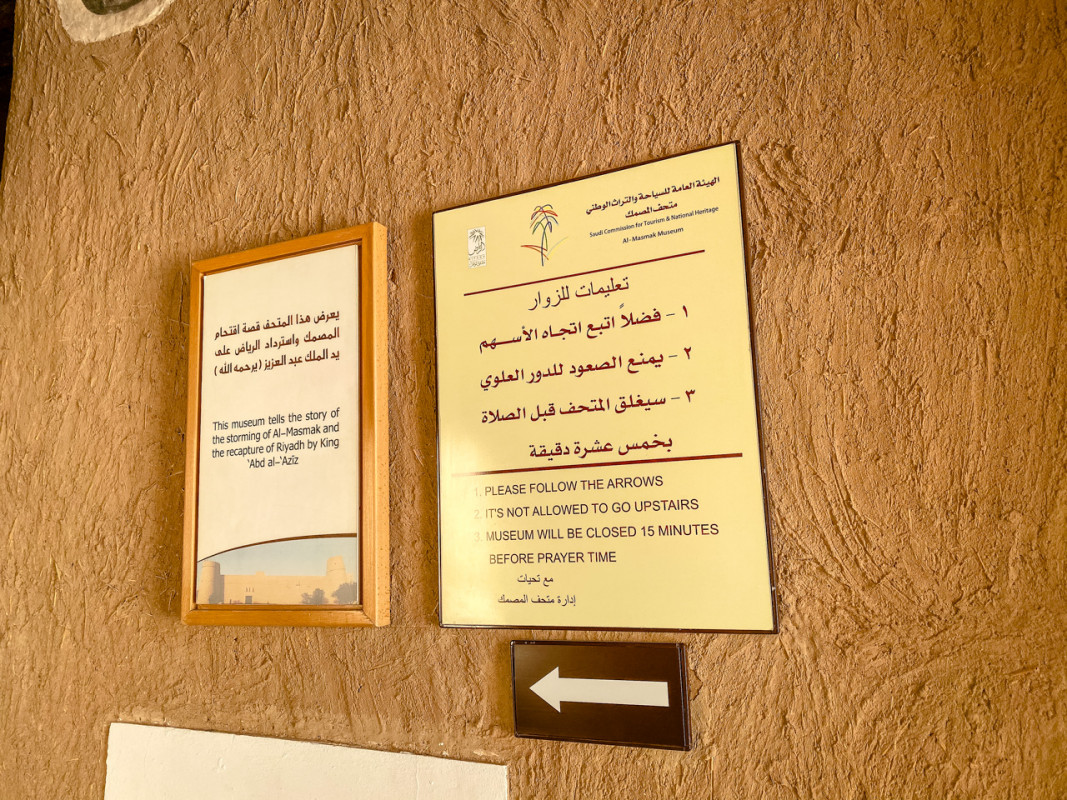
Accommodation in Saudi Arabia
You can travel and book hotel rooms as an unmarried couple these days. The only issue is when you’re a gay couple who wants to stay together because homosexualism is illegal in Saudi.
As a woman, don’t get too excited about a hotel pool. Pools are exclusively for men, even in most luxury hotels. While you can go see the pool, you cannot get in.
I can recommend a few places to stay, but it’s really tough to find a bad hotel to stay in Saudi Arabia.
In Riyadh, Ritz Carlton is “the” hotel to visit as it’s simply incredible inside. Even if you’re not staying there, take a look inside and come for some tea.
For those not willing to pay so much, Centro Olaya by Roatana is a good alternative. It’s a luxury hotel with a good restaurant and rooftop.
Do you have any questions about traveling to Saudi Arabia as a woman? Or maybe you’re interested in reading my tips for visiting other places in the Middle East like Jordan , UAE or Lebanon ?
Share this:
Anna Karsten is a travel blogger, journalist and psoriasis advocate. She has been traveling the world for the last 15 years - visiting over 100 countries and living on 5 continents. Anna has been featured in The New York Times, The Daily Mail, Forbes and more.
Similar Posts
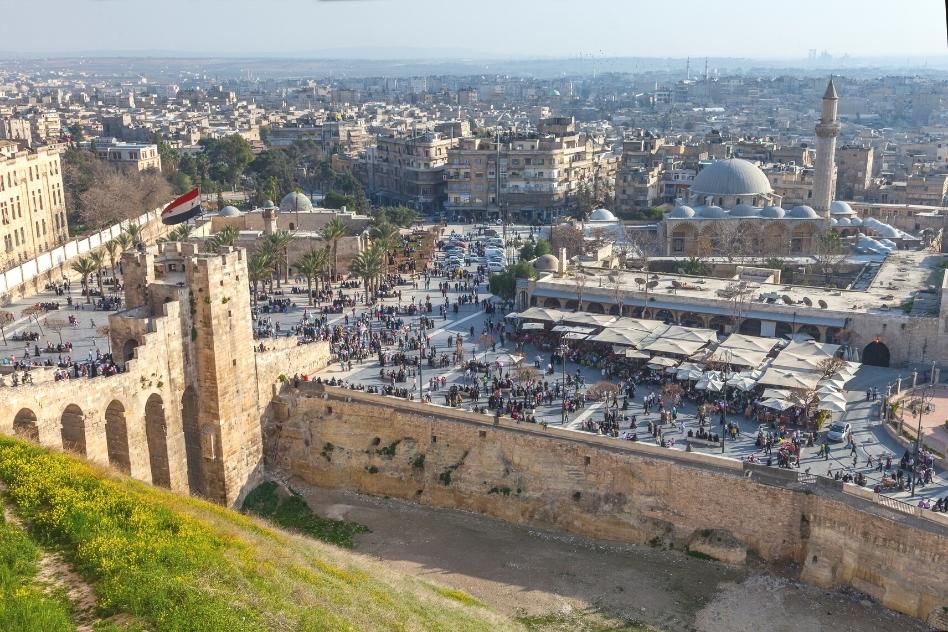
How to Travel to Syria as a Tourist
Last Updated on Mar 30, 2024 Can you visit Syria as a tourist? Yes, you can! Many people get…
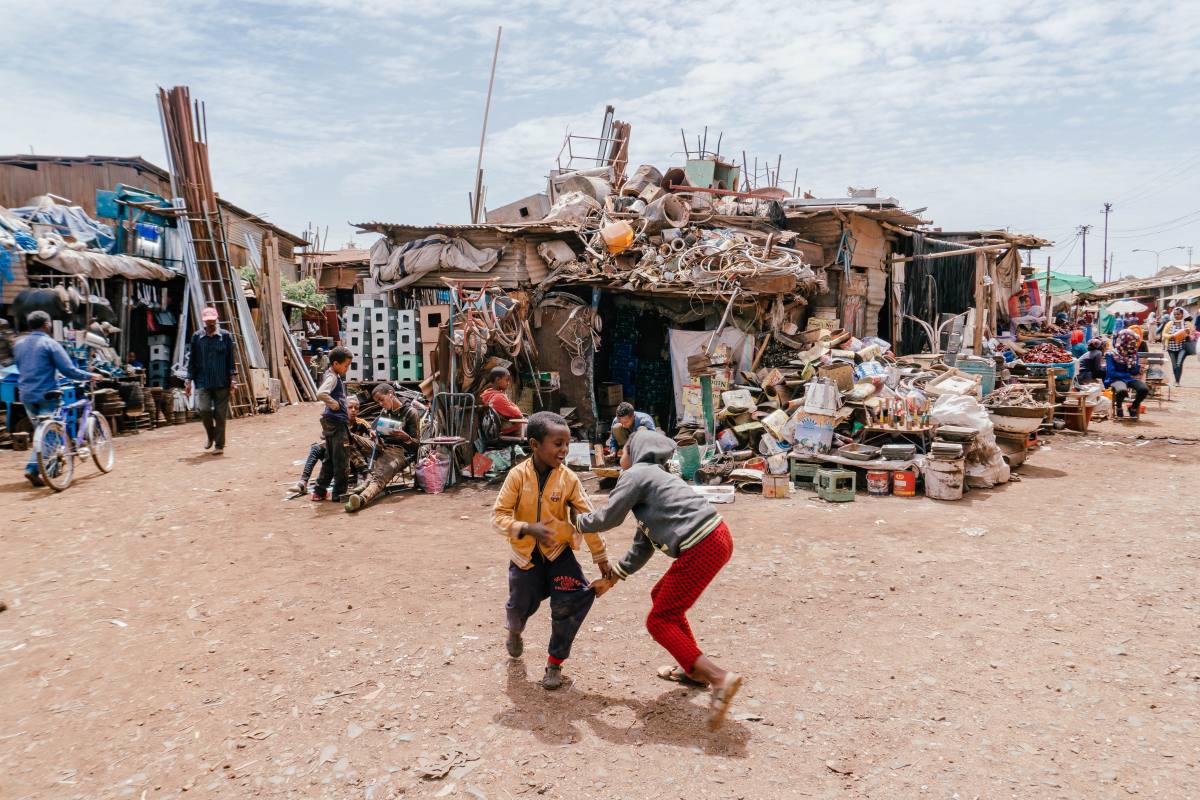
Eritrea Tourism Guide: How to Travel to Eritrea
Last Updated on Dec 21, 2021 Eritrea remains one of the least visited countries in the world for a…
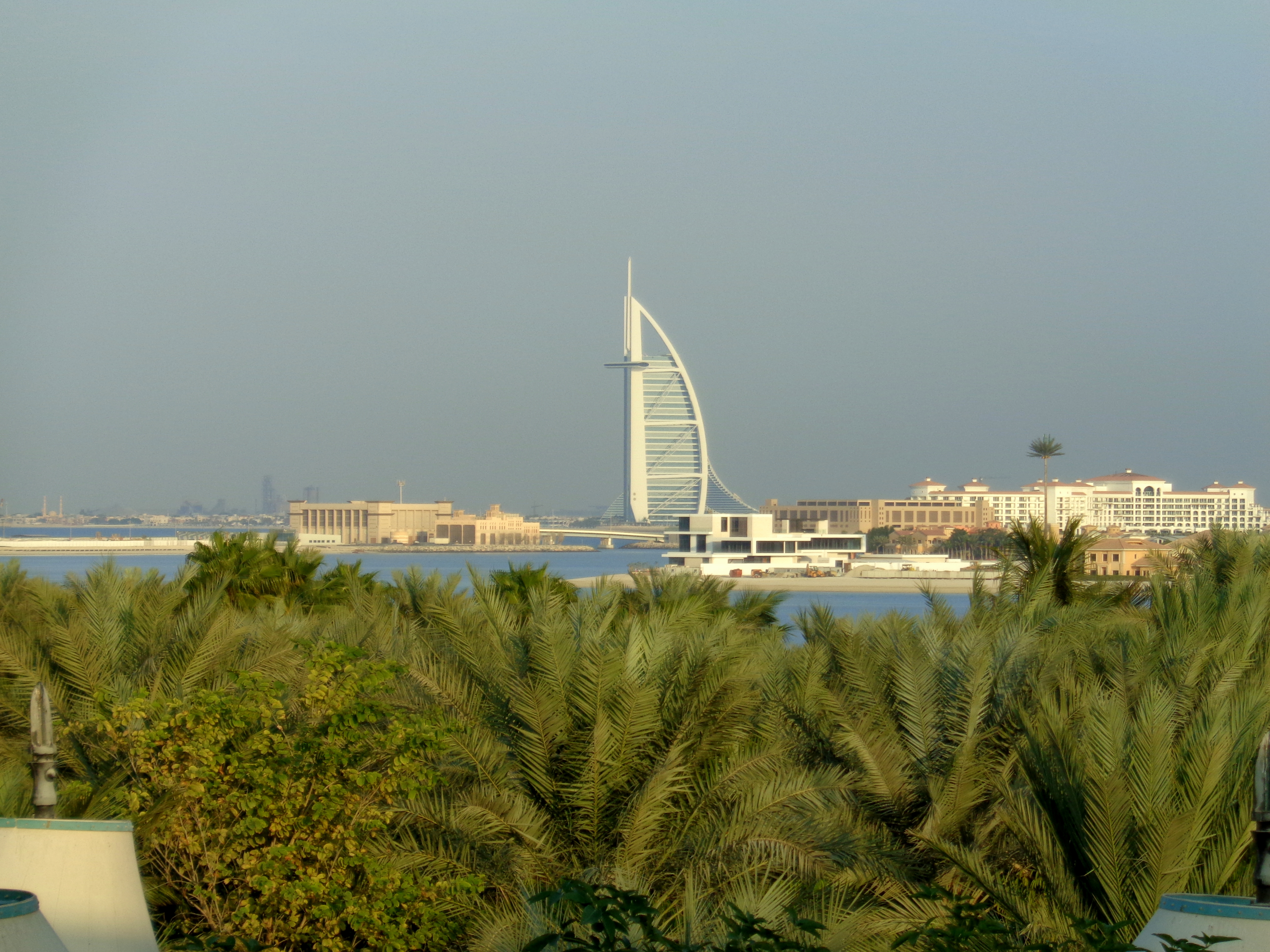
Is Dubai Expensive To Visit? – Guide to Luxury on a Budget
Last Updated on Aug 24, 2024 The first thing that comes to mind when you think about Dubai is…
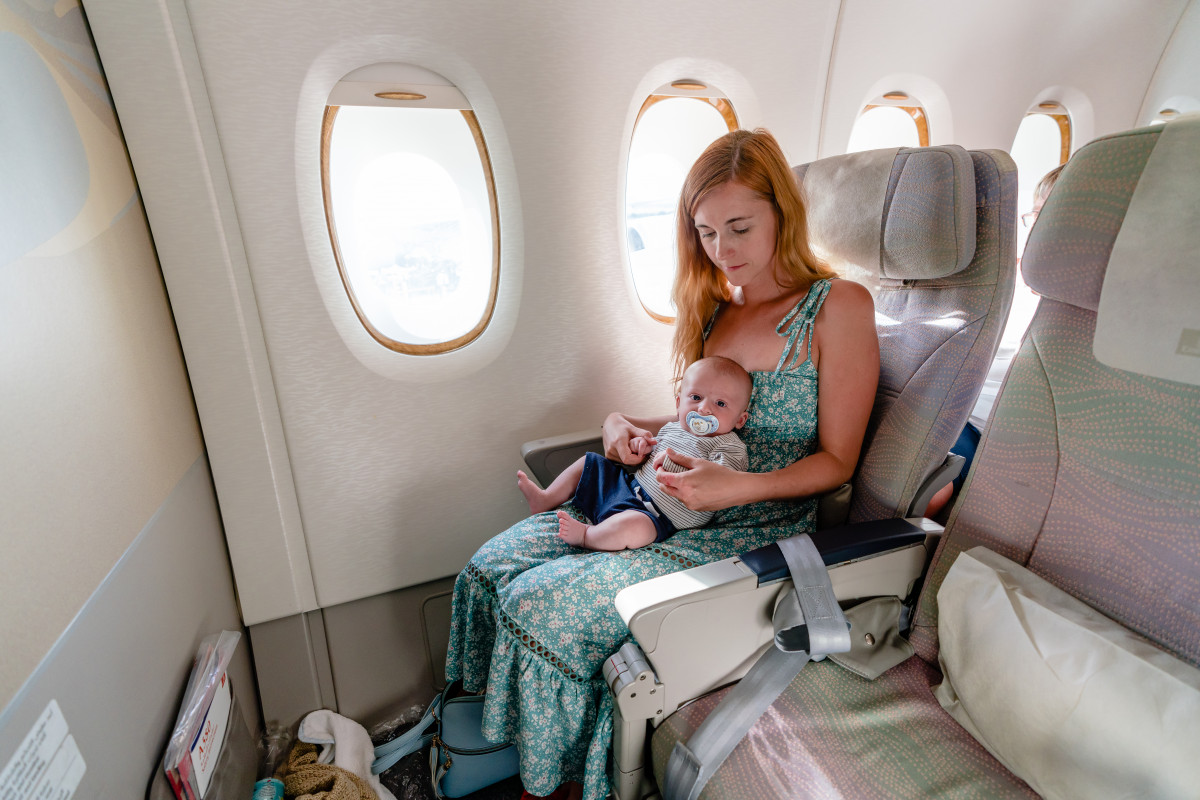
Flying with a Toddler or Baby on Emirates
Last Updated on Feb 23, 2024 Is Emirates a good airline to fly with a baby or toddler? Emirates…

Photos from Visiting Tribes in South Sudan
Last Updated on Jan 25, 2022 While driving around South Sudan I managed to meet 4 different tribes. Only…

Is Lebanon Safe to Visit as a Solo Female?
Last Updated on Jun 30, 2023 Should I Go to Lebanon? Is Lebanon Safe? – are the most common questions…
Interesting; I will probably go in June. I read that in conjunction with the e-visa introduction, foreign women were merely allowed to wear a looser, Persian-style hijab. But you’re saying there is no hijab law for local women as well anymore? Did you see any with Persian-style or without one entirely?
Hijabs are not legally required – neither for foreign visitors, not for local women. I’ve never worn one. I’ve seen many women without one, but also women who wore a full-on burqa especially in malls. In small towns you might feel more comfortable covering your head not to stand out too much, but in Riyadh, Jeddah, Al Ula there’s really no need for it.
This is really useful! I’ve always been unsure about visiting countries like this but it actually looks like it could be a lot of fun now! I’ve definitely always wanted to visit the Middle East and would love to see places like Oman and Qatar as well 🙂
It means all hotel accommodation seems like luxury. Wow!
Thank you for this quite informative and reassuring article. On my first trip to Jeddah now and reading this made me feel very confident I will have a good time.
How long does it take to get an e-visum? Are there organized trips for sightseeing in Riyadh?
Leave a Reply Cancel reply
Your email address will not be published. Required fields are marked *
Notify me of new posts by email.
- Newsletters
- Help Center
- Weekend Things to Do
- The Monica Pearson Show
- Politically Georgia
- Tour Championship
What it’s like to travel as a woman in Saudi Arabia
Saudi Arabia is the largest country in the Middle East — and one of the most mysterious. After all, most travelers were not allowed to visit for decades until 2019, the year the Kingdom opened its doors to tourists from 49 countries, including the United States.
This richly diverse country has also endured its share of controversies, as well as a reputation for treating women as second-class citizens who must cover their bodies (including their faces) from head to toe.
I have to say, I had plenty of preconceived notions about visiting Saudi Arabia before I hopped on my initial flight from Paris to Riyadh, the country’s thriving capital. But what it was really like for me to travel to Saudi Arabia is a lot different than what you might surmise based on the news.
I visited Saudi Arabia in late 2019 and would have gone back by now if not for the COVID-19 pandemic. I’m hoping to go again, and there are plenty of reasons why anyone should go if they have the chance.
People are friendly
I didn’t know how it would feel being a very white, very blond woman surrounded by strangers that share a culture unlike my own. I even worried I would be treated harshly when I arrived, or that I would feel threatened or uneasy walking or dining out without a hijab.
However, my arrival served as an excellent reminder of something I already knew. People are people wherever you go, and Saudis are very much like everyone else around the world — happy, friendly and too busy with their own lives to worry about what you’re doing.
As I visited Riyadh’s striking hotels and landmarks, the winding streets of historic Jeddah, shopping malls and elsewhere, people smiled widely at me or didn’t look at me at all. Random women showed me their Instagram accounts on their phones, and people in shops were eager to draw me in for a sale.
A stranger in an antique store insisted I take a ring with me as a gift for visiting his country, all while beaming with pride. Someone in Jeddah handed me a cold bottle of water in the sweltering heat for no reason at all.
At one point during the trip, I noticed my private messages on Twitter were absolutely blowing up. This shocked me at first until I took the time to read them.
While a few Saudis politely invited me to convert to Islam, dozens of others asked me to meet them for dinner or tea. I didn’t feel comfortable doing so considering the circumstances, but it felt very real and genuine.
Abayas are optional for tourists
Speaking of the long flowing robes Saudi women wear, which are referred to as abayas, they are no longer required for foreign women visiting the country. Considering I visited Saudi Arabia on the day this news was shared in 2019, I brought an abaya with me but quickly packed it away in my luggage.
Women who visit today only need to meet the same dress code as men, which requires conservative attire and covered knees and shoulders. During my visit, I dressed as I normally do, wearing long dresses with light sweaters along with pants and tops. I never covered my head, and I never felt out of place.
Gender segregation is real, evolving
Gender segregation is probably the most noticeable cultural difference in Saudi Arabia, and it can be absolutely jarring. While the country has ended the use of separate restaurant entrances for men and women, the separation of sexes is still the norm even when not required.
As an example, men and women go through separate security lines in Saudi airports, and women are moved through last. I had a business-class flight home from Jeddah to New York City, which normally includes early boarding, but I was one of the last people on the plane.
One of the hotels I stayed in also had a men-only pool and a men’s spa, but no facilities like these for female guests.
This should change — and it is changing — in real time in Saudi Arabia. However, change takes time, and visitors should know they will encounter some gender segregation before they go.
Top ‘undiscovered’ landmarks
If you love traveling off the beaten path, Saudi Arabia is definitely the place to be. The old city center of Jeddah is captivating with its uniquely designed antique balconies, ancient sidewalks and curated shops selling everything from spices to intricately detailed clothing. The Islamic call to prayer rings loudly in the streets here five times per day, and it takes your breath away to hear it in such a historic and extraordinary place.
Meanwhile, the Kingdom Centre Tower in Riyadh is a sight to behold, and the views of the city from its skybridge are unbelievable.
Saudi Arabia is also brimming with UNESCO World Heritage sites, from the Al-Ahsa Oasis to the Al-Hijr Archaeological Site and the At-Turaif District in ad-Dir’iyah. These are all places you can see and experience before nearly anyone else you know gets there.
Luxury is everywhere
While Saudi Arabia offers travel options to fit any budget, luxury travel is an absolute must here. The fact is, there are so many exquisite hotels and resorts in the Kingdom already and plenty more currently in the works.
As an example, the capital city is home to name-brand luxury hotels such as the Four Seasons Hotel Riyadh at Kingdom Centre, the Fairmont Riyadh, the Al Faisaliah Hotel and The Ritz-Carlton, Riyadh.
Other notable and must-visit resorts dotted throughout the Kingdom include the InterContinental Taif, the Dar Al Tawhid InterContinental Makkah and the Rosewood Jeddah.
Malls featuring luxury brands are also all over the place. In fact, you can find all of the top stores here, including Victoria’s Secret, H&M, American Eagle, Zara, Gucci, Fendi and more.
The dining is amazing (even sans booze)
While alcohol is illegal in Saudi Arabia, that has the potential to change. Either way, the alcohol ban didn’t affect my trip at all, and you shouldn’t let it ruin yours, either.
Some restaurants I dined in featured extensive drink menus with mocktails that were both delicious and fun. In one case, a waiter brought a drink cart to our table before crafting the most delicious virgin smoked mojito I have ever tasted. It was much more than a drink; it was an entire show, and every drink he made required at least six or seven steps.
Food was fresh, delicious and varied throughout the country as well, and many of the cuisines offered fit in nicely with my pescatarian diet. I enjoyed Chinese and Lebanese food in Riyadh, plus plenty of freshly prepared seafood along the country’s coast. No matter what you like to eat, you will find it here.
The bottom line
Saudi Arabia is on a path toward rapid change, but it’s also a conservative kingdom with deeply rooted beliefs and cultural traditions. Some of the events I experienced there were slightly off-putting (like boarding my plane dead last), yet I didn’t let it bother me or ruin my trip. I also learned a lot and gained a greater understanding of this part of the world, which is something you can’t do unless you see it for yourself.
The fact is, visiting Saudi Arabia feels a lot like flying back in time to an entirely different universe with modern conveniences but Old World beliefs. I’ve never experienced anything else like it, and I cannot wait to visit again.
Looking for more adventures? Sign up for our Travel newsletter here .
About the Author

Credit: Courtesy RBH Group
- Share full article
Advertisement
Supported by
What It’s Like to be a Female Tour Guide in Saudi Arabia
Fatimah Al Zimam has introduced visitors from around the world to her country, which opened to nonreligious tourism in 2019. She discusses her favorite sites, driving a pickup truck and how her country is changing.

By Paige McClanahan
Paige McClanahan , a regular contributor to the Travel section, is writing a book about the tourism industry.
Fatimah Al Zimam likes to walk around in black leggings and casual tops, and she wears her curly hair loose and uncovered. She owns a silver GMC pickup truck, which she loves to take on solo drives across the Saudi desert. And she is passionate about her work: As a tour guide, she has introduced her country to visitors from the United States, France, Britain, Italy, China and beyond.
Ms. Al Zimam, 34, is a Saudi woman and she works for herself. She represents a profound transformation that’s underway in her home country, which has long been known as a deeply conservative place. Saudi Arabia’s opening to nonreligious tourists in 2019 is a major part of the ongoing shift, as are several important gains that women have been granted over the past half decade, though some restrictions remain.
But even with the recent changes, the country has continued to come under fire for its record on human rights , which may raise concerns among potential visitors. One travel index has ranked Saudi Arabia second-to-last in the world in terms of safety for L.G.B.T.Q. travelers.
But Saudi Arabia is betting big that tourists will come: The government is investing $1 trillion in the industry over 10 years, with the aim of attracting 100 million visitors annually by 2030. It’s all part of an effort to reduce the country’s reliance on fossil fuels.
“If there is no oil, we don’t have anything. So now there are a lot of projects to promote agriculture, solar energy production — and tourism, too,” Ms. Al Zimam said.
I first met Ms. Al Zimam on a recent solo trip to Saudi Arabia, when I hired her as my tour guide in Riyadh, the capital, and spent a day riding shotgun in her pickup truck. A few weeks later, I reached her on a video call at her apartment in Jeddah, on Saudi Arabia’s Red Sea coast. She was eager to tell me about her favorite places to take first-time visitors, and how Saudi men react when they see her without a long robe, or abaya.
Our conversation has been edited and condensed for clarity.
What kind of reactions have you seen among Saudis since the country started issuing standard tourist visas?
The vast majority of people in Saudi Arabia are very generous with tourists. I’ve seen this even in remote villages, where people tend to be very religious — they’re really helping tourists, especially hitchhikers and cyclists who sometimes just appear out of nowhere.
And look at a place like Al Ula , in the northwest, where you see so many tourists now. At first, some local people might have been skeptical about the crowds, the noise, the visitors. But then they started to see the jobs, the money, the extra work that they could find through tourism — they became aware of the opportunities. Now, they are very happy with tourism.
The government has been spending a lot of money to turn the ancient city of Al Ula into a tourist destination . Is that a place that you would recommend to visitors?
Al Ula is the best destination in the world for me. The Royal Commission has done a great job of developing the sites around there, and they’re still doing excavations, finding new things. Visitors love the ancient tombs in Mada’in Saleh, which is nearby. There’s so much else. Al Ula is full of rock inscriptions. Wherever you walk, you can find them.
And I love to bring people to Hail, also in the north. Hail is a historic area — Lawrence of Arabia spent a lot of time there — and the landscape is stunning. The sand dunes, the red mountains, and just the beautiful shapes of the rocks and rock inscriptions. You can be driving and driving, then suddenly you come across a small oasis, a cluster of palms between the mountains.
Are there many other women tour guides in Saudi Arabia?
There are many, many female tour guides, and even more in training. In the class that I took to become a licensed guide, there were twice as many women as men, and I think that’s pretty common.
A lot of potential female visitors might have questions about how to dress in Saudi Arabia. I know you don’t wear a head scarf or an abaya . Did you stop doing that as soon as the rule changed a few years ago?
It was gradual for me. At first, I would still wear an abaya and hijab in the city, but not if I was out in the desert or in the mountains. But then I moved to Riyadh for work and I found myself more comfortable and happier without an abaya, as long as I was still dressed modestly. Now, I don’t wear an abaya or hijab. The only exceptions are if I’m going somewhere official — the courthouse or a police station — or if I’m going to a mosque. If I’m going to pray, I need a scarf.
Some people might stare because it’s still kind of a new thing to see, but they respect my choice. I once had an Uber driver in Al Jouf who told me: “Look at me, with my beard and my mustache. I’m a man, but I married the woman my mother chose for me. But look at you, without an abaya: You’re a woman, and you made your choice. You’re braver than me.”
What do you advise women visitors in terms of how to dress?
Some Saudis will recommend that women visitors wear a scarf. But why? It’s OK not to. In rural areas, they might stare at you, but I find that, even there, most people are welcoming. And the people who aren’t welcoming won’t say anything because there is no longer a rule about it. I always feel safe, even though I travel alone and without an abaya. Come and I’ll take you to the Red Sea, and you’ll see — there, you can wear a bikini. The only exception is if you visit a mosque. There, it’s mandatory to cover your legs, and for women to wear long sleeves and a scarf.
What do you like to do when you’re not guiding tours?
I love traveling around Saudi Arabia, and I did it even before I started working as a tour guide. I’ve also been a rock climber since 2019, and I love going to Tanomah , which is where I first learned to climb.
I know it wasn’t that long ago that Saudi women were granted the right to drive . What do people think when they see you behind the wheel of your truck?
I must admit that I do love the reactions of people seeing me driving. Sometimes in rural places, people follow me, just because they’re curious. “Is this really a woman? Is it not just a man with curly hair?” But then they see I’m a woman and they call me, “My daughter! My daughter!” And they ask if I’m a tourist.
Have you ever traveled outside your home country?
I’ve traveled around the Gulf and to Jordan, but my first time outside the Middle East was last year, when I went to the U.K. and then to Switzerland with the Ministry of Tourism. On that trip, we spent one week at a tourism school in Montreux. The ministry sent thousands of people to the best tourism schools in Europe. I was in the last group.
What’s your next gig?
Summer is the low season for tourists here. So I’m working on my book, which is both a memoir and a travel guide to Saudi Arabia. I’m planning to publish travel secrets about places around the country. I have it all in my head, and now I will write it down.
Follow New York Times Travel on Instagram and sign up for our weekly Travel Dispatch newsletter to get expert tips on traveling smarter and inspiration for your next vacation. Dreaming up a future getaway or just armchair traveling? Check out our 52 Places to Go in 2023 .
Open Up Your World
Considering a trip, or just some armchair traveling here are some ideas..
52 Places: Why do we travel? For food, culture, adventure, natural beauty? Our 2024 list has all those elements, and more .
D enver: The city is undergoing a rebirth , with a newly refreshed Union Station and the gradual reopening of the mile-long, pedestrian-friendly 16th Street Mall to go along with views of the snow-capped Front Range.
Amtrak’s Empire Builder Route : Most people who take the 4,000-mile journey from Chicago to Seattle will just watch the heartland whiz by. Our writer hopped off to explore six places you might otherwise miss .
Provincetown, Mass.: Located at the tip of Cape Cod, P-town (as locals call it) has overlapping — and sometimes competing — identities : one of America’s oldest art colonies, nature preserve, thriving L.G.B.T.Q. resort and historic Portuguese fishing village.
Lake Como, Italy: Stars like George Clooney frequent this scenic corner of northern Italy, but you might be surprised by how affordable it can be. Here’s an insider’s guide .
South of France: Horses, bulls and birds of all types live among the pink marshes of the Camargue, a rugged landscape shaped by the relentless push and pull of sea and river.
- Search Please fill out this field.
- Manage Your Subscription
- Give a Gift Subscription
- Newsletters
- Sweepstakes
Travel Tips
- Travel Photography
- Travel Budgeting + Currency
- Celebrity Travel
- Cool Gadgets
- Customs + Immigration
- Ground Transportation
- Mobile Apps
- Packing Tips
- Responsible Travel
- Travel Agents
- Travel Etiquette
- Travel Trends
- Travel Warnings
Explore more in
Security Alert May 17, 2024
Worldwide caution.
- Travel Advisories |
- Contact Us |
- MyTravelGov |
Find U.S. Embassies & Consulates
Travel.state.gov, congressional liaison, special issuance agency, u.s. passports, international travel, intercountry adoption, international parental child abduction, records and authentications, popular links, travel advisories, mytravelgov, stay connected, legal resources, legal information, info for u.s. law enforcement, replace or certify documents.
Before You Go
Learn About Your Destination
While Abroad
Emergencies
Share this page:
Saudi Arabia
Travel Advisory January 24, 2024
Saudi arabia - level 3: reconsider travel.
Updated after periodic review to provide information on the risk of arrest due to social media use and the importation of prohibited items.
Reconsider travel to Saudi Arabia due to the threat of missile and drone attacks. Exercise increased caution in Saudi Arabia due to terrorism, the risk of arrest based on social media activity, and importation of prohibited items. Some areas have increased risk. Read the entire Travel Advisory.
Do not travel to the following locations due to the threat of missile and drone attacks and terrorism :
- Within 50 miles of the Saudi-Yemen border, as well as the cities of Abha, Jizan, Najran, and Khamis Mushayt;
- Abha airport;
- Qatif in the Eastern Province and its suburbs, including Awamiyah.
Country Summary : U.S. government personnel under Chief of Mission responsibility must adhere to the above travel restrictions. As such, the U.S. government has limited ability to provide emergency services to U.S. citizens in these locations.
Missile and drone attacks perpetrated by Iran and Iran-supported militant groups have occurred as recently as September 2023. The Islamic Republic of Iran has in the past supplied Yemen-based Houthis and regional proxy groups with weapons to conduct destructive and sometimes lethal attacks using drones, missiles, and rockets against a variety of Saudi sites, including critical infrastructure, civilian airports, military bases, and energy facilities throughout the country, as well as vessels in Red Sea shipping lanes. Past attacks were aimed at targets throughout Saudi Arabia including Riyadh, Jeddah, Dhahran, Jizan, Khamis Mushayt, the civilian airport in Abha, Al Kharj, military installations in the south, as well as oil and gas facilities.
Debris from intercepted drones and missiles has also represented a significant risk to civilian areas and populations in the recent past. Militant groups have threatened to conduct attacks against locations in Saudi Arabia. U.S. citizens living and working near military bases and critical civilian infrastructure, particularly near the border with Yemen, are at heightened risk if missile, drone, or rocket attacks reoccur.
Terrorism continues to be a concern in Saudi Arabia. Attacks can occur with little or no warning. Past attacks have targeted tourist locations, large gatherings, transportation hubs, markets/shopping malls, and local government facilities. Terrorists are also known to time attacks around major holidays and/or in response to military operations. Terrorists have targeted both Saudi and international interests, mosques and other religious sites (both Sunni and Shia), and places frequented by U.S. citizens.
Be advised that social media commentary – including past comments – which Saudi authorities may deem critical, offensive, or disruptive to public order, could lead to arrest . This may include posting, re-posting, or liking comments about Saudi institutions, policies, and public life. U.S. citizens have been convicted for social media activity under Saudi laws concerning cybercrime, terrorism, and disrupting public order. Punishment for social media activity has included prison sentences of up to 45 years in some cases. Saudi courts do not necessarily consider the timeframe of the posts or the location from which they were made to be material to these cases.
The importation of drugs (including marijuana), drug paraphernalia, alcohol, weapons, pork, or any materials that could be considered pornographic or suggestive, is prohibited. Penalties for drug possession, consumption, and trafficking are severe by U.S. standards. An extensive list of banned items is available on our Saudi Arabia country information page .
Due to risks to civil aviation operating within the Persian Gulf and the Gulf of Oman region, including Saudi Arabia, the Federal Aviation Administration (FAA) has issued an advisory Notice to Air Missions (NOTAM). For more information U.S. citizens should consult the Federal Aviation Administration’s Prohibitions, Restrictions and Notices .
Read the country information page for additional information on travel to Saudi Arabia.
If you decide to travel to Saudi Arabia:
- Visit our website for information on travel to high-risk areas .
- Stay alert in large crowds and/or locations frequented by foreign nationals.
- Obtain comprehensive medical insurance that includes medical evacuation.
- Review local laws and conditions before traveling, including our Saudi Arabia country information on arrest notification and the Department of State’s general information on arrests of U.S. citizens abroad .
- Enroll in the Smart Traveler Enrollment Program ( STEP ) to receive Alerts and make it easier to locate you in an emergency.
- Follow the Department of State on Facebook and Twitter .
- Follow the U.S. Embassy in Saudi Arabia on Facebook and Twitter .
- Review the Country Security Report for Saudi Arabia.
- Visit the CDC page for the latest Travel Health Information related to your travel.
- Prepare a contingency plan for emergency situations. Review the Traveler’s Checklist .
Yemen Border, Abha airport, and Qatif in the Eastern Province and its suburbs, including Awamiyah – Level 4: Do Not Travel
Militants in Yemen have attacked Saudi border towns and other sites in Saudi Arabia with armed drones, missiles, and rockets . Civilians that are near the border with Yemen are especially at risk. Terrorist groups continue plotting possible attacks in Saudi Arabia, including in Qatif.
The U.S. government has limited ability to provide emergency services to U.S. citizens within 50 miles of the Saudi-Yemen border as U.S. government personnel and their families are restricted from travel to this area.
Visit our website for information on travel to high-risk areas
Embassy Messages
View Alerts and Messages Archive
Quick Facts
A valid passport is required for U.S. citizens to enter or exit the Kingdom of Saudi Arabia. A minimum of six months’ validity beyond the date of travel is recommended.
One page required for entry stamp.
Required for certain visa classes
More than 16,000 USD must be declared. Customs details are here .
Embassies and Consulates
The normal work week in Saudi Arabia is Sunday through Thursday.
U.S. Embassy Riyadh Abdullah Ibn Hudhafah As Sahmi Street Roundbaout no. 9, Diplomatic Quarter Riyadh, Saudi Arabia Telephone: (966) (11) 488-3800 Emergency Telephone: (966) (11) 488-3800 Fax: (966) (11) 488-7670 [email protected]
U.S. Consulate General Jeddah Al Safa Street, Al Muhammadiyah District, near the new American School building. Jeddah, Saudi Arabia Telephone: (966) (12) 220-5000 Fax: (966) (12) 220-5093 [email protected]
U.S. Consulate General Dhahran Off King Saud bin Abdulaziz Road, at the corner of Salaheddin al Ayoubi Street and Prince Fahd bin Sultan bin Abdulaziz Street, Dhahran, Saudi Arabia Telephone: (966) (13) 839-5700 Emergency Telephone: (966) (13) 839-5700 Fax: (966) (13) 330-6816 [email protected]
Destination Description
Learn about the U.S. relationship to countries around the world.
Entry, Exit and Visa Requirements
See the Embassy of Saudi Arabia’s website for visa information.
COVID-19 Requirements: There are no COVID-related entry requirements for U.S. citizens.
For residency permit-holders (iqama), an exit/reentry permit is required to leave Saudi Arabia as well as six month’s validity on your passport to request an exit/reentry permit.
- Saudi law requires that residency permit-holders carry their residency card (iqama) at all times while in the Kingdom. Failure to do so could result in a fine of 3,000 Saudi riyals and a jail sentence of six weeks.
- Females and minors may require a male guardian’s permission to leave the country, including U.S. citizens or dual-nationals.
- You must exit Saudi Arabia using the passport for the nationality corresponding to the one on which you entered Saudi Arabia.
Saudi law requires all Saudi citizens to enter and depart the country with a Saudi travel document. If you enter the country on a Saudi laissez-passer (temporary travel document), you may encounter difficulty leaving the Kingdom.
Saudi embassies do not have the authority to adjudicate citizenship claims or issue passports, but they may issue a laissez-passer for presumed Saudi citizens for whom citizenship has not been adjudicated, such as children of a Saudi parent or parents who were married outside of Saudi Arabia. Once admitted to Saudi Arabia on a laissez-passer, the traveler must obtain a Saudi passport before leaving the country. Saudi nationality is not conferred quickly or easily, and the processing time for a Saudi passport in these cases has often been six months or years in some cases. Obtaining a U.S. passport will not help, as you will not be able to leave Saudi Arabia without an exit visa which will not be granted if you entered as a Saudi citizen.
The Department strongly recommends that U.S. citizens enter Saudi Arabia on a U.S. passport and Saudi visa, and not a laissez-passer.
Length of Stay: Bearers of tourist visas are generally admitted for a 90-day stay and may not remain in the Kingdom more than 180 days in a twelve month period. Carefully check your visa validity and length of stay granted, and clarify any questions on permitted length of stay with Saudi immigration officials on arrival. Dates are calculated in accordance with the Hijri calendar, which differs from the Gregorian calendar.
If you overstay your visa, you could face significant fines, detention, and/or deportation, and a ban from returning to Saudi Arabia.
The U.S. Embassy is unable to intercede, reduce fines, or prevent incarceration if you violate Saudi law.
Travel Bans: When placed under a travel ban, you cannot exit the country, even if you are a U.S. citizen or a dual U.S.-Saudi citizen. Travel bans are rigidly enforced and can take months or even years to resolve. Only Saudi Arabian authorities and sponsors can remove travel bans.
The government may issue travel bans on people who are/have:
- charged with criminal offenses;
- under investigation;
- involved in financial or labor disputes;
- failed to report to work according to the terms of the contract (absconded);
- unpaid debts or who have passed bad checks.
The list above is not exhaustive. Private Saudi citizens may also initiate travel bans against foreign citizens for various reasons.
Residency Permits: If you are seeking residency in Saudi Arabia, make sure you have all required legal documents authenticated before arriving. Neither the U.S. Embassy in Riyadh nor the U.S. Consulates General in Jeddah or Dhahran can provide this service.
You should have all U.S. issued documents authenticated by the Department of State Office of Authentications (202-485-8000) and attested by the Embassy of Saudi Arabia in Washington D.C.
Work Visas: If you plan on working in Saudi Arabia, you must obtain a work visa before you arrive. Foreigners working in Saudi Arabia are subject to the country’s sponsorship system, which concedes substantial legal authority over the worker to the employer. This can include the ability to prevent the employee from leaving the country. American citizens considering working in Saudi Arabia should carefully review the information about employment in the “Local Laws and Special Circumstances” section below.
If the visitor or business visa has been annotated “not permitted to work,” you are not allowed to legally work in Saudi Arabia. You risk substantial financial penalties, detention, deportation, and a ban from returning to Saudi Arabia if you work without legal permission. Additionally, without a work visa, there would be no legal grounds to pursue a case against an employer should a dispute arise.
HIV/AIDS: To obtain work and residence permits, you are required to obtain a medical report or physical examination confirming that you are free from contagious diseases, including HIV/AIDS and hepatitis. If you test positive for HIV/AIDS or hepatitis, you will not be allowed to work in the Kingdom. Saudi Arabia has not imposed HIV/AIDS or hepatitis travel restrictions on other categories of travelers. Please inquire directly with the Embassy of Saudi Arabia before you travel.
Vaccinations: Visitors to Saudi Arabia should check vaccination requirements on the Saudi Ministry of Health website.
Yemen Travel: The Department strongly advises U.S. citizens against travel to Yemen due to the ongoing conflict in that country. See our Yemen Travel Advisory for further information. A visa is required to enter Saudi Arabia, and Saudi authorities generally do not permit foreign citizens to enter Saudi Arabia using land border crossings from Yemen. The Embassy and Consulates General cannot provide assistance to U.S. citizens seeking to cross the Yemeni-Saudi border.
Safety and Security
The Department of State advises you to exercise increased caution when traveling to Saudi Arabia due to terrorism and the threat of missile and drone attacks on civilian targets. See the Travel Advisory for Saudi Arabia here .
Do not travel:
- Within 50 miles of the border with Yemen due to terrorism and armed conflict.
Terrorist groups continue plotting possible attacks in Saudi Arabia. Terrorists may attack with little or no warning, targeting tourist locations, transportation hubs, markets/shopping malls, and local government facilities. Terrorists have targeted both Saudi and Western government interests, mosques and other religious sites (both Sunni and Shia), and places frequented by U.S. citizens and other Westerners.
Houthis operating in Yemen have fired long-range missiles into Saudi Arabia, specifically targeting populated areas and civilian infrastructure; they have publicly stated their intent to continue doing so. Missile attacks have targeted major cities such as Riyadh and Jeddah, Riyadh’s international airport, Saudi Aramco facilities, and vessels in Red Sea shipping lanes. Rebel groups are also in possession of unmanned aerial systems (UASs or drones) which they have used to target civilian infrastructure and military facilities in Saudi Arabia. U.S. citizens living and working on or near such installations, particularly in areas near the border with Yemen, are at heightened risk of missile and drone attack.
On October 11, 2018 the Saudi General Authority for Civil Aviation issued a Notice to Airmen about threats to civil aviation and airports in Saudi Arabia posed by missiles and UASs launched from Yemen. For more information, U.S. citizens should consult the U.S. Government’s Defense Internet NOTAM Service (Type “OEJD” in the search field, then click “View NOTAMs,” then scroll down to W0438/18 and click to view).
The U.S. government has limited ability to provide emergency services to U.S. citizens in the following locations as U.S. government personnel and their families are restricted from travel to:
- Within 50 miles of the Saudi-Yemen border, including the cities of Jizan and Najran;
- Qatif in the Eastern province and its suburbs, including Awamiyah.
You can find additional details relating to safety and security in our Travel Advisory and Alerts and the website of the U.S. Mission in Saudi Arabia .
Crime: Crime in Saudi Arabia has increased over recent years but remains at levels far below most major metropolitan areas in the United States.
- You should be aware of your surroundings, keep valuables out of sight and secure, and travel with a companion, if possible.
- Some Saudi citizens who perceive that a foreigner is not observing conservative standards of conduct or dress have been known to harass, pursue, or assault that person.
- Even when released from detention, witnesses to criminal incidents may be prohibited from leaving the country until investigation of the incident is complete.
See the websites of the Department of State and the FBI for information on scams.
Victims of Crime: If you or someone you know becomes the victim of a crime, you should contact the local police at “999” and contact the Embassy in Riyadh or one of the Consulates in Jeddah or Dhahran.Remember that local authorities are responsible for investigating and prosecuting the crime.
See the Department of State’s webpage on help for U.S. victims of crime overseas .
The Department can:
- help you identify appropriate medical care;
- assist you in reporting a crime to the police;
- contact relatives or friends with your written consent;
- explain the local criminal justice process in general terms;
- provide a list of local attorneys;
- provide information on victim’s compensation programs in the U.S. ;
- provide an emergency loan for repatriation to the United States and/or limited medical support in cases of destitution;
- help you find accommodation and arrange flights home;
- replace a stolen or lost passport.
Domestic Violence: If you are the victim of any form of physical violence, including domestic violence, you should contact the Saudi police by calling “999”. In addition, victims of domestic violence can contact the Saudi National Domestic Violence Hotline by dialing “1919.” The Saudi Ministry of Labor and Social Development runs a network of shelters for women and children. Contacting the domestic violence hotline (“1919”) is the only way to access these shelters. The Saudi National Family Safety Program also runs a Child Help Line “116111” and can assist children in accessing Saudi social services.
When reporting domestic violence, it is imperative to get a case reference number as all Saudi social and legal assistance is tied to this case number. It is also a good idea to document any injuries and obtain a copy of any medical reports. U.S. citizens should be advised that filing a police report or utilizing any Saudi victims’ assistance services may result in the Saudi authorities informing your sponsor or guardian.
U.S. citizen victims of domestic violence may contact the Embassy or Consulates for assistance.
Tourism: The tourism industry is unevenly regulated, and safety inspections for equipment and facilities do not commonly occur. Hazardous areas/activities are not always identified with appropriate signage, and staff may not be trained or certified either by the host government or by recognized authorities in the field. In the event of an injury, appropriate medical treatment is typically available only in/near major cities. First responders are generally unable to access areas outside of major cities and to provide urgent medical treatment. U.S. citizens are encouraged to purchase medical evacuation insurance. See our webpage for more information on insurance providers for overseas coverage .
Local Laws & Special Circumstances
Dual Citizenship: Saudi Arabia generally does not recognize dual nationality. Saudi law requires Saudi citizens to obtain official permission from the government before obtaining a second nationality. At times, Saudi authorities have confiscated the passports of U.S. citizens applying for Saudi citizenship. This does not constitute loss of U.S. citizenship. If this happens to you or someone you know, report the incident to the U.S. Embassy.
Arrest Notification: If you are arrested or detained, ask police or prison officials to notify the U.S. Embassy or consulate immediately. Be aware that Saudi Arabia generally restricts consular notification of the arrest of foreigners to the Embassy of the country that issued the travel document used to enter the Kingdom. If you enter Saudi Arabia with a Saudi travel document, or with the passport of a country other than the United States, it will be extremely difficult for the U.S. Embassy to provide consular services if you are subsequently detained. Persons detained in Saudi Arabia may be held without charges for lengthy periods and denied access to counsel; dual citizens may not have consular assistance. See the Embassy’s webpage for further information.
Drones: The importation of drones for commercial or personal use is prohibited without prior approval from the General Authority for Civil Aviation (GACA). A customs clearance certificate authorizing importation can be obtained as part of the GACA approval process. Visit GACA’s website for further information.
Criminal Penalties: While in Saudi Arabia, you are subject to local laws. If you violate Saudi laws, even unknowingly, you may be expelled; arrested; imprisoned; held without trial for lengthy periods of time; interrogated without counsel; subject to corporal punishments, including lashings; or executed.
Penalties for the import, manufacture, possession, and consumption of alcohol or illegal drugs in Saudi Arabia are severe. Convicted offenders can expect long jail sentences, heavy fines, public floggings, and deportation. The penalty for drug trafficking is death. Furthermore, some laws are prosecutable in the United States regardless of local law. For examples, see our webpage on crimes against minors abroad and the Department of Justice website .
There are substantial limitations on freedom of speech and political expression in Saudi Arabia. For additional information see the Department of State’s Human Rights Report for Saudi Arabia .
Faith-Related Travel Issues: Islam is the official religion of the country and is present in all aspects of life in Saudi Arabia. See our Hajj and Umrah Fact Sheet .
- Saudi authorities do not permit criticism of Islam or Muslim religious figures, including on social media.
- The government prohibits the public practice of religions other than Islam. Non-Muslims suspected of violating these restrictions have been jailed and/or deported. Church services in private homes have been raided, and participants have been jailed and/or deported.
- Muslims who do not adhere to the strict interpretation of Islam prevalent in much of Saudi Arabia may encounter societal discrimination and constraints on public worship.
- Public display of non-Islamic religious articles, such as crosses and Bibles, is not permitted.
- Non-Muslims are forbidden to travel to Mecca and parts of Medina, the cities where two of Islam’s holiest mosques are located.
- See the Department of State’s International Religious Freedom Report .
LGBTI Travelers: Same-sex sexual relations, even when consensual, are criminalized in Saudi Arabia. Violations of Saudi laws governing perceived expressions of, or support for, same-sex sexual relations, including on social media, may be subject to severe punishment. Potential penalties include fines, jail time, or death. See our LGBTI Travel Information page and section 6 of the Department of State's Human Rights report for further details.
Travelers Who Require Accessibility Assistance: Individuals with disabilities may find accessibility and accommodation very different from what is generally found in the United States. Saudi law does not prohibit discrimination against people with disabilities, and there is no legislation requiring public accessibility. Newer commercial and government buildings, however, often include such access. According to the Ministry of Labor and Social Development, there are numerous government-sponsored centers for people with disabilities. Note that Saudi Arabia has limited infrastructure to care for those with mental disabilities.
Students: See the Department’s Students Abroad page and FBI travel tips .
Women Residents and Travelers: Married women, including non-Saudis, require their husband's permission to depart the country, while unmarried women and children require the permission of their father or male guardian.
Minor children must have their father’s permission in order to leave the Kingdom. Children visiting their fathers in Saudi Arabia, even when there is a custody agreement, can be prevented from leaving unless the father consents. This is true even if the child is an American citizen. The U.S. Embassy and Consulates cannot obtain exit visas for the departure of minor children without their father/guardian's permission.
If a foreigner and a Saudi living in Saudi Arabia divorce, Saudi courts rarely grant permission for the foreign parent to leave the country with the children born during the marriage, even if he or she has been granted physical custody.
Foreign mothers of Saudi children, who are divorced or widowed, may apply for a permanent residency permit(iqama) without the need for a sponsor. To do so, they must prove maternity and that they were legally married to the Saudi father.
Also see the Department’s travel tips for Women Travelers .
Employment: The Arabic text of a contract governs employment and business arrangements under Saudi law. Verbal assurances or side letters are not binding under Saudi law. In the event of any contract dispute, Saudi authorities refer to the written contract.
- Sponsors have wide latitude and responsibilities for employees and family members under their sponsorship, including obtaining residence permits for the employee and for any family members.
- All residents should be issued a Saudi residence permit (iqama) and are legally required to carry it at all times.
- The U.S. Embassy and Consulates General in Saudi Arabia cannot sponsor private U.S. citizens for Saudi visas.
- Sponsors have been known to demand that residents working in Saudi Arabia surrender their passports while in the Kingdom. Such practices are illegal and should be reported to the Ministry of Labor and Social Development .
- Since the Saudi sponsor controls the issuance of exit permits, U.S. citizens may be prevented by the sponsor from leaving Saudi Arabia in the event of a labor or business dispute, which could take months or years to resolve.
- To change employers within the Kingdom, Saudi Arabia requires the written permission of the original sponsoring employer.
- The U.S. Embassy and U.S. Consulates General cannot assist in labor or business disputes, nor can they provide translation or legal services.
- U.S. consular officers can provide lists of local attorneys to help U.S. citizens settle business disputes, but ultimate responsibility for the resolution of disputes through the Saudi legal system, and payment for those services, lies with the parties involved. For additional information on Saudi labor law, please refer to the Ministry of Labor and Social Development’s webpage .
- Saudi customs authorities enforce strict regulations concerning the importation of such banned items as alcohol, weapons, and any item that is held to be contrary to the tenets of Islam (such as pork, anything considered pornographic under strict Islamic principles, and religious materials).
- Imported and domestic audiovisual media and reading matter are censored.
- Christmas and other holiday decorations, fashion magazines, and "suggestive" videos may be confiscated and the owner subject to penalties and fines.
- Electronic devices may be subject to inspection upon entry or exit. Please see the Department’s Customs Information page as well as the Saudi Customs webpage.
Importing Animals: The Saudi Ministry of Agriculture must approve all pets imported into Saudi Arabia.
- Cats and dogs entering Saudi Arabia require a Veterinary Health Certificate and a dated letter from the veterinary practitioner addressed to his/her sponsor to obtain the necessary approval from the Ministry of Agriculture.
- Both documents must be authenticated by the Department of Agriculture Veterinary Service Office and the State Department's Authentications Office and attested by the Embassy of Saudi Arabia .
- The certificate must indicate that the animal was examined and is free from disease and confirm that rabies and other vaccines are current. Information on the name, breed, sex, color, and age of the animal must also be stated.
- Please see additional information on taking a pet overseas .
Teaching English in Saudi Arabia: In recent years, increasing numbers of American language teachers have experienced contractual and other problems. Some teachers have complained about arbitrary dismissals, difficult living conditions, salary arrears, unwanted reassignments, restrictions on their movement, and inability to leave the country. Prospective teachers in Saudi Arabia should vet their potential employer and carefully review their employment offer as well as the detailed information found in the Embassy’s Guide to Teaching English in Saudi Arabia . Additionally, prospective teachers should also take care to make sure that they obtain the appropriate work visa prior to coming to Saudi Arabia. The Embassy cannot help you if you violate Saudi labor law.
Standards of Conduct and Religious Police: Norms for public behavior in Saudi Arabia are extremely conservative. Both the uniformed police and the religious police, referred to colloquially as the mutawwa or al-hay’a, are charged with enforcing these standards.
- Mutawwa are required to carry special identification and usually are accompanied by uniformed police.
- While a 2016 government decree withdrew the authority of the mutawwa to make arrests independently of regular police forces, visitors should be prudent in their interactions with mutawwa.
- An individual must, if requested, present his/her residence permit (iqama) or other identification to the mutawwa or the police.
- U.S. citizens who are involved in an incident with the mutawwa should report the incident to the U.S. Embassy in Riyadh or the U.S. Consulates General in Jeddah or Dhahran.
In most areas of Saudi Arabia, and particularly in Riyadh and the central part of the Kingdom, women wear a full-length covering known as an abaya. Most women in conservative areas also cover their hair with a hijab for modesty, and many also cover their faces with a niqab.
Tourists are expected to dress modestly in public, avoiding tight fitting clothing or clothes with profane language or images; women are not required to wear abayas or cover their hair but are expected to cover their shoulders and knees, and men should not go without a shirt. Women who choose not to conform to Saudi Arabia’s dress code face a risk of confrontation by mutawwa, negative or hostile comments by Saudi citizens, and possible detention Guidelines on public decorum for tourists are available at the Saudi government’s official tourism website, www.visitsaudi.com. Many areas of life in Saudi Arabia are segregated by sex to ensure that unrelated men and women have no possibility of mingling (a punishable crime) by unmarried men and women. Less frequently, members of the mutawwa try to enforce this by asking for proof that a couple is married or related. Men and women detained for socializing with individuals who are not relatives may be charged with moral crimes such as khulwa (mixing with unrelated members of the opposite sex). Less frequently, some restaurants may refuse to serve women who are not accompanied by a close male relative In addition, a few restaurants or cafes do not have a "family section" in which women are permitted to eat. Men not accompanied by a close female family member are not allowed to enter family sections and cannot use services (such as registers at supermarkets) designated as “family.” These restrictions are not always clearly posted.
While there are now movie theaters, musical concerts, and artistic performances in Saudi Arabia, the country remains socially conservative. Social media postings which contravene cultural standards can have legal and/or criminal consequences.
Photography: The Saudi government does not permit photography of governmental facilities, such as military bases and government buildings, nor military, security, or police personnel. The Saudi government is also sensitive to photographs that may be perceived as portraying the country in an unfavorable light. This policy can include photos of mosques, impoverished areas, the local population, and traditional souks (markets). You should not take anyone’s picture without clear consent, and never take a picture of a woman or a place where women congregate. Be aware of local sensitivities whenever you are taking pictures in public. U.S. citizens have been routinely detained for violating these policies. The U.S. Embassy and Consulates General are unable to intervene if you violate Saudi law.
The Hajj and Umrah: Please review the Department of State’s Hajj and Umrah Fact Sheet for useful information on traveling to perform the Hajj or Umrah.
COVID-19 Testing: COVID-19 testing is available to U.S. citizens throughout Saudi Arabia at public and private facilities. Private hospitals and clinics charge a fee for COVID-19 testing. Cost, delivery method, and timing of results varies. Some facilities can electronically deliver results within 24 hours or less.
COVID-19 Vaccines: The COVID-19 vaccine is available for U.S. citizens to receive in Saudi Arabia. For more information, please see the Ministry of Health’s website.
Visit the FDA's website to learn more about FDA-approved vaccines in the United States.
Medical care varies greatly in quality, and high-profile cases of medical malpractice and errors have occurred. Consult your regular physician if you are considering serious medical treatment in Saudi Arabia.
The U.S. Embassy and U.S. Consulates General do not pay medical bills. Be aware that U.S. Medicare does not apply overseas.
Medical Insurance: Make sure your health insurance plan provides coverage overseas. Most care providers in Saudi Arabia accept cash or credit card payments. See the Department’s webpage for more information on insurance providers for overseas coverage . Supplemental insurance to cover medical evacuation is strongly recommended. If you are covered by Saudi insurance, be sure to read the fine print: local insurance can have exclusions that are unusual in the United States. For example, some local policies may not supply coverage for accidents that occur while engaging in adventure sports, such as riding quad vehicles in the desert, that are a common past-time for expatriates.
If traveling with prescription medication, check with the government of Saudi Arabia to ensure the medication is legal in Saudi Arabia. Always carry your prescription medication in original packaging, along with your doctor’s prescription.
Please note:
- Saudi Arabia has a dry climate with extreme heat several months of the year – travelers should stay hydrated.
- Air pollution is a significant concern in many parts of Saudi Arabia including Riyadh, Al Jubail, Jeddah, and Dammam.
- Many infectious diseases, such as measles, typhoid, dengue, and Middle East Respiratory Syndrome (MERS), are present in Saudi Arabia.
Be up-to-date on all vaccinations recommended by the U.S. Centers for Disease Control and Prevention.
For further health information, go to:
- World Health Organization (WHO)
- U.S. Centers for Disease Control and Prevention (CDC)
- Saudi Ministry of Health
Medical care varies greatly in quality, and high profile cases of medical malpractice and errors have occurred. Consult your regular physician if you are considering serious medical treatment in Saudi Arabia.
We do not pay medical bills. Be aware that U.S. Medicare does not apply overseas.
Medical Insurance: Make sure your health insurance plan provides coverage overseas. Most care providers overseas only accept cash payments. See our webpage for more information on insurance providers for overseas coverage . We strongly recommend supplemental insurance to cover medical evacuation. If you are covered by Saudi insurance, be sure to read the fine print: local insurance can have exclusions that are unusual in the United States. For example, some local policies may not supply coverage for accidents that occur while engaging in adventure sports, such as riding quad vehicles in the desert, that are a common past-time for expats.
Always carry your prescription medication in original packaging, along with your doctor’s prescription.
If traveling with prescription medication, check with the government of Saudi Arabia to ensure the medication is legal in Saudi Arabia. Always carry your prescription medication in original packaging, along with your doctor’s prescription.
For health-related information on the Middle East respiratory syndrome coronavirus (MERS-CoV), formerly called “novel coronavirus,” visit the CDC’s MERS-CoV webpage .
Be up-to-date on all vaccinations recommended by the U.S. Centers for Disease Control and Prevention.
- World Health Organization
- U.S. Centers for Disease Control and Prevention (CDC)
Travel and Transportation
Road Conditions and Safety: Driving in Saudi Arabia can be hazardous due to speeding and aggressive driving, lax enforcement of traffic regulations, and a high volume of traffic.
Beginning on June 24, 2018, women have been able to obtain a driver’s license and can legally drive in Saudi Arabia. With a valid visitor visa and U.S. or international driver’s license, visitors may drive a rental car. However, outside the major cities of Riyadh, Dhahran and Jeddah, visitors—especially women—may experience difficulty renting a car. Female residents with independent sponsorships and U.S. or international driver’s licenses also may obtain a Saudi driver’s license, necessary to drive vehicles other than rental cars. Foreign women residing in Saudi Arabia who are listed as dependents on their Saudi residency permit (“iqama”) may experience difficulties in obtaining Saudi driver’s licenses. To drive vehicles other than rental cars, a Saudi driver’s license, appropriate car registration, and auto insurance are required. Police may detain you if you cannot produce these documents.
See the Saudi Arabian Ministry of Interior website for further information.
Traffic Laws :
- Temporary visitors may drive using their valid U.S. or international driver's license for up to 90 days.
- Foreigners resident in Saudi Arabia who wish to drive must obtain a local driver's license from the Department of Traffic Police.
- In the event of a traffic accident, U.S. citizens should dial “993” to report the accident. You must remain on the scene until the traffic police arrive. Failure to do so can result in a criminal offense.
- Additionally, U.S. citizens should contact Najm, a private company contracted by the traffic police to complete the accident report (+966 9200 00560).
- In the event of a traffic accident resulting in personal injury, everyone involved (if not seriously injured) is likely be taken to the local police station.
- All drivers, regardless of fault, can be held in custody for several days until responsibility is determined and any reparations paid.
- Use of front seat belts (driver and passenger) is required by law.
- U.S. citizens involved in a serious accident resulting in injury or death should immediately contact their sponsors and the U.S. Embassy or nearest U.S. Consulate.
- Residents should update their personal details through one of the methods available here to receive SMS notifications once a traffic ticket is issued.
- Delay in payment of any ticket might result in doubling of the ticket amount.
- Travelers will need to pay any fines issued through this system before leaving the country.
Public Transportation:
- U.S. Government employees are prohibited from using taxis in Saudi Arabia with the exception of Uber Black in Riyadh, Kareem First in Jeddah, and Majestic taxi service in Dhahran. If you must use a taxi, only use established companies, such as those offering cabs with meters. Taxis and lift services are available throughout major cities, and you should arrange a pickup by telephone or via smartphone app when possible.
- Avoid sitting in the front seat of a taxi, do not travel to unfamiliar areas, and do not enter taxis with unknown passengers.
Please refer to the Department’s Road Safety page for more information. Also, it is recommended that you visit the website of the Saudi Arabian Ministry of Interior .
Aviation Safety Oversight: The U.S. Federal Aviation Administration (FAA) has assessed the Government of Saudi Arabia's Civil Aviation Authority as being in compliance with International Civil Aviation Organization aviation safety standards for oversight of Saudi Arabia's air carrier operations. Further information may be found on the FAA safety assessment page .
Information for Mariners:
Mariners should also review U.S. maritime alerts and advisories on the Maritime Security Communications with Industry Web Portal .
For additional travel information
- Enroll in the Smart Traveler Enrollment Program (STEP) to receive security messages and make it easier to locate you in an emergency.
- Call us in Washington, D.C. at 1-888-407-4747 (toll-free in the United States and Canada) or 1-202-501-4444 (from all other countries) from 8:00 a.m. to 8:00 p.m., Eastern Standard Time, Monday through Friday (except U.S. federal holidays).
- See the State Department’s travel website for the Worldwide Caution and Travel Advisories .
- Follow us on X (formerly known as "Twitter") and Facebook .
- See traveling safely abroad for useful travel tips.
Review information about International Parental Child Abduction in Saudi Arabia . For additional IPCA-related information, please see the International Child Abduction Prevention and Return Act ( ICAPRA ) report.
Travel Advisory Levels
Assistance for u.s. citizens, saudi arabia map, learn about your destination, enroll in step.

Subscribe to get up-to-date safety and security information and help us reach you in an emergency abroad.
Recommended Web Browsers: Microsoft Edge or Google Chrome.
Check passport expiration dates carefully for all travelers! Children’s passports are issued for 5 years, adult passports for 10 years.
Afghanistan
Antigua and Barbuda
Bonaire, Sint Eustatius, and Saba
Bosnia and Herzegovina
British Virgin Islands
Burkina Faso
Burma (Myanmar)
Cayman Islands
Central African Republic
Cote d Ivoire
Czech Republic
Democratic Republic of the Congo
Dominican Republic
El Salvador
Equatorial Guinea
Eswatini (Swaziland)
Falkland Islands
France (includes Monaco)
French Guiana
French Polynesia
French West Indies
Guadeloupe, Martinique, Saint Martin, and Saint Barthélemy (French West Indies)
Guinea-Bissau
Isle of Man
Israel, The West Bank and Gaza
Liechtenstein
Marshall Islands
Netherlands
New Caledonia
New Zealand
North Korea (Democratic People's Republic of Korea)
Papua New Guinea
Philippines
Republic of North Macedonia
Republic of the Congo
Saint Kitts and Nevis
Saint Lucia
Saint Vincent and the Grenadines
Sao Tome and Principe
Sierra Leone
Sint Maarten
Solomon Islands
South Africa
South Korea
South Sudan
Switzerland
The Bahamas
Timor-Leste
Trinidad and Tobago
Turkmenistan
Turks and Caicos Islands
United Arab Emirates
United Kingdom
Vatican City (Holy See)
External Link
You are about to leave travel.state.gov for an external website that is not maintained by the U.S. Department of State.
Links to external websites are provided as a convenience and should not be construed as an endorsement by the U.S. Department of State of the views or products contained therein. If you wish to remain on travel.state.gov, click the "cancel" message.
You are about to visit:
What women can and can’t do in Saudi Arabia
Restrictive regulations remain despite social reforms giving women long fought for rights
- Newsletter sign up Newsletter
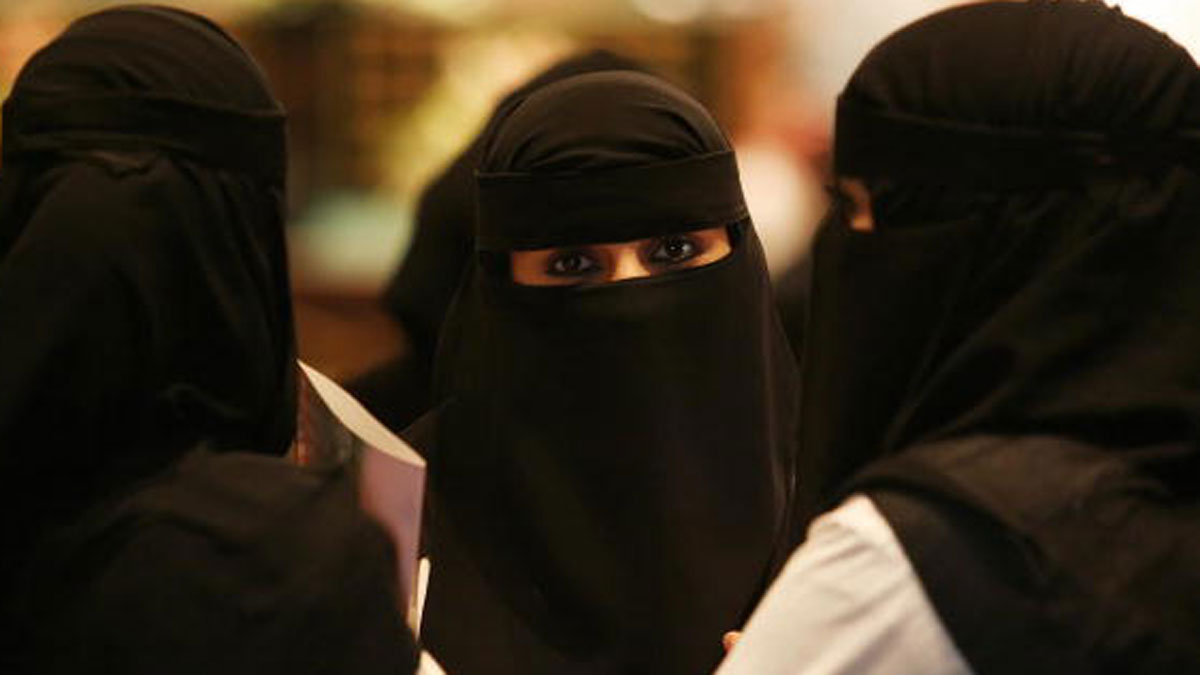
A surprising set of social reforms have granted women freedoms previously prohibited under Saudi Arabia’s strictly enforced Islamic law.
Saudi Arabia Uncovered: ITV series exposes brutal regime Suffragettes of Saudi Arabia: the women making history Eight things women are banned from wearing around the world
Under the leadership of Crown Prince Mohammed bin Salman, women have had the right to get their own passports, as well as travel abroad and live independently without the permission of a male guardian, or “wali”.
The changes are part of the crown prince’s plan to modernise the Middle Eastern country. The reforms, alongside his diversification strategy, known as Vision 2030 , would help Saudi Arabia to “eradicate the remnants of extremism” and embrace a more “moderate” version of Islamic law under his leadership, he said in 2017. A year later, a change in regulations meant women could drive for the first time in the kingdom.
Subscribe to The Week
Escape your echo chamber. Get the facts behind the news, plus analysis from multiple perspectives.

Sign up for The Week's Free Newsletters
From our morning news briefing to a weekly Good News Newsletter, get the best of The Week delivered directly to your inbox.
However, the country remains incredibly prohibitive on what women can and cannot do. Although women can now undertake the pilgrimage to Mecca without a male guardian – which one woman told Voice of America was a “miracle” – they can only do so as part of a group. A male relative is still required to give permission for a woman to marry, start certain types of business, leave prison or leave a domestic abuse shelter.
Critics say that the reforms amount to little more than “propaganda”. Duaa Dhainy, a researcher at the European-Saudi Organisation for Human Rights, said the reforms “don’t impact the human rights situation in a meaningful way”, Deutsche Welle reported.
Despite “some changes” there has been “no real difference” to the country’s stance on freedom of opinion, Dhainy continued. Saudi Arabia remains in the ten lowest-ranked countries on the World Economic Forum’s 2021 Global Gender Gap report .
Several women’s rights activists have been imprisoned in recent years, with some facing restricted freedoms even after their release. The New York Times ’ Cairo Bureau Chief Vivian Yee also noted that “it still falls to women in many households to negotiate their freedoms” with male relatives.
Here are some of the restrictions women face in Saudi Arabia:
Dress codes
The dress code for women is enforced to varying degrees across Saudi Arabia. Women are required to dress modestly, and this means tight-fitting clothing and see-through materials are generally prohibited. Wearing heavy make-up is generally considered inappropriate.
Traditionally, the abaya – a long, loose garment that typically has a black headscarf or niqab which was the norm through much of the 20th century – is worn over a woman’s clothing when in public. However, in 2018 the crown prince somewhat relaxed the dress code, and said women did not have to wear an abaya in public.
While some conservative Saudis still opt for a black abaya, in cities many are now “opting for conservative but creative alternatives: sporty jumpsuits, business-cut robes and even kimonos”, The Wall Street Journal reported.
Changes in both attitudes and enforcement have come about since 2016, “when King Salman stripped the religious police of arrest powers, removing the enforcers of the Saudi dress code”, the newspaper continued.
Interaction with men
Saudi Arabia is considered one of the world’s most gender-segregated countries. In recent history, this has meant women faced limits on the amount of time spent with men to whom they are not related, while public transport, parks, and beaches across most of the country also had strict gender-based rules.
Unlawful mixing as previously led to criminal charges being brought against both parties, but women have typically faced harsher punishment.
In December 2019, restaurants were no longer required to have separate entrances for men and women, and some ceased to enforce segregation.
While gender segregation in the workplace has not been a legal requirement since 2005, many employers continue to separate the sexes “to balance the conservative values of a majority-male workforce with the country’s apparent desire to get more women into work”, The Guardian reported.
One company, however, has opted for a gender-based approach to employment in order to empower women. In 2021, supermarket chain LuLu opened its first shop with an all-women staff in Jeddah. General Manager Maha Mohammed Alqarni said it was a “great honour” to “represent the growing community of Saudi women who are supporting the progress of the country’s economic activities”.
Choosing to have an abortion
A male guardian’s approval is still required in order for a woman to seek a legal abortion in Saudi Arabia. The law permits abortion only on the basis of health or therapeutic grounds, according to the Center for Reproductive Rights .
The country was one of 32, including the US, Belarus and Hungary, to sign the Geneva Consensus Declaration in 2020, which states that “there is no international right to abortion, nor any international obligation on the part of states to finance or facilitate abortion.”
An online resource for expats notes many living in the kingdom will return to their home country in order to terminate a pregnancy.
Restrictions on family life
There is no family law in Saudi Arabia, and as a result domestic relations such as marriage and divorce are largely governed by sharia law.
Women require the permission of a male guardian in order to marry, and divorce can also be a more complicated process for women than men. Until 2019, there was no regulation in place to stop Saudi women from being divorced without their knowledge, which meant they could be left unaware of their alimony rights.
Although the crown prince “appears committed to his social agenda”, The New York Times’s Yee stressed that “the gulf between strict and tolerant families can be vast”. With so many women’s rights dependent on a male guardian’s permission, and even with the string of social reforms seen in the past two years, the situation for women in Saudi Arabia remains prohibitive.
Sign up for Today's Best Articles in your inbox
A free daily email with the biggest news stories of the day – and the best features from TheWeek.com

A helping hand, a rare dolphin and more
By Anahi Valenzuela, The Week US Published 30 August 24

Cartoons Friday's cartoons - seasoned vets, football season, and more
By The Week US Published 30 August 24

Today's Newspapers A roundup of the headlines from the US front pages
By The Week Staff Published 30 August 24
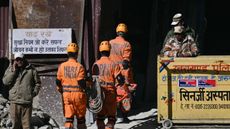
Speed Read Workers trapped in collapsed tunnel are suffering from dysentery and anxiety over their rescue
By Sorcha Bradley, The Week UK Published 22 November 23

Speed Read Nobody wants to take responsibility for the deadly explosion in the courtyard of Gaza's al-Ahli Hospital. Roll the tape.
By Peter Weber, The Week US Published 19 October 23

Tall Tales And other stories from the stranger side of life
By Chas Newkey-Burden, The Week UK Published 6 October 23

By Chas Newkey-Burden, The Week UK Published 4 October 23

By Chas Newkey-Burden, The Week UK Published 3 October 23

By Chas Newkey-Burden, The Week UK Published 2 October 23

By Chas Newkey-Burden, The Week UK Published 29 September 23

It wasn't all bad Good news stories from the past seven days
By The Week Staff Published 28 September 23
- Contact Future's experts
- Terms and Conditions
- Privacy Policy
- Cookie Policy
- Advertise With Us
The Week is part of Future plc, an international media group and leading digital publisher. Visit our corporate site . © Future US, Inc. Full 7th Floor, 130 West 42nd Street, New York, NY 10036.
Saudi Arabia: Women's Expedition
12 days | discover a unique perspective of saudi arabia on a women’s-only expedition.

On this women-only adventure around Saudia Arabia’s dramatic landscapes and UNESCO World Heritage sites, you’ll spend 12 days learning about the country’s deep history, sampling the local cuisine and getting to know the local women. With a desire to tell their own story, they will introduce you to the world of the diverse and severely underrepresented women of Saudi Arabia. Tour a citrus farm with sisters who transformed their father’s vision into a multigenerational business, take a cooking class and pottery workshop, get to know the Holy City of Madinah with a local female guide, cruise and snorkel the Red Sea and meet Saudi Arabia’s first-ever female guide in Jeddah.
Trip overview
- Tour a local, family-owned citrus farm with the sisters who run it, explore Wadi Disah (Valley of Palm Trees) and see Alula’s remarkable rock formations with giant tombs from the Nabatean era.
- Visit Madinah – the second holiest site in Islam, after Mecca – with a local female guide. Enjoy a Saudi-style picnic of local bread and peppermint tea with views over the Holy City.
- Take a bullet train to Jeddah’s Al Balad – a UNESCO World Heritage site – and meet with Saudi’s first female guide Abir. Wander the narrow streets, meet friendly vendors and sample local delicacies.
- Cruise the Red Sea on a boat on your final day – snorkel, swim and end it all on a private women-only beach for sunset.
- This trip is designed to support local women and entrepreneurs, so you’ll join a cooking class with a local chef, meet with a pottery artist, get pampered at a women-owned salon, join a host family for a home-cooked meal and stay in a female-owned boutique hotel.
- Saudi Arabia's tourism industry is still in its infancy, and there are some challenges to overcome, like a lack of infrastructure in some locations, reliable systems and trained guides. Sites are occasionally closed with little or no notice and restoration work is common. You’ll need to have a degree of flexibility when travelling here.
- Hotel standards and service levels vary across the country and may differ from what you’ve experienced elsewhere. Locals are new to international tourism, so please have an open mind and heart.
- The country has strict laws and customs that visitors should be aware of before travelling, such as dress codes. Alcohol is also banned. Please see the Essential Trip Information for more detail.
- Saudi Arabia is large country and we cover we cover a lot on this itinerary. Be prepared for some longer travel days where lunch stops will be simple and limited. Our vehicle is comfortable and we've broken these up with free time in key locations to allow you rest and recharge.
Salam! Welcome to Riyadh – the birthplace of modern Saudi Arabia. Once a walled, mud-brick way along desert trading routes, this capital is now a contemporary metropolis with more than 4000 mosques, busy shopping centres, palaces, museums and traditional souks. When you arrive at Riyadh International Airport, you’ll be met by an Intrepid representative and transferred to your hotel, ready for your adventure to begin at 6 pm tonight with a welcome meeting. Get to know your local leader – women are making significant contributions to the tourism sector here and represent around 30% of the workforce – over a traditional Saudi meal in a local heritage restaurant. Saudi Arabian cuisine blends traditional Arabian and Middle Eastern cuisine with influences from Africa and South Asia. You’ll sample local breads, fresh salads, sambosas (a triangle pastry often filled with beef, onions and spices), taheena and kasba (a mixed rice dish).
- Hotel (1 night)
- Riyadh – Traditional Saudi Dinner
- Riyadh – Complimentary Airport arrival transfer
- Riyadh – Kingdom Tower - USD19
It’s very important that you attend the welcome meeting as we will be collecting insurance details and next of kin information at this time. If you are going to be late, please let your travel agent or hotel reception know. Ask reception or look for a note in the lobby for more information on where the meeting will take place.
Your travel time today will be approximately 1 hour.
After breakfast, visit Diriyah – the birthplace of the first Saudi state. The district of At-Turaif is a UNESCO World Heritage Site and is known for its well-preserved adobe structures that showcase the Najdi architectural style. It was the first capital of the Saudi dynasty and holds great cultural and historical importance. You’ll find out how the mud-brick houses were built, how homes were cooled during the hot summer days and how people lived without electricity. Meet with a host family of women and enjoy a home-cooked traditional meal here for lunch. Get to know the Saudi culture through eating and cooking with the families, then head to Souq Al-Zal – one of the oldest markets in town. This afternoon, you’ll meet Ghada, a local artist and psychologist, at her pottery workshop. She’ll introduce you to the colours and patterns that Saudis are known for, like the Najdi style and the Aseeri style.
- Riyadh – Pottery workshop visit with female artist
- Riyadh - Traditional Home cooked meal with female hosts
- Diriyah – UNESCO Site
- Riyadh - Souq Al-Zal Market visit
- Riyadh - National museum - Free
- Riyadh - Al Masmak Fortress - Free
If shopping isn’t your thing, you can visit the Al Masmak Fortress instead of the market.
Make your way to Unayzah this morning, stopping in Ushaiger along the way. Explore the heritage village and see a glimpse of a traditional, slow-paced Saudi society. Bedouins first settled here 1500 years ago and Ushaiger quickly became a popular stopping point for pilgrims crossing to Makkah, thanks to its springs and low olive and palm groves. Continue to Buraydah, where you’ll roll up your sleeves with a local chef and learn some of the traditional dishes the Najd area is famous for. Influenced by the region’s topography and desert climates, Najd dishes are hearty and wholesome – think rich stews, wheat and rice dishes with fragrant spices. After enjoying the fruits of your labour for lunch, you’ll be treated to some coffee and Kleija for dessert – these biscuits hail from the date-rich province of Qassim and are filled with date paste or nut-sugar. Spend the night in a traditional home built in the local Quasimi architectural style. Converted into comfortable accommodation, your home for the night is on a working farm, among the gardens and date palms.
- Heritage Hotel (1 night)
- Ushaiger - Heritage Village
- Buraydah - Cooking class with female chef
Your travel time today will be approximately 4 hours.
Today starts with a visit to Unaizah to explore one of the oldest markets in Najd. Here, you’ll find lots of varied shops and folk crafts, and if you’re lucky, you’ll see one of the traditional weekly performances. This is the perfect place to buy an abaya (as a foreigner, the use of an abaya is completely optional, but you’ll need one for your visit to Madinah). On the way to Hail, you’ll stop at Buraydah – home to the world’s largest date market. Known as the Date City, this is where farmers from all over the region come for the seasonal market in August and September. The region has more than 7 million date palm trees, which is the highest concentration among all regions in Saudi Arabia. Learn why dates are a cornerstone of Saudi culture and why they’re considered one of the best gifts one can give. Carry on to Hail, where you’ll have a free afternoon to rest and relax.
- Buraydah - Date market
- Unaizah – Al Musoawkaf Traditional market
- Hail - Visit A'arif Fort - Free
Your travel time today will be approximately 3 hours.
Today you’ll have the opportunity to rest and recharge with a free day in Hail. Hail used to be the capital of the entire Arabian Desert and was a frequent stop for those travelling to Mecca from the north. If you like, you can take an optional half-day tour to Jubbah – a UNESCO World Heritage Site, Jubbah hosts two of the most emblematic carvings in Saudi Arabia. The petroglyphs, dating back 10,000 years, feature hunting parties, lions, horses and camels. After soaking in some local history on the tour, you’ll head into the Nufud desert for a desert picnic. Alternatively, you can head to the Hail Souq and pick up your own fruits, vegetables and dates. The souq also features handmade crafts such as clay pots and handwoven mats. You might also like to see the Hail Flea Markets – one of Saudi’s last real flea markets, primarily run by women selling handmade crafts and traditional attire. Tonight, meet back up with your group and head to a female-owned, female-only salon for a spot of pampering. Chat to the locals and learn how these types of businesses have created enterprise opportunity for the women who live here.
- Hail - Female only Salon visit
- Hail - Jubbah Rock art and Saudi Desert Picnic (price per group up to 12) - USD400
- Hail - Souk & Flea Market - Free
- Hail - Al Mutlaq Heritage Mosque - Free
Today is a long travel day as you head to your next stop in Alula. Home to Saudi Arabia’s first UNESCO World Heritage Site, Alula sits deep in the desert. The natural rock formations and canyons here feature pre-Islamic rock art and immaculately preserved tombs, built more than 2000 years ago by the Nabataeans. When you arrive, you’ll head to Elephant Rock for sunset. The rock (also known as Jabal Alfil) was carved by millions of years of wind and water erosion and now stands 52 m high – now one of Alula’s most impressive geological structures. As dusk falls, there will be food trucks, and music, so you can hang out on the deck chairs and enjoy the view! After, head to the Old Town and explore Old Market Street’s many local artisans, handicraft stores and restaurants. Visit a modern abaya shop to learn how this staple piece has evolved and how many Saudi women still choose to wear it, even since it became optional in 2018.
- Desert Lodge (1 night)
- Alula - Historical Old town and Al Jadidah Area
- Alula – Elephant Rock (Jabal AlFil)
- Alula – Abeya shop
Your travel time today will be approximately 6 hours.
Start the day early with a sunrise visit to the Nabataean site of Hegra. This was the southern capital of the Nabataean kingdom, dating back to the first century BCE, and extended as far as Petra in present-day Jordan. Tours here are guided by a local rawee (storytellers), who are predominantly women. You’ll explore several of the 100 well-preserved monumental tombs, most with elaborate facades carved from rocks scattered around the desert. The smallest tomb is only 2.7 m tall, but the largest is 21.5 m! Later, head to a local family-owned citrus farm. Tour the farm with the Al Joud family and learn more about their local produce and how they turned their father’s labour of love into a multi-generational business. Sample the local produce before sitting down under the trees for a farm-to-table lunch prepared by the sisters. This afternoon is free for you to explore at your own pace. Maybe head up the mountain to the Harrat Viewpoint or visit the town for sunset, where you can see Hegra in the distance.
- Alula - Citrus Farm Tour & Lunch
- Alula - Madain Saleh (Hegra) Tour with local guide
- Alula - Harra View point (transport cost per group of 4) - USD66
The Hegra tour’s departure time is assigned by the Alula Authority. Tours are guided by local guides and we will be joined by other travellers. Your leader will update you if there are any changes to the morning timeslot.
Jump into 4WDs this morning and head out on a daytrip to Wadi Disah – one of Saudi Arabia’s most popular natural attractions. Loosely translated as the Valley of the Palm Trees, this valley is made up of rocky mountainous peaks, freshwater springs and palm trees, creating an oasis in the middle of the desert. This site has been inhabited for centuries and is well known for its dates and mangos. On your off-road adventure, you’ll descend into the valley through the lush vegetation and rushing stream, which winds its way between the towering rock walls. Lunch is a traditional, Bedouin-style meal among the palms. Then, you’ll take a walk and explore part of Wadi Disah’s 15 km-long canyon. Soak in the dramatic scenery of the unique landscape before heading back to your hotel for the night.
- Dissah Valley - 4x4 Excursion and bedouin style picnic
This morning, travel through the desert and mountains along an ancient pilgrimage route to Madinah. This volcanic area is rich with black lava stone, mountain landscapes and religious history. Stop at the terminus station of the Hijaz (or Ottoman railway), which once brought pilgrims to Madinah from as far away as Damascus in Syria, then arrive in one of the two holiest cities in Islam. In the centre of the city sits Al Masjid an Nabawi (the Prophet’s Mosque) – a 10-minaret giant that can accommodate one million people. Meet with a local female guide and join the masses of pilgrims in the heart of the city. Have lunch in one of the local markets, then visit the outskirts of the mosque. Later, you’ll have time to explore the next-door museum dedicated to the life of Prophet Muhammad. One of the 25 pavilions is dedicated to the history of women in Islam and is a dedicated space for women to engage in spiritual discussion and reflection. At sunset, head to a viewpoint across the Holy City and enjoy a picnic of local bread and duggah (spice) with tea and peppermint.
- Madinah - City Tour & Dar Al Madinah Museum with local female guide
- Madinah - Sunset Saudi Picnic with female local guide
- Madinah - Market visit & lunch
- Madinah - Hijaz Railway Terminus Station
You will be required to wear an abaya and head scarf while in the holy city of Madinah.
This morning you’ll hop on one of Saudi Arabia’s state-of-the-art high-speed trains for the journey along the Haramain High Speed Railway to the coastal city of Jeddah. This commercial hub sits on the Red Sea and is home to the second busiest seaport in the Middle East. The main gateway to Mecca (the holiest city in Islam), Jeddah sees up to two million pilgrims a year on their way to perform the Hajj. Jeddah is known as the most liberal city in Saudi Arabia and is a popular spot for visitors. When you arrive, you have a free afternoon to cool off in the hotel’s pool or explore the city. Tonight, head to Al Balad (named by the locals, this means ‘the town,’ referencing the base of Jeddah). Take a tour of this UNESCO World Heritage Site with the country’s first female guide and learn the history of these buildings and Abir’s story. Sample a few local delicacies, like sobia (a local drink made of bread) or beans and pickles from the local vendors, then continue to explore on your own.
- Boutique Hotel (1 night)
- Al Balad - UNESCO Heritage walking tour with female guide
Your travel time today will be approximately 2 hours.
The train has bathrooms, power outlets and a dining car. Large bags and suitcases must be carried onboard and stored at the end of each carriage. There is a baggage limit of 25 kg per bag.
Abir (the local guide in Jeddah) holds a unique and coveted role within the Department of Tourism, meaning sometimes, she’s called away. In this instance, she will be replaced by another local female guide, all of whom were trained by Abir.
Hop on a private boat today and soak up the sunshine on the Red Sea. Go snorkelling (gear provided) and find out why this region is known for its underwater sea life – you’ll see the many varieties of colourful corals and tropical fish. The temperature of the water never drops below 21 degrees Celsius here, and the high salinity of the water is known to be beneficial for your health! This afternoon, toast to an incredible trip with some snacks and refreshments on the boat. End the day on a private women-only beach. Chill out on the sand, listen to the local music with a mocktail and watch the sunset over the Red Sea. Later, why not gather your group for a final dinner and continue the celebration of an amazing journey.
- Jeddah - Ladies only beach
- Jeddah - Red Sea Boat & Snorkelling trip
With no further activities planned, your trip comes to an end in Jeddah this morning after breakfast. If you’d like to extend your stay, just speak to your booking agent ahead of time.
11 breakfasts, 4 lunches, 1 dinner
Private vehicle, High-Speed Train, Boat, 4x4 Jeep
Hotel (5 nights), Heritage Hotel (1 night), Desert Camp (3 nights), Boutique Hotel (2nts)
Dates and availability
Important notes.
1. A single supplement is available if you’d prefer not to share a room on this trip. The single supplement applies to all nights on your trip and is subject to availability. Please speak to your booking agent for further information. 2. A complimentary airport arrival transfer is included; valid if you are arriving on Day 1 or if you have booked pre-tour accommodation through us. You must provide your flight details to your booking agent at least 14 days prior to travel. 3. Checked in luggage on the high speed train from Madinah to Jeddah is restricted to 1 x 25kg bag.
Want an in-depth insight into this trip? Essential Trip Information provides a detailed itinerary, visa info, how to get to your hotel, what's included - pretty much everything you need to know about this adventure and more.
Check back later or explore reviews for similar trips.
We need your support today
Independent journalism is more important than ever. Vox is here to explain this unprecedented election cycle and help you understand the larger stakes. We will break down where the candidates stand on major issues, from economic policy to immigration, foreign policy, criminal justice, and abortion. We’ll answer your biggest questions, and we’ll explain what matters — and why. This timely and essential task, however, is expensive to produce.
We rely on readers like you to fund our journalism. Will you support our work and become a Vox Member today?
- World Politics
Saudi Arabia changed its guardianship laws, but activists who fought them remain imprisoned
Saudi women can now travel without the permission of a male guardian and now have employment discrimination protections.
by Anya van Wagtendonk

Saudi Arabia’s Council of Ministers approved a royal decree this week put forth by Crown Prince Mohammed bin Salman that would loosen some of the restrictions placed on women through the kingdom’s network of so-called “guardianship laws,” a move critics say is too little, too late.
The decree marks the most significant changes to date of Saudi Arabia’s wilayah, or guardianship, system — a network of regulations on the movements and behavior of women that required them to seek the permission or accompaniment of a close male relative in matters of work, leisure, finances, law, and health.
The new law permits unprecedented mobility to women, including the right to obtain a passport and travel abroad without a male relative’s permission. Any Saudi over 21 — regardless of gender — will now be able to obtain, renew, and use a passport.
It also extends to the workplace and the home. Women will now receive standard employment discrimination protections. They now also have the right to register the births of their children, live apart from their husbands, and obtain family records. And along with her husband, a woman can also now register as a co-head of household.
On Twitter, Princess Reema bint Bandar, Saudi Arabia’s ambassador to the United States, called these new laws “history in the making.”
“I am elated to confirm that KSA [the Kingdom of Saudi Arabia] will be enacting amendments to its labor and civil laws that are designed to elevate the status of Saudi women within our society,” she wrote, “Including granting them the right to apply for passports and travel independently.”
The new laws are expected to go into effect at the end of August, according to the Wall Street Journal , which added that widespread change may be slow to be implemented given that many aspects of the guardianship system are upheld as much by custom as by law.
And the decree does not end the system completely. Guardianship rules will continue to govern many other aspects of a woman’s life, including marriage and exiting prison. The same Wall Street Journal article points out that a woman must still seek a male guardian’s permission to enter a domestic violence shelter.
And some elements of implementation will need to be worked out, Adam Coogle, a Middle East researcher at Human Rights Watch, told the LA Times . For example, the new law that says a woman does not have to live with her husband could come into conflict with his legal right to file a claim of “disobedience” against her.
“So how will this work?” Coogle asked. “Will the judge cite this change to the civil status law and say you have no right to demand this, or base his judgment on sharia law, where a woman has to obey her husband?”
The guardianship system has received increased attention in recent years, particularly as a large number of women have fled the country and applied for asylum elsewhere. Many have cited the restrictive guardianship system as their reason for leaving.
Inside the kingdom, as women’s rights activists have called for changes, many have been imprisoned, and some have allegedly been tortured. One such activist, Loujain al-Hathloul, was imprisoned on the eve of a heralded change to Saudi Arabia’s restrictions on women driving . She remains in prison where she is facing treason charges and has allegedly been tortured by a top lieutenant to bin Salman.
Human rights activists cautiously praised the changes while calling for activists like al-Hathloul to be released.
“Saudi Arabia’s long overdue legal reforms should provide Saudi women a much greater degree of control over their lives,” Rothna Begum, a senior women’s rights researcher at Human Rights Watch, said in a statement . “But this is a bittersweet victory as courageous Saudi women who pushed for these changes remain behind bars or face unfair trials.”
Human Rights Watch also notes that, despite widespread reporting that the new law lifts all restrictions on women’s rights to leave the country, a government-run mobile app for accessing Interior Ministry services, including travel documentation and visas, still offers men the option of declining travel for female dependents.
“This should be the beginning of the end of the notorious male guardianship system and the authorities should promptly dismantle the rest of it,” Begum’s statement went on to say.
Critics believe bin Salman wants to distract from human rights abuses at home and abroad
This is not the first move by Crown Prince Mohammed bin Salman to loosen the guardianship laws. Last year, he lifted a ban on women driving and another on certain forms of gender mixing, which permitted women to attend a soccer match for the first time.
And in April 2017, he ordered government agencies not to deny government services to women who did not have a male guardian’s consent “unless existing regulations require it,” according to Human Rights Watch . That order did not change regulations on women’s ability to get a passport or travel abroad — two rights now granted to women under the new decree.
The prince is young (33 years old), is often referred to by his initials (MBS), and has repeatedly signaled a desire to be seen as an upstart and a reformer. That campaign has worked in some corners of the media, as Vox’s Zack Beauchamp has described :
60 Minutes hailed him as a “revolutionary” who is “emancipating women” in Saudi Arabia. CNBC ran a piece with the headline “Mohammed bin Salman is bringing Silicon Valley-style disruption to Saudi Arabia.” On Wednesday, the prince had dinner with Morgan Freeman, director James Cameron, and The Rock, who wrote an Instagram post lavishing praise on the autocrat. “A pleasure to have a private dinner with the Crown Prince of Saudi Arabia, Mohammed bin Salman,” The Rock wrote. “Fascinating experience to hear his deep rooted, yet modern views on the world and certainly the positive growth he desires for his country.”
But bin Salman has also overseen a widespread crackdown on dissidents , including anti-guardianship activists. In April, his government detained eight people — among them, two US citizens and a pregnant woman — because of their activism on behalf of women’s rights. Recent reports have revealed a campaign to surveil and silence his critics using tactics like forced repatriation, imprisonment, torture, and executions.
And bin Salman is also implicated in the “ extrajudicial killing ” of Jamal Khashoggi, a Saudi journalist who wrote, often critically, about the Gulf kingdom for the Washington Post. In October 2018, Khashoggi was detained, murdered, and dismembered inside the Saudi consulate in Istanbul, Turkey. According to a 100-page report from the United Nations, “credible evidence” exists linking the crown prince himself to Khashoggi’s brutal murder.
“Every expert consulted finds it inconceivable that an operation of this scale could be implemented without the crown prince being aware, at a minimum, that some sort of mission of a criminal nature, directed at Mr. Khashoggi, was being launched,” the UN report states. And the CIA’s investigation into the killing found “with high confidence” bin Salman was not just aware of the murder, but that he personally ordered it.
The crown prince has also overseen his country’s war in Yemen which has led to an ever-worsening humanitarian crisis that, according to the UN, has left 10 million people “one step away from famine,” 10 million more without regular access to food, and over 200,000 people dead .
While bin Salman’s latest reforms to the wilayah system have been greeted with open arms, they do not take away from the conspicuous and insidious forms of repression that remain in his kingdom, from international accusations that he is behind the brutal murder of a journalist, or from his role in Yemen’s crisis. The crown prince’s newest decree did not free any political prisoners; and given women who flouted the driving ban remained in custody following its repeal, it is unlikely the new laws will lead to freedom for the very activists who have been calling for these changes from the beginning.
This has led some experts, like Saudi anthropologist Madawi Al-Rasheed, to suggest the crown prince is looking for good publicity in the face of bad press, particularly around women fleeing Saudi Arabia to seek asylum elsewhere.
“Mohammed bin Salman is desperate to improve the world’s view of the country,” Al-Rasheed told the New York Times ; Omaima Al-Najjar, a Saudi activist living in Italy, called changes to the guardianship system “bread crumbs,” and said activists will not be satisfied with the new rules alone: “The demand for equal rights is ongoing until all rights are given.”
Most Popular
- Georgia’s MAGA elections board is laying the groundwork for an actual stolen election
- Zelenskyy’s new plan to end the war, explained
- Your guide to the Brittany Mahomes-Donald Trump drama, such as it is
- What the heck is “corn sweat” and is it making the Midwest more dangerous?
- Kids Today: Your guide to the confusing, exciting, and utterly new world of Gen Alpha
Today, Explained
Understand the world with a daily explainer plus the most compelling stories of the day.
This is the title for the native ad
More in World Politics

The plan is short on detail but aims to push Russia to negotiate.

By invading Russia, Ukraine was also sending a message to America.

Canadian railways locked out union workers Thursday after months of contract disputes.

Denying them a spot risks fracturing an already fragile coalition.

A ceasefire between Israel and Hamas seems as far off as ever.

India has systemic problems with sexual violence.
You are using an outdated browser. Upgrade your browser today or install Google Chrome Frame to better experience this site.
- Section 10 - Egypt
- Section 10 - South Africa
Saudi Arabia: Hajj & Umrah Pilgrimages
Cdc yellow book 2024.
Author(s): Salim Parker, Joanna Gaines
Destination Overview
Infectious disease risks, environmental hazards & risks, other health considerations, safety & security, availability & quality of medical care.
Hajj and Umrah are religious pilgrimages to Mecca, Saudi Arabia. Islamic religious doctrine dictates that every able-bodied adult Muslim who can afford to do so is obligated to make Hajj at least once in their lifetime. Hajj takes place from the 8th through the 12th day of the last month of the Islamic year (Dhul Hijjah). The timing of Hajj is based on the Islamic lunar calendar; its dates shift relative to the Gregorian calendar, occurring ≈11 days earlier each successive year. In 2021, for example, Hajj took place from July 17–22, but in 2022, Hajj occurred from July 7–12. Muslims can perform Umrah, the “minor pilgrimage,” any time of the year; unlike Hajj, Umrah is not compulsory.
Normally, ≈2–3 million Muslims from >183 countries perform Hajj each year, and the Kingdom of Saudi Arabia (KSA) continues its efforts to allow an even greater number of pilgrims (hajjis) attend. In a typical year, >11,000 pilgrims travel from the United States. Due to the coronavirus disease 2019 (COVID-19) pandemic, however, only 1,000 pilgrims received permission to perform Hajj in 2020. In 2021, 60,000 were allowed, and in 2022, 1 million pilgrims made the pilgrimage. In both 2020 and 2021, because no cross-border entry into the country was permitted, KSA limited Hajj pilgrims to residents of Saudi Arabia.
Performing the Pilgrimage
Most international pilgrims fly into Jeddah or Medina and take a bus to Mecca. Although the actual pilgrimage lasts only 5 days, most foreign pilgrims visit Saudi Arabia for 2–7 weeks.
On the first day of Hajj (8th day of Dhul Hijjah), hajjis travel by foot or by bus ≈5.5 miles (9 km) to Mina, the largest temporary city in the world, where most stay in air-conditioned tents.
At dawn on the 9th day of Dhul Hijjah, hajjis begin an ≈7.75-mile (12.5-km) trip by foot, shuttle bus, or train to the Plain of Arafat ( Map 10-03 [all distances shown are approximate]). During the summer months, daytime temperatures can reach 122°F (50°C). The walking route features mist sprinklers, but the risk for heat-related illnesses is high, and ambulances and medical stations are positioned along the way to provide medical assistance.
Hajj climaxes on the Plain of Arafat, a few miles east of Mecca. Pilgrims spend the day in supplication, praying and reading the Quran. Being on Arafat on the 9th of Dhul Hijjah, even for only a few moments, is an absolute rite of Hajj. Any hajji who fails to reach the Plain of Arafat on that day must repeat their pilgrimage. After sunset, pilgrims begin the ≈6.5-mile (10.5-km) journey to Muzdalifah, where most sleep in the open air. Potential health threats in Muzdalifah include breathing the thick dust and inadequate or overcrowded washing and sanitation facilities.
At sunrise on the 10th day of Dhul Hijjah, pilgrims collect small pebbles to carry to Jamaraat, the site of multiple deadly crowd crush disasters. At Jamaraat, hajjis throw 7 tiny pebbles at the largest of 3 white pillars—the stoning of the effigy of the Devil. Afterwards, pilgrims traditionally sacrifice an animal. Some purchase vouchers to have licensed abattoirs perform this ritual on their behalf, thereby limiting potential exposure to zoonotic diseases. Other pilgrims visit farms where they sacrifice an animal themselves or have it done by an appointed representative.
The next morning, on the 11th day of Dhul Hijjah, hajjis go to the Grand Mosque, which houses the Ka’aba (“The Cube”), and which Muslims consider the house of God. Pilgrims perform tawaf, 7 complete counterclockwise circuits around the Ka’aba. Because each floor of the 3-level mosque can hold 750,000 people, performing tawaf can take hours. In addition to tawaf, pilgrims have the option of performing sa’i, walking (sometimes running) 7 times between the hills of Safa and Marwah, then drinking water from the Well of Zamzam. Hajjis can travel between Safa and Marwah via air-conditioned tunnels, which have separate sections for walkers and disabled pilgrims. At the end of the day, pilgrims return to Mina (via Jamaraat) pelting all 3 pillars with pebbles.
The next day, the 12th day of Dhul Hijjah, pilgrims pelt all 3 pillars in Mina with pebbles again and then, after performing a final tawaf, some leave Mecca, ending their Hajj. Other pilgrims stay an additional night, pelt the 3 pillars with pebbles once more the next day, perform their final tawaf, and end the pilgrimage. Although not required, some hajjis include a trip to Medina, where they visit the Mosque of the Prophet, home to the tomb of Mohammed.
Map 10-03 Hajj / Umrah pilgrimage
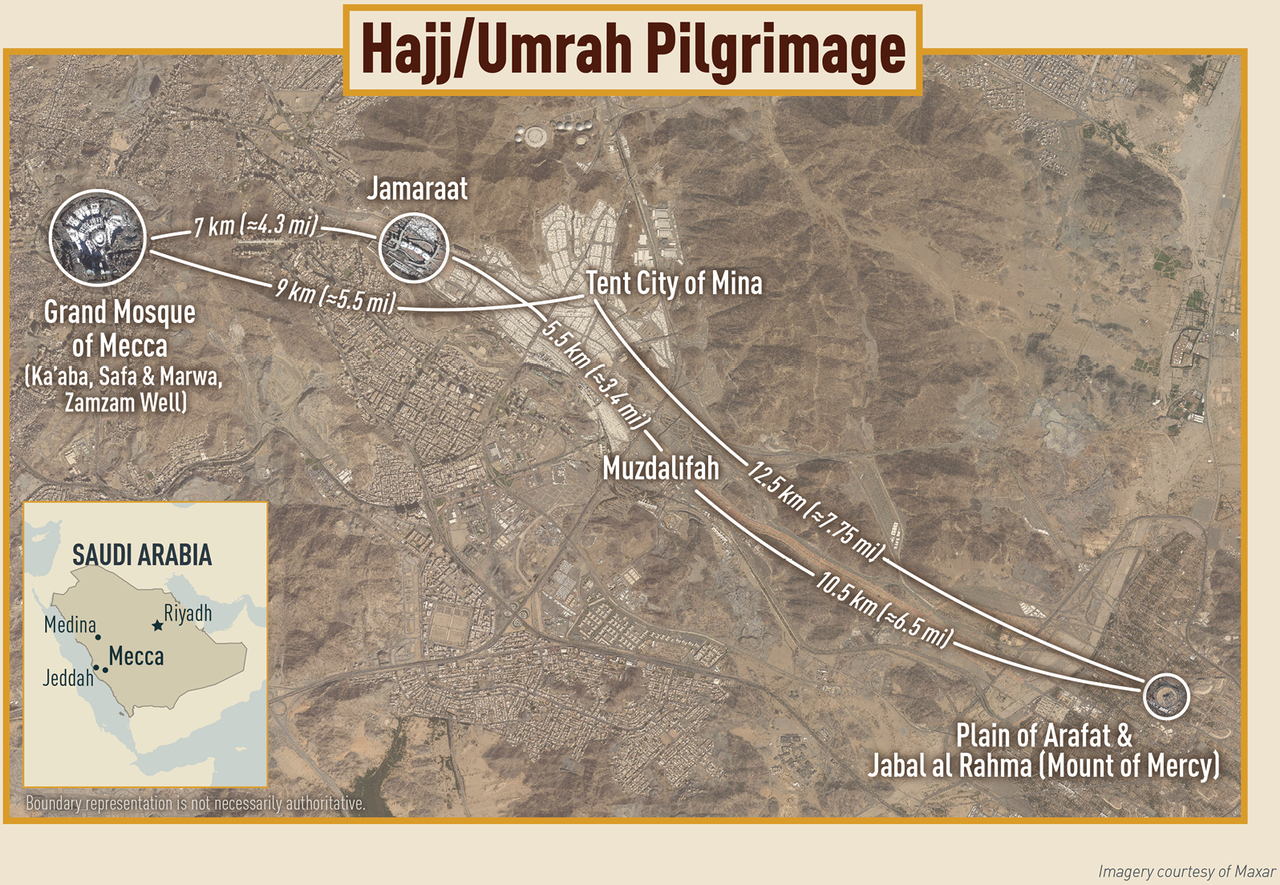
View Larger Figure
KSA can elect to restrict the entry of travelers coming from countries experiencing infectious disease outbreaks. In 2012, for example, KSA did not permit anyone from Uganda to attend Hajj due to an Ebola outbreak in that country; the same restriction applied to Guinea, Liberia, and Sierra Leone in 2014 and 2015.
Required Vaccines
Current Hajj vaccination requirements are available from the Embassy of the Kingdom of Saudi Arabia in the United States. As part of the Hajj and Umrah visa application process, KSA requires proof of vaccination against COVID-19 and meningococcal disease (for all pilgrims), polio (for pilgrims coming from countries where the disease is reported), and yellow fever (for all pilgrims arriving from yellow fever–endemic countries).
Coronavirus Disease 2019
In 2020 and 2021, KSA only permitted Saudi residents <65 years old to apply for pilgrimage permits. In 2022, the Saudi government reopened Hajj to pilgrims (<65 years old) from countries outside KSA. Priority was granted to those who had not previously performed the pilgrimage. For the 2020 Hajj, because COVID-19 vaccines were not yet available, KSA required Hajj pilgrims to have a negative PCR test. In 2021 and 2022, hajjis also had to provide proof of immunization with an approved COVID-19 vaccine. The Kingdom recognizes vaccines produced by Johnson & Johnson, Moderna, Oxford/Astra Zeneca, and Pfizer/BioNTech.
All travelers going to Saudi Arabia should be up to date with their COVID-19 vaccines .
Meningococcal
The Hajj has been associated with meningococcal outbreaks. In 1987, serogroup A was responsible for an outbreak and carriage by returning pilgrims to certain countries that resulted in disease among local contacts. Serogroup W was responsible for similar occurrences in 2000 and 2001.
KSA requires all pilgrims ≥1 year of age to submit a certificate of vaccination with the quadrivalent (ACYW) vaccine against meningitis, issued no more than 3 years (in the case of the polysaccharide vaccine) or 5 years (conjugate vaccine) and no less than 10 days before arrival in KSA. The conjugate vaccine is preferred because it is associated with reduced carriage, unlike the polysaccharide vaccine.
If pregnant women and children travel to the Hajj, they should receive meningococcal vaccination according to licensed indications for pregnancy and age respectively. For more details on meningococcal disease and its prevention, see Meningococcal Disease chapter.
Although KSA’s requirement for polio vaccine does not apply to adult pilgrims from the United States, ensuring full vaccination before travel is best. All pilgrims traveling from countries where polio is reported are required to show proof of vaccination ≤6 weeks prior to departure. KSA also administers a single dose of the oral polio vaccine to pilgrims coming from countries where polio has been reported, this in addition to any polio vaccine the hajji might have received in their country of origin. About 500,000 doses of polio vaccine are given at ports of entry, representing >90% of eligible pilgrims.
Bloodborne Pathogens
After completing Hajj, men shave their heads. KSA limits barber licenses and requires barbers to use only disposable, single-use blades, to limit transmission of bloodborne pathogens between customers. Remind male travelers to patronize only officially licensed barbers whose establishments are clearly marked. The Centers for Disease Control and Prevention (CDC) recommends all travelers to KSA, particularly health care workers or other caretakers participating in Hajj, be up to date with routine immunizations, including hepatitis B vaccine.
Enteric Infections & Diseases
Diarrheal disease is common during Hajj. During the pretravel consultation, inform travelers about prevention, oral rehydration strategies, proper use of antimotility agents, and self-treatment of travelers’ diarrhea (TD) with antibiotics. Most TD in hajjis is bacterial (≤83%), with smaller proportions caused by viruses and parasites. More information on TD can be found in Sec. 2, Ch. 6, Travelers’ Diarrhea .
The World Health Organization recommends that travelers visiting farms, or other areas where animals are present, practice general hygiene measures, including avoiding contact with sick animals and regular handwashing before and after touching animals. Travelers should avoid consuming raw or undercooked animal products, including milk and meat.
Respiratory Infections & Diseases
Respiratory tract infections are common during Hajj, and pneumonia is among the most common causes of hospital admission. The risk for respiratory infections underscores the need to follow recommendations from the Advisory Committee on Immunization Practices for pneumococcal conjugate and polysaccharide vaccines for pilgrims aged ≥65 years and for younger travelers with comorbidities.
Although not a requirement, the CDC strongly recommends that hajjis be fully vaccinated against seasonal influenza. Behavioral interventions, including regular handwashing with soap and water, properly wearing a facemask, cough etiquette, and, if possible, physical distancing and contact avoidance, can help mitigate the risk for respiratory illnesses among pilgrims. Assess travelers for respiratory fitness, administer necessary vaccines, and prescribe adequate supplies of portable respiratory medications (inhalers are easier to transport than nebulizers) as needed.
Crowded conditions, even outdoors (densities can reach 9 pilgrims per square meter), can increase the probability of respiratory disease transmission during Hajj, including COVID-19 and Middle East respiratory syndrome (MERS). At the time of writing, no Hajj-associated cases of COVID-19 or MERS have been reported. Many pilgrims come from areas highly endemic for tuberculosis (TB); some arrive for Hajj with active pulmonary disease. Educate pilgrims about the risk for TB, and instruct them to follow up with their doctor if they develop symptoms of active TB.
Middle East Respiratory Syndrome
MERS, caused by the Middle East respiratory syndrome coronavirus (MERS-CoV), was identified in Saudi Arabia in 2012 (see Sec. 5, Part 2, Ch. 14, Middle East Respiratory Syndrome / MERS ). Domestic cases in and around the Arabian Peninsula and exported cases, including in the United States, have ranged from mild to severe; ≈35% of reported cases have been fatal. Close contact with someone who has confirmed MERS-CoV infection, exposure to camels, and consuming raw or undercooked camel products (e.g., milk, urine, meat) are all considered risk factors for human infection with MERS-CoV.
Skin Infections
Chafing caused by long periods of standing and walking in the heat can lead to bacterial or fungal skin infections. Advise travelers to keep their skin dry, use talcum powder, and to be aware of any pain or irritation caused by garments. Travelers should disinfect open sores and blisters and keep them covered. As a sign of respect, pilgrims enter the Grand Mosque with the tops of their feet uncovered; while most hajjis perform tawaf in their bare feet, encourage travelers with diabetes to wear appropriate, protective footwear.
Vectorborne Diseases
Aedes mosquitoes, vectors for dengue, and Anopheles mosquitoes, vectors for malaria, are present in Saudi Arabia. Travelers should follow mosquito bite prevention measures outlined in Sec. 4, Ch. 6, Mosquitoes, Ticks & Other Arthropods . Dengue has been documented in Mecca and Jeddah, but not in association with Hajj. KSA conducts extensive spraying campaigns before Hajj, and especially targets the housing units of pilgrims from malaria- and dengue-endemic areas. The cities of Jeddah, Mecca, Medina, Riyadh (the capital of KSA), and Ta’if have no malaria transmission, and prophylaxis against malaria is neither recommended nor required for pilgrims.
Animal Bites
Pilgrims bitten by animals should seek immediate medical attention to address any potential rabies exposure (see Sec. 4, Ch. 7, Zoonotic Exposures: Bites, Stings, Scratches & Other Hazards , and Sec. 5, Part 2, Ch. 18, Rabies ).
Climate & Sun Exposure
Heat is a threat to the health and well-being of all travelers; both heat exhaustion and heatstroke can cause incapacitation and death among pilgrims (see Sec. 4. Ch. 2, Extremes of Temperature ). Travelers are particularly at risk when Hajj occurs during summer months; the average high temperatures during June–September are ≥110°F. High temperatures combined with high humidity can lead to a heat index indicative of an extreme heat warning. High heat alone can exacerbate chronic conditions.
Depending on the exact location of their lodgings within Mina and whether they use trains or shuttle buses to get from one location to another, hajjis might walk up to ≈35–40 miles (≈55–65 km) over the 5 days; about 45% of pilgrims walk during the Hajj rituals. Counsel pilgrims to stay well hydrated, wear sunscreen, and seek shade or use umbrellas when possible. Religious leaders have ruled that it is permissible for hajjis to perform some rituals after dark. In addition, except for a pilgrim’s required presence on Arafat on the 9th day of Dhul Hijjah, most other compulsory rituals can be postponed, done by proxy, or redeemed by paying a penalty.
Chronic Health Conditions
Hajj is arduous, even for young, healthy pilgrims. Because many Muslims wait until they are older before performing Hajj, they are more likely to have chronic health conditions. Travelers caught up in the experience of Hajj or Umrah might forget to take their usual medications. People with chronic medical conditions should have a health assessment before traveling to Hajj. Tailor a plan for each traveler’s unique risks, including adjusting the usual medical regimen if necessary, ensuring an adequate supply of medications, and providing education about symptoms that indicate a condition requiring urgent attention.
Pilgrims with diabetes should have a customized management plan that enables them to meet the arduous physical challenges of the Hajj. They should bring adequate amounts of all medications, plus syringes and needles if they are insulin dependent. They also should carry an emergency kit with them on their pilgrimage; the kit should include easily accessible carbohydrate sources, glucagon, a glucometer and test strips, urine ketone sticks to evaluate for ketoacidosis, and a list of medications and care plans. Emphasize the importance of wearing durable and protective footwear to reduce the incidence of minor foot trauma, which can lead to infections.
Menstruation
Muslim law prohibits a person who is menstruating from performing tawaf. All other rituals are independent of menses. Because pilgrims generally know well in advance that they will be making a pilgrimage, those who intend to manipulate their menstrual cycle should consult with a physician 2–3 months before the journey.
Fire is a potential risk during Hajj. In 1997, open stoves set tents on fire, and the resulting blaze killed 343 pilgrims and injured >1,500. In 2015, a hotel caught fire and >1,000 pilgrims were evacuated. KSA no longer allows pilgrims to erect their own lodgings or prepare their own food; permanent fiberglass structures have replaced formerly makeshift accommodations.
Traffic-Related Injuries
As in other countries, motor vehicle crashes are the primary safety risk for US travelers to KSA. Remind Hajj pilgrims of the importance of seatbelt use in any vehicle, including buses (see Sec. 8, Ch. 5, Road & Traffic Safety ). Encourage pilgrims to be mindful of their own safety when they walk long distances through or near dense traffic.
Trauma is a major cause of injury and death during Hajj. Hajj is associated with dense crowding, leading to crush disasters or stampedes. Thousands of pilgrims were killed during a crush at Mina in 2015, making it the deadliest Hajj disaster on record. Death usually results from asphyxiation or head trauma, and large crowds limit the movement of emergency medical services, making prompt rescue and treatment difficult.
Travelers who become ill during Hajj have access to medical facilities located in and around the holy sites. An estimated 25,000 health care workers are typically in attendance, and medical services are offered free of charge to all pilgrims. For safety reasons, KSA advises that children, the frail elderly, seriously ill, and pregnant people postpone Hajj and Umrah.
The following authors contributed to the previous version of this chapter: Salim Parker, Joanna Gaines
Bibliography
Aldossari M, Aljoudi A, Celentano D. Health issues in the Hajj pilgrimage: a literature review. East Mediterr Health J. 2019;25(10):744–9.
Alsafadi H, Goodwin W, Syed A. Diabetes care during Hajj. Clin Med. 2011;11(3):218–21.
Alzahrani AG, Choudhry AJ, Al Mazroa MA, Turkistani AH, Nouman GS, Memish ZA. Pattern of diseases among visitors to Mina health centers during the Hajj season, 1429 H (2008 G). J Infect Public Health. 2012;5(1):22–34.
Assiri A, Al-Tawfiq JA, Al-Rabeeah AA, Al-Rabiah FA, Al-Hajjar S, Al-Barrak A, et al. Epidemiological, demographic, and clinical characteristics of 47 cases of Middle East respiratory syndrome coronavirus disease from Saudi Arabia: a descriptive study. Lancet Infect Dis. 2013;13(9):752–61.
Benkouiten S, Al-Tawfiq JA, Memish ZA, Albarrak A, Gautret P. Clinical respiratory infections and pneumonia during the Hajj pilgrimage: a systematic review. Travel Med Infect Dis. 2019;28:15–26.
Memish ZA. Saudi Arabia has several strategies to care for pilgrims on the Hajj. BMJ. 2011;343:d7731.
Memish ZA. The Hajj: communicable and noncommunicable health hazards and current guidance for pilgrims. Euro Surveill. 2010;15(39):19671.
Memish ZA, Al-Rabeeah AA. Health conditions of travellers to Saudi Arabia for the pilgrimage to Mecca (Hajj and Umra) for 1434 (2013). J Epidemiol Glob Health. 2013;3(2):59–61.
Memish Z, Zumla A, Alhakeem R, Assiri A, Turkestani A, Al Harby KD, et al. Hajj: infectious disease surveillance and control. Lancet. 2014;383(9934):2073–82.
Yezli S. The threat of meningococcal disease during the Hajj and Umrah mass gatherings: a comprehensive review. Travel Med Infect Dis. 2018;24:51–8.
File Formats Help:
- Adobe PDF file
- Microsoft PowerPoint file
- Microsoft Word file
- Microsoft Excel file
- Audio/Video file
- Apple Quicktime file
- RealPlayer file
- Zip Archive file
First women’s title fight in Saudi Arabia an honor and responsibility, Skye Nicolson says

Skye Nicolson and Raven Chapman aren’t the first pro women boxers to compete in Saudi Arabia — that was Ramla Ali’s knockout of Crystal Garcia Nova in 2022 — but Nicolson’s upcoming bout with Chapman will be the first-ever women’s title fight in the kingdom.
Nicolson is scheduled to defend her WBC featherweight belt against Chapman on October 12. Their bout is on the undercard of the Artur Beterbiev-Dmitriy Bivol fight in Saudi Arabia for the undisputed light heavyweight championship.
“I feel so honored to have this privilege and also this responsibility,” Nicolson said in a recent interview with Louis Hart of Boxing Social . “Raven and I have a responsibility on our hands here to put on a show for the fans, to be in a real fight where we showcase that women can fight, that women can be strong and feminine. I feel like it’s a really empowering position to be in, to inspire women as well. I feel very honored to be in this position and to be part of this movement, and hopefully a step in the right direction, hopefully the first of many. Hopefully we can start seeing women’s fights on all of the Riyadh Season cards. While it’s an honor, it’s also a big responsibility on our hands. We are flying the flag for women’s boxing over there and for women, women in sport and just women in general.
“It’s a weight on your shoulders that you’re kind of proud to have,” Nicolson soon added. “I know that I’m a role model. I know that I’m someone that young girls are looking up to. You know that you are being watched all around, from girls in Australia, from girls in the U.K., America, Saudi Arabia, everywhere. I know I have a responsibility and that’s why I do try to, I guess, always represent myself with respect. I’m always trying to inspire that next generation of girls and women that they can do anything they want to achieve.”
Nicolson fought in the 2020/2021 Olympics and then entered the paid ranks in 2022. The 29-year-old from Australia, won the WBC’s interim featherweight belt in her eighth pro fight.
When Amanda Serrano ditched the full WBC title, Nicolson then picked up the vacant belt in April with a wide decision victory over Sarah Mahfoud and defended it in July with a shutout of Dyana Vargas . She is 11-0 (1 KO).
Chapman is 9-0 (2 KOs). The 30-year-old from England is coming off a July shutout of 10-0 Yohana Sarabia.
The Beterbiev-Bivol undercard also features many recognizable names from men’s boxing, including cruiserweight champ Jai Opetaia against Jack Massey; lightweight titleholder Shakur Stevenson against Joe Cordina ; middleweight Chris Eubank Jr. against Kamil Szeremeta; and a rematch between heavyweights Fabio Wardley and Frazer Clarke.
“Being on such a big world stage, especially on this card, this card’s unbelievable,” Nicolson said. “The names that I’m on an undercard with is just like a pinch-me moment in itself. To be on the biggest of world stages, it’s definitely a responsibility, but one that I’m honored to have.”
Follow David Greisman on Twitter @FightingWords2 . His book, “ Fighting Words: The Heart and Heartbreak of Boxing ,” is available on Amazon.
- Artur Beterbiev
- Dmitry Bivol
- Skye Nicolson
- Beterbiev vs Bivol
- Dmitrii Bivol
- Skye Nicolson vs. Raven Chapman
Eddie Hearn: Maciej Sulecki is a 'statement' fight for Diego Pacheco
Johnny fisher-andriy rudenko reorganised for september 28 in london, saul alvarez keeping cards close to his chest in the ‘canelo’ stakes, alexandre gaumont ready to raise the roof against cristian zarate, 'canelo' alvarez takes competing mma card on september 14 as a challenge, efe apochi talks of destroying cheavon clarke; clarke says his actions speak louder, euro news: jacob bank-pavel semjonov set for september 14, anthony joshua understands the danger posed by daniel dubois, unfinished business at hand as louisa hawton targets big fights, jordan panthen aspires to become an american boxing icon, load more stories, vergil ortiz, vergil ortiz jr. on next move: 'i can beat everyone in the division', serhii bohachuk moving on to oleksandr usyk-tyson fury undercard, ‘fighting words’ — revisiting vergil ortiz-serhii bohachuk and settling some misconceptions, serhii bohachuk, terence crawford, xander zayas hails terence crawford as leading junior middleweight, canelo alvarez: i'm not saying terence crawford fight can't happen.

IMAGES
VIDEO
COMMENTS
Women can even travel solo to Saudi Arabia. However, it is important to bear in mind that there is still a broad gender separation throughout the Saudi Arabian society that will influence and determine your travel. For example, there are separate lines for women and children at the airport security checkpoints, and only female security guards ...
Now women aged 21+ can get a passport and travel without one, but many other guardianship rules are still in place. Women weren't allowed to drive cars until 2018, limiting movement and forcing many to spend exorbitantly on taxis. Even now, there aren't enough driving schools to handle the number of female applicants.
1 - As a female, I need a guardian to travel to Saudi and around Saudi. Remember to get travel insurance for Saudi Arabia Saudi Arabia's health care is extremely expensive, so insurance is a must. IATI Insurance offers different plans, for all budgets. Get your 5% exclusive discount if purchasing via this link. No. No. No.
Saudi Arabia has introduced many measures to help women travellers. Women are travelling now more than ever before. In fact, according to a report by RV and Playa, 64 per cent of global travellers identify as female while only 36 % identify as male.Among the ladies on the move, the majority of the vacations are either solo trips or girlfriend getaways, the report states.
Saudi Arabia is extending electronic visas for visitors coming from 49 countries - including the U.S. While wearing the abaya or headscarf is not mandatory anymore, modest clothing that covers ...
The fact is, visiting Saudi Arabia feels a lot like flying back in time to an entirely different universe with modern conveniences but Old World beliefs. I've never experienced anything else like it, and I cannot wait to visit again. For the latest travel news, updates and deals, subscribe to the daily TravelPulse newsletter.
Saudi Arabia is vast — road tripping is the best way to travel the country. Driving in Saudi Arabia was relaxed at times, terrifying at others. Main roads were immaculate, perfect for cruising.
Saudi Arabia has a low crime rate, making it generally safe for solo female travellers. However, cultural differences still exist, so awareness and common sense are key. Be mindful of your surroundings, especially in crowded areas. It's also best to avoid isolated places at night and trust your gut if you feel unsafe.
Women in Saudi Arabia can now travel abroad without a male guardian's permission, royal decrees say. The new rule announced on Friday allows women over the age of 21 to apply for a passport ...
1/8. While Saudi Arabia has long taken steps to keep tourism at bay, all of that changed in late 2019. The mysterious Kingdom decided to open its doors to travelers from 49 countries, including the United Kingdom and the United States, via a new Electronic Visa program. With that announcement, adventure-seekers and culture lovers had the ...
Saudi Arabia uses the Saudi Riyal (SAR). One Riyal is divided into 100 halalas. Saudi has banknotes and coins, although the coins are mostly useless. However, don't be surprised if you end up with a stack of one and two riyal coins (and a bunch of halalas to boot). At the time of writing, 1 riyal is $0.27 or €0.25.
Extra Tips for Visiting Saudi Arabia. 1) Saudia Arabia never sleeps. Saudis are definitely night owls. It's perfectly normal to go shopping at 11 pm and parties tend to start after midnight. It's super safe to wander around at night, even as a woman, and that's not just my opinion but what was I told by local women.
Being a foreign woman traveling in Saudi Arabia can be daunting if you don't know what to expect.The country has a reputation for treating women as second-class citizens who must cover their ...
by Megan Tomos. Published: Mar 11, 2024. Solo travel is a right of passage for all women. Saudi Arabia is a great (and safe) place for women to travel solo. The country has ranked safest among G20 nations, and women are front and centre of Saudi's cultural transformation, with empowering women integral to Vision 2030 plans.
Saudi Arabia's opening to nonreligious tourists in 2019 is a major part of the ongoing shift, as are several important gains that women have been granted over the past half decade, though some ...
January is generally the coolest month of the year, with temperatures around 64-68 Fahrenheit (18-20 degrees Celsius). Winter is the ideal season for enjoying Saudi Arabia's many outdoor ...
When people ask Kami Turky about his travels to Saudi Arabia, he has two pieces of advice: Don't miss traditional food like Kabsa, a mixed rice dish, and Tharid, a lamb and vegetable stew, "which ...
Her work has appeared in Shondaland, Teen Vogue, Travel + Leisure, Harper's Bazaar Arabia, The National UAE, and more. Travel + Leisure Editorial Guidelines Published on October 13, 2019
Call us in Washington, D.C. at 1-888-407-4747 (toll-free in the United States and Canada) or 1-202-501-4444 (from all other countries) from 8:00 a.m. to 8:00 p.m., Eastern Standard Time, Monday through Friday (except U.S. federal holidays). See the State Department's travel website for the Worldwide Caution and Travel Advisories.
Intrepid's approach to exploring Saudi Arabia reflects its commitment to operate trips locally and leave the economic benefits of travel in-destination. This Women's Expedition was created in partnership with Sara Omar - the founder of two travel companies specialising in inbound and outbound tours. Jenny met Sara almost a year ago in the ...
Here are some of the restrictions women face in Saudi Arabia: Dress codes. The dress code for women is enforced to varying degrees across Saudi Arabia. Women are required to dress modestly, and ...
On this women-only adventure around Saudia Arabia's dramatic landscapes and UNESCO World Heritage sites, you'll spend 12 days learning about the country's deep history, sampling the local cuisine and getting to know the local women. With a desire to tell their own story, they will introduce you to the world of the diverse and severely ...
The new law permits unprecedented mobility to women, including the right to obtain a passport and travel abroad without a male relative's permission. Any Saudi over 21 — regardless of gender ...
If pregnant women and children travel to the Hajj, they should receive meningococcal vaccination according to licensed indications for pregnancy and age respectively. ... Saudi Arabia has several strategies to care for pilgrims on the Hajj. BMJ. 2011;343:d7731. Memish ZA. The Hajj: communicable and noncommunicable health hazards and current ...
Skye Nicolson and Raven Chapman aren't the first pro women boxers to compete in Saudi Arabia — that was Ramla Ali's knockout of Crystal Garcia Nova in 2022 — but Nicolson's upcoming bout ...